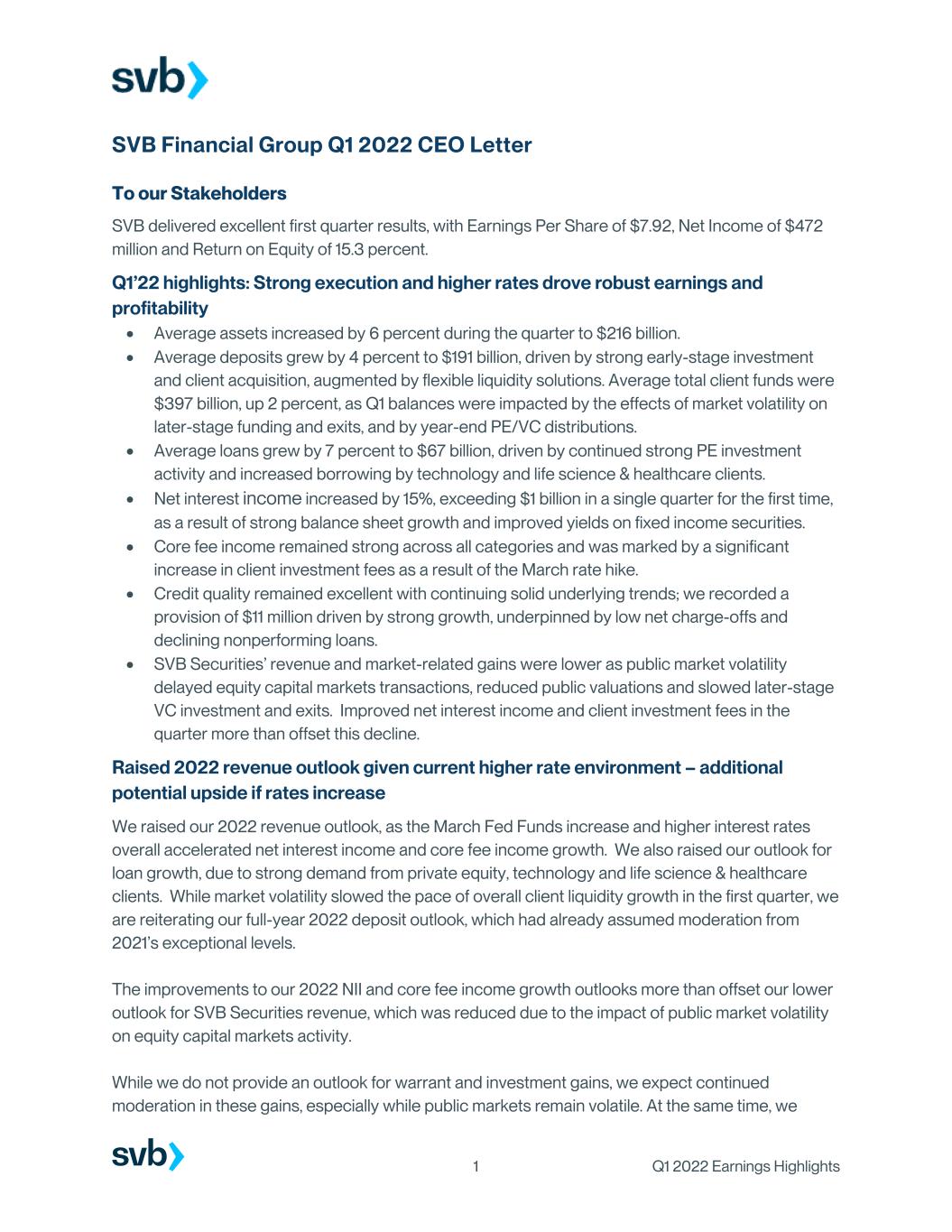
1 Q1 2022 Earnings Highlights SVB Financial Group Q1 2022 CEO Letter To our Stakeholders SVB delivered excellent first quarter results, with Earnings Per Share of $7.92, Net Income of $472 million and Return on Equity of 15.3 percent. Q1’22 highlights: Strong execution and higher rates drove robust earnings and profitability • Average assets increased by 6 percent during the quarter to $216 billion. • Average deposits grew by 4 percent to $191 billion, driven by strong early-stage investment and client acquisition, augmented by flexible liquidity solutions. Average total client funds were $397 billion, up 2 percent, as Q1 balances were impacted by the effects of market volatility on later-stage funding and exits, and by year-end PE/VC distributions. • Average loans grew by 7 percent to $67 billion, driven by continued strong PE investment activity and increased borrowing by technology and life science & healthcare clients. • Net interest income increased by 15%, exceeding $1 billion in a single quarter for the first time, as a result of strong balance sheet growth and improved yields on fixed income securities. • Core fee income remained strong across all categories and was marked by a significant increase in client investment fees as a result of the March rate hike. • Credit quality remained excellent with continuing solid underlying trends; we recorded a provision of $11 million driven by strong growth, underpinned by low net charge-offs and declining nonperforming loans. • SVB Securities’ revenue and market-related gains were lower as public market volatility delayed equity capital markets transactions, reduced public valuations and slowed later-stage VC investment and exits. Improved net interest income and client investment fees in the quarter more than offset this decline. Raised 2022 revenue outlook given current higher rate environment – additional potential upside if rates increase We raised our 2022 revenue outlook, as the March Fed Funds increase and higher interest rates overall accelerated net interest income and core fee income growth. We also raised our outlook for loan growth, due to strong demand from private equity, technology and life science & healthcare clients. While market volatility slowed the pace of overall client liquidity growth in the first quarter, we are reiterating our full-year 2022 deposit outlook, which had already assumed moderation from 2021’s exceptional levels. The improvements to our 2022 NII and core fee income growth outlooks more than offset our lower outlook for SVB Securities revenue, which was reduced due to the impact of public market volatility on equity capital markets activity. While we do not provide an outlook for warrant and investment gains, we expect continued moderation in these gains, especially while public markets remain volatile. At the same time, we
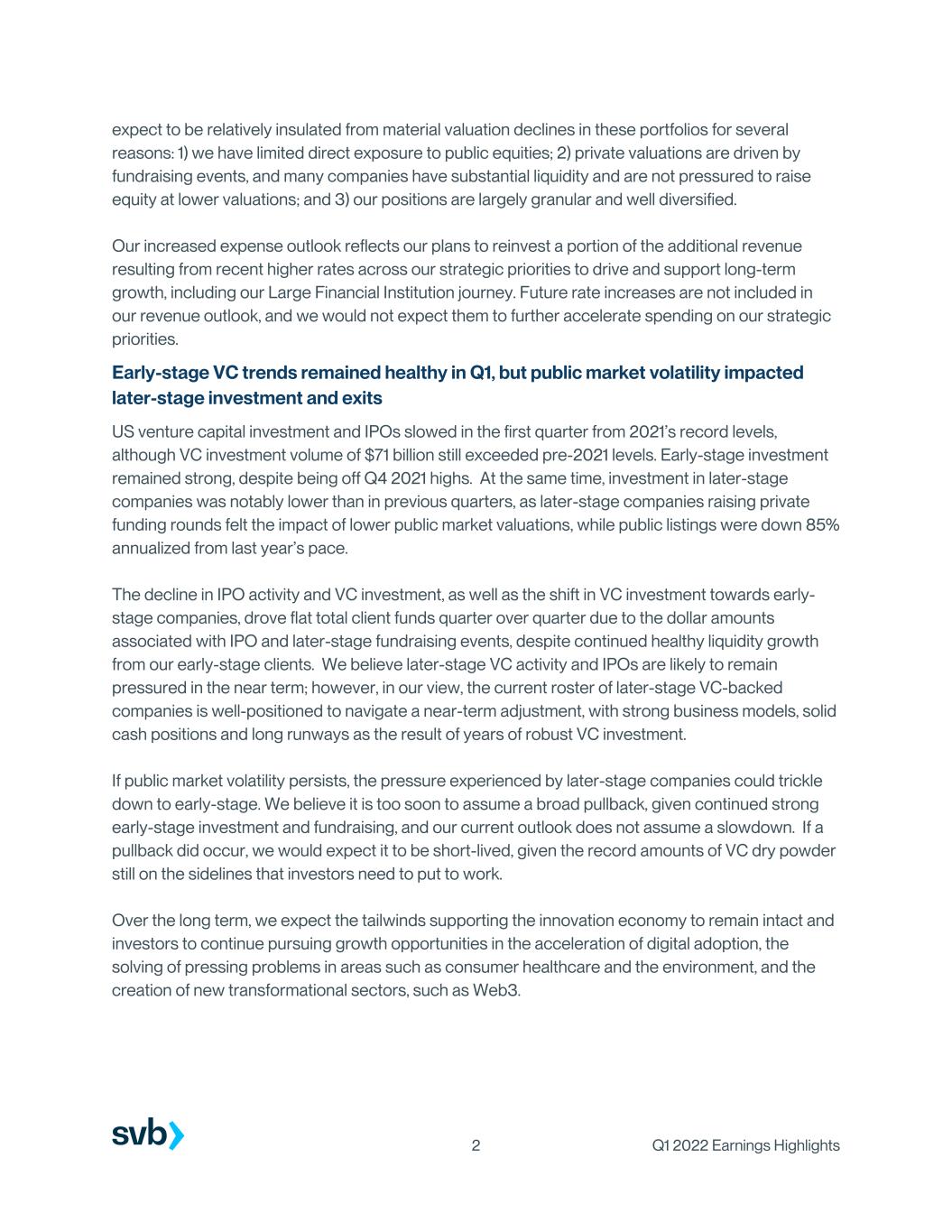
2 Q1 2022 Earnings Highlights expect to be relatively insulated from material valuation declines in these portfolios for several reasons: 1) we have limited direct exposure to public equities; 2) private valuations are driven by fundraising events, and many companies have substantial liquidity and are not pressured to raise equity at lower valuations; and 3) our positions are largely granular and well diversified. Our increased expense outlook reflects our plans to reinvest a portion of the additional revenue resulting from recent higher rates across our strategic priorities to drive and support long-term growth, including our Large Financial Institution journey. Future rate increases are not included in our revenue outlook, and we would not expect them to further accelerate spending on our strategic priorities. Early-stage VC trends remained healthy in Q1, but public market volatility impacted later-stage investment and exits US venture capital investment and IPOs slowed in the first quarter from 2021’s record levels, although VC investment volume of $71 billion still exceeded pre-2021 levels. Early-stage investment remained strong, despite being off Q4 2021 highs. At the same time, investment in later-stage companies was notably lower than in previous quarters, as later-stage companies raising private funding rounds felt the impact of lower public market valuations, while public listings were down 85% annualized from last year’s pace. The decline in IPO activity and VC investment, as well as the shift in VC investment towards early- stage companies, drove flat total client funds quarter over quarter due to the dollar amounts associated with IPO and later-stage fundraising events, despite continued healthy liquidity growth from our early-stage clients. We believe later-stage VC activity and IPOs are likely to remain pressured in the near term; however, in our view, the current roster of later-stage VC-backed companies is well-positioned to navigate a near-term adjustment, with strong business models, solid cash positions and long runways as the result of years of robust VC investment. If public market volatility persists, the pressure experienced by later-stage companies could trickle down to early-stage. We believe it is too soon to assume a broad pullback, given continued strong early-stage investment and fundraising, and our current outlook does not assume a slowdown. If a pullback did occur, we would expect it to be short-lived, given the record amounts of VC dry powder still on the sidelines that investors need to put to work. Over the long term, we expect the tailwinds supporting the innovation economy to remain intact and investors to continue pursuing growth opportunities in the acceleration of digital adoption, the solving of pressing problems in areas such as consumer healthcare and the environment, and the creation of new transformational sectors, such as Web3.
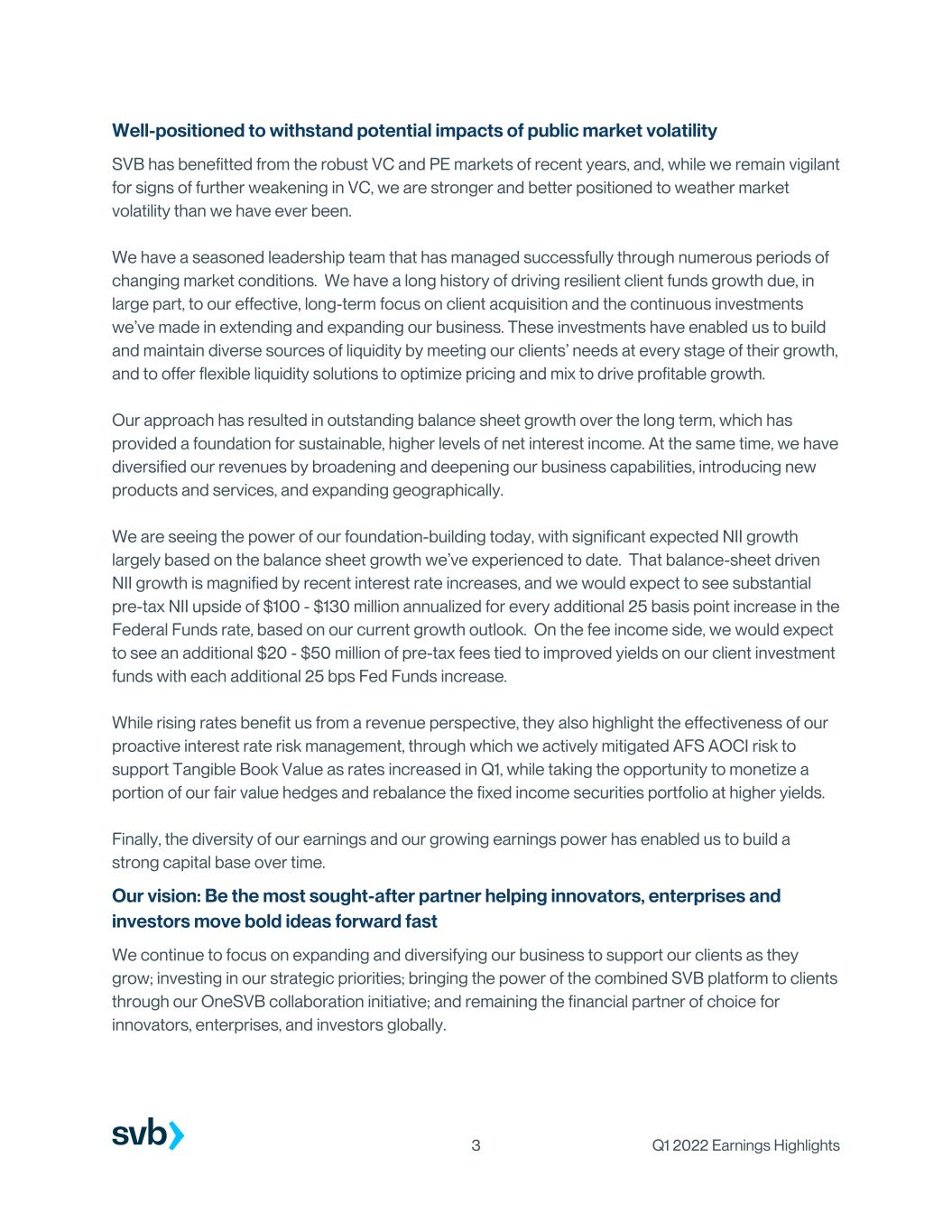
3 Q1 2022 Earnings Highlights Well-positioned to withstand potential impacts of public market volatility SVB has benefitted from the robust VC and PE markets of recent years, and, while we remain vigilant for signs of further weakening in VC, we are stronger and better positioned to weather market volatility than we have ever been. We have a seasoned leadership team that has managed successfully through numerous periods of changing market conditions. We have a long history of driving resilient client funds growth due, in large part, to our effective, long-term focus on client acquisition and the continuous investments we’ve made in extending and expanding our business. These investments have enabled us to build and maintain diverse sources of liquidity by meeting our clients’ needs at every stage of their growth, and to offer flexible liquidity solutions to optimize pricing and mix to drive profitable growth. Our approach has resulted in outstanding balance sheet growth over the long term, which has provided a foundation for sustainable, higher levels of net interest income. At the same time, we have diversified our revenues by broadening and deepening our business capabilities, introducing new products and services, and expanding geographically. We are seeing the power of our foundation-building today, with significant expected NII growth largely based on the balance sheet growth we’ve experienced to date. That balance-sheet driven NII growth is magnified by recent interest rate increases, and we would expect to see substantial pre-tax NII upside of $100 - $130 million annualized for every additional 25 basis point increase in the Federal Funds rate, based on our current growth outlook. On the fee income side, we would expect to see an additional $20 - $50 million of pre-tax fees tied to improved yields on our client investment funds with each additional 25 bps Fed Funds increase. While rising rates benefit us from a revenue perspective, they also highlight the effectiveness of our proactive interest rate risk management, through which we actively mitigated AFS AOCI risk to support Tangible Book Value as rates increased in Q1, while taking the opportunity to monetize a portion of our fair value hedges and rebalance the fixed income securities portfolio at higher yields. Finally, the diversity of our earnings and our growing earnings power has enabled us to build a strong capital base over time. Our vision: Be the most sought-after partner helping innovators, enterprises and investors move bold ideas forward fast We continue to focus on expanding and diversifying our business to support our clients as they grow; investing in our strategic priorities; bringing the power of the combined SVB platform to clients through our OneSVB collaboration initiative; and remaining the financial partner of choice for innovators, enterprises, and investors globally.
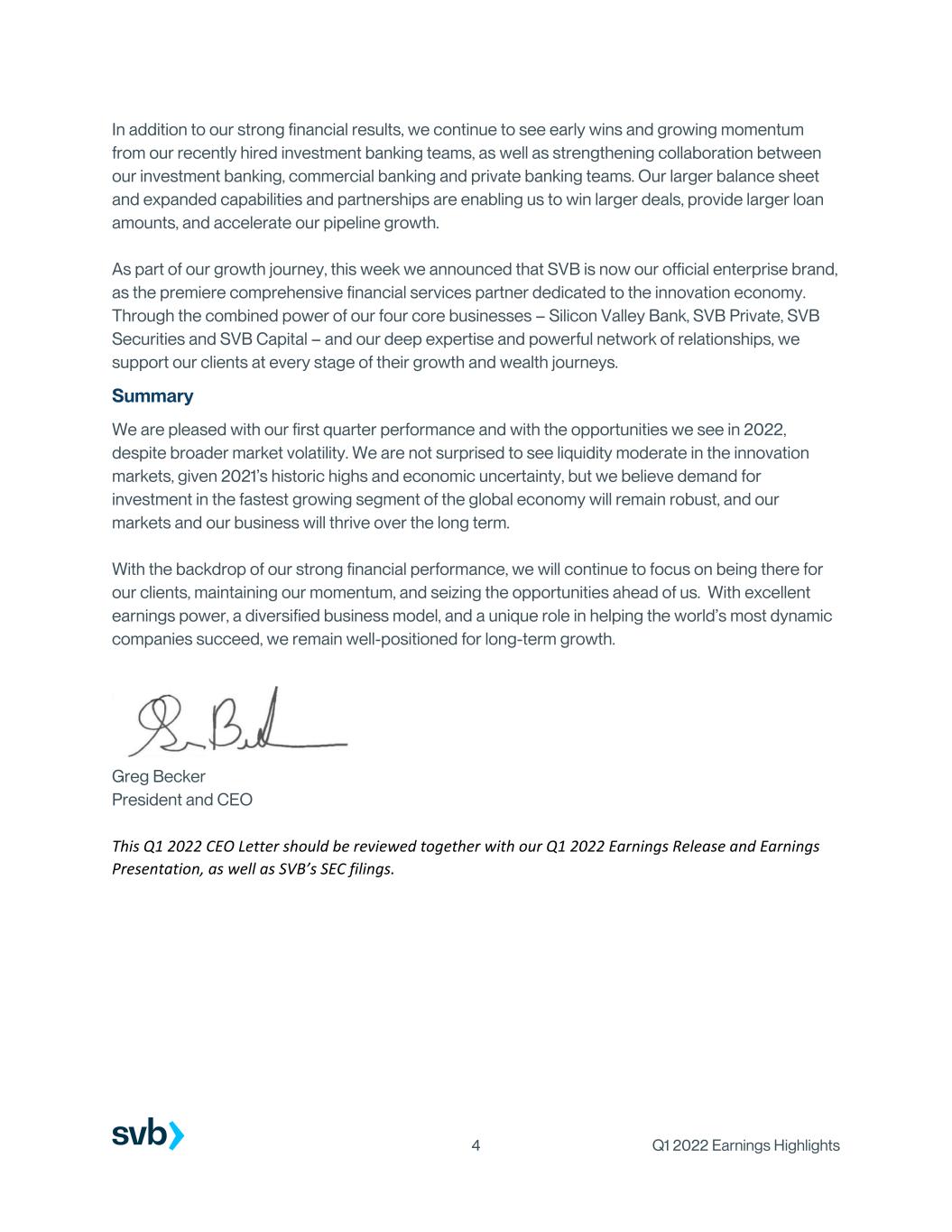
4 Q1 2022 Earnings Highlights In addition to our strong financial results, we continue to see early wins and growing momentum from our recently hired investment banking teams, as well as strengthening collaboration between our investment banking, commercial banking and private banking teams. Our larger balance sheet and expanded capabilities and partnerships are enabling us to win larger deals, provide larger loan amounts, and accelerate our pipeline growth. As part of our growth journey, this week we announced that SVB is now our official enterprise brand, as the premiere comprehensive financial services partner dedicated to the innovation economy. Through the combined power of our four core businesses – Silicon Valley Bank, SVB Private, SVB Securities and SVB Capital – and our deep expertise and powerful network of relationships, we support our clients at every stage of their growth and wealth journeys. Summary We are pleased with our first quarter performance and with the opportunities we see in 2022, despite broader market volatility. We are not surprised to see liquidity moderate in the innovation markets, given 2021’s historic highs and economic uncertainty, but we believe demand for investment in the fastest growing segment of the global economy will remain robust, and our markets and our business will thrive over the long term. With the backdrop of our strong financial performance, we will continue to focus on being there for our clients, maintaining our momentum, and seizing the opportunities ahead of us. With excellent earnings power, a diversified business model, and a unique role in helping the world’s most dynamic companies succeed, we remain well-positioned for long-term growth. Greg Becker President and CEO This Q1 2022 CEO Letter should be reviewed together with our Q1 2022 Earnings Release and Earnings Presentation, as well as SVB’s SEC filings.

Q1 2022 Financial Highlights April 21, 2022
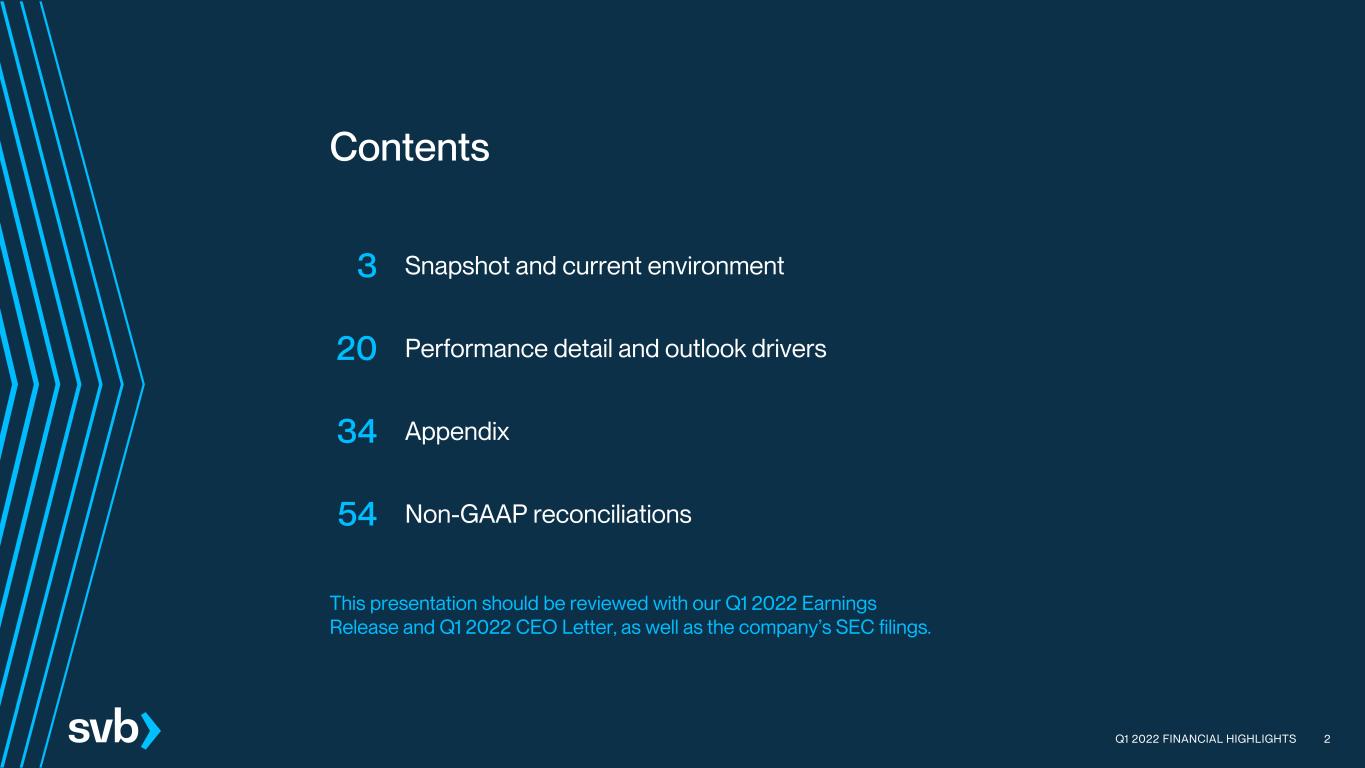
Q1 2022 FINANCIAL HIGHLIGHTS 2 3 Snapshot and current environment 20 Performance detail and outlook drivers 34 Appendix 54 Non-GAAP reconciliations This presentation should be reviewed with our Q1 2022 Earnings Release and Q1 2022 CEO Letter, as well as the company’s SEC filings. Contents

Snapshot and current environment Q1 2022 FINANCIAL HIGHLIGHTS 3

1. Net interest income presented on a fully taxable equivalent basis. 2. Non-GAAP financial measure. See “Use of non-GAAP Financial Measures” in our Q1 2022 Earnings Release and our non-GAAP reconciliations at the end of this presentation. 3. Represents investment banking revenue and commissions. Q1’22 snapshot: Strong execution and higher rates drove robust earnings and profitability Financial highlights *includes –$0.20 impact from Q1’22 performance % changes are vs. Q4’21 $118M -19% SVB Securities revenue2, 3 $67B +7% Average loans $397B +2% Average client funds $11M -77% Provision for credit losses $1.1B +15% Net interest income1 EPS: $7.92* ROE: 15.28% Net Income: $472M $230M +6% Core fee income2 $130M -16% Warrant and investment gains net of NCI2 $16M Pre-tax merger-related charges Q1 2022 FINANCIAL HIGHLIGHTS 4
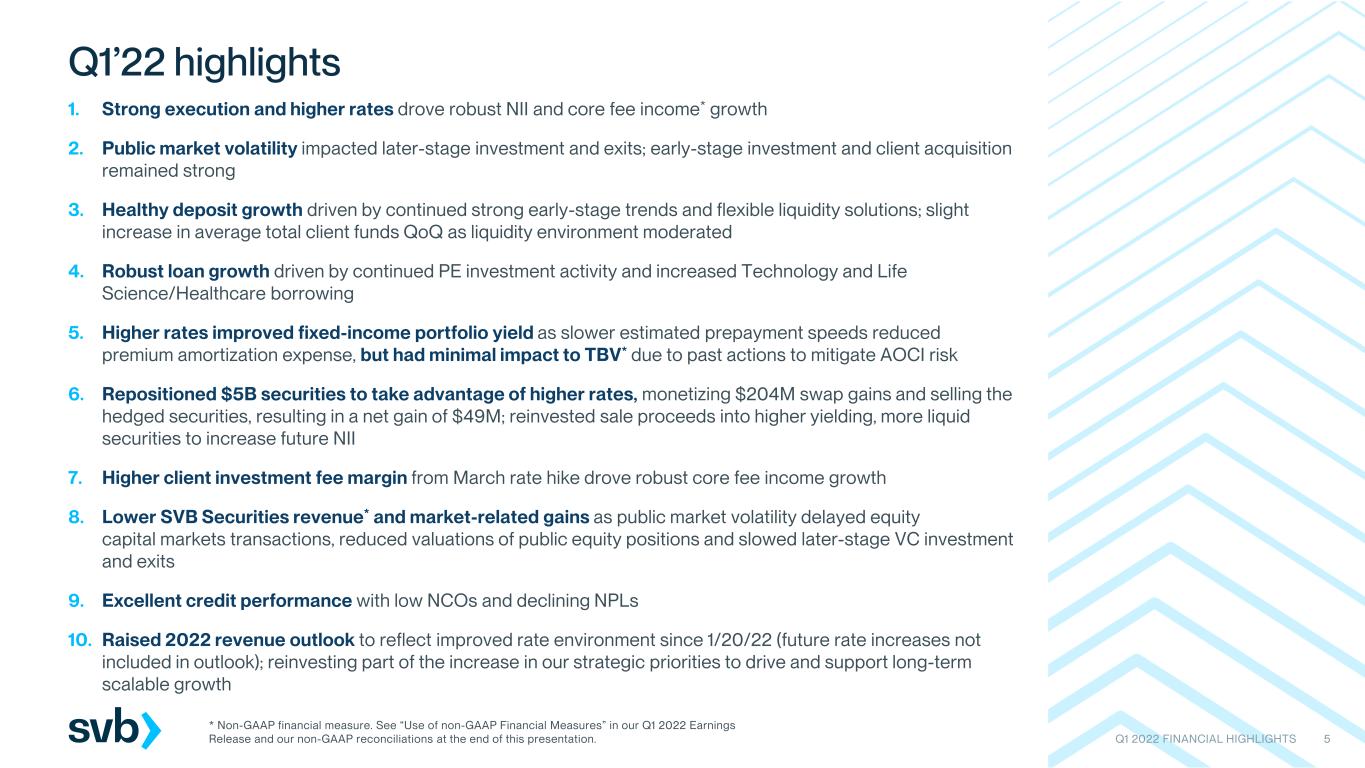
Q1 2022 FINANCIAL HIGHLIGHTS 5 Q1’22 highlights * Non-GAAP financial measure. See “Use of non-GAAP Financial Measures” in our Q1 2022 Earnings Release and our non-GAAP reconciliations at the end of this presentation. 1. Strong execution and higher rates drove robust NII and core fee income* growth 2. Public market volatility impacted later-stage investment and exits; early-stage investment and client acquisition remained strong 3. Healthy deposit growth driven by continued strong early-stage trends and flexible liquidity solutions; slight increase in average total client funds QoQ as liquidity environment moderated 4. Robust loan growth driven by continued PE investment activity and increased Technology and Life Science/Healthcare borrowing 5. Higher rates improved fixed-income portfolio yield as slower estimated prepayment speeds reduced premium amortization expense, but had minimal impact to TBV* due to past actions to mitigate AOCI risk 6. Repositioned $5B securities to take advantage of higher rates, monetizing $204M swap gains and selling the hedged securities, resulting in a net gain of $49M; reinvested sale proceeds into higher yielding, more liquid securities to increase future NII 7. Higher client investment fee margin from March rate hike drove robust core fee income growth 8. Lower SVB Securities revenue* and market-related gains as public market volatility delayed equity capital markets transactions, reduced valuations of public equity positions and slowed later-stage VC investment and exits 9. Excellent credit performance with low NCOs and declining NPLs 10. Raised 2022 revenue outlook to reflect improved rate environment since 1/20/22 (future rate increases not included in outlook); reinvesting part of the increase in our strategic priorities to drive and support long-term scalable growth
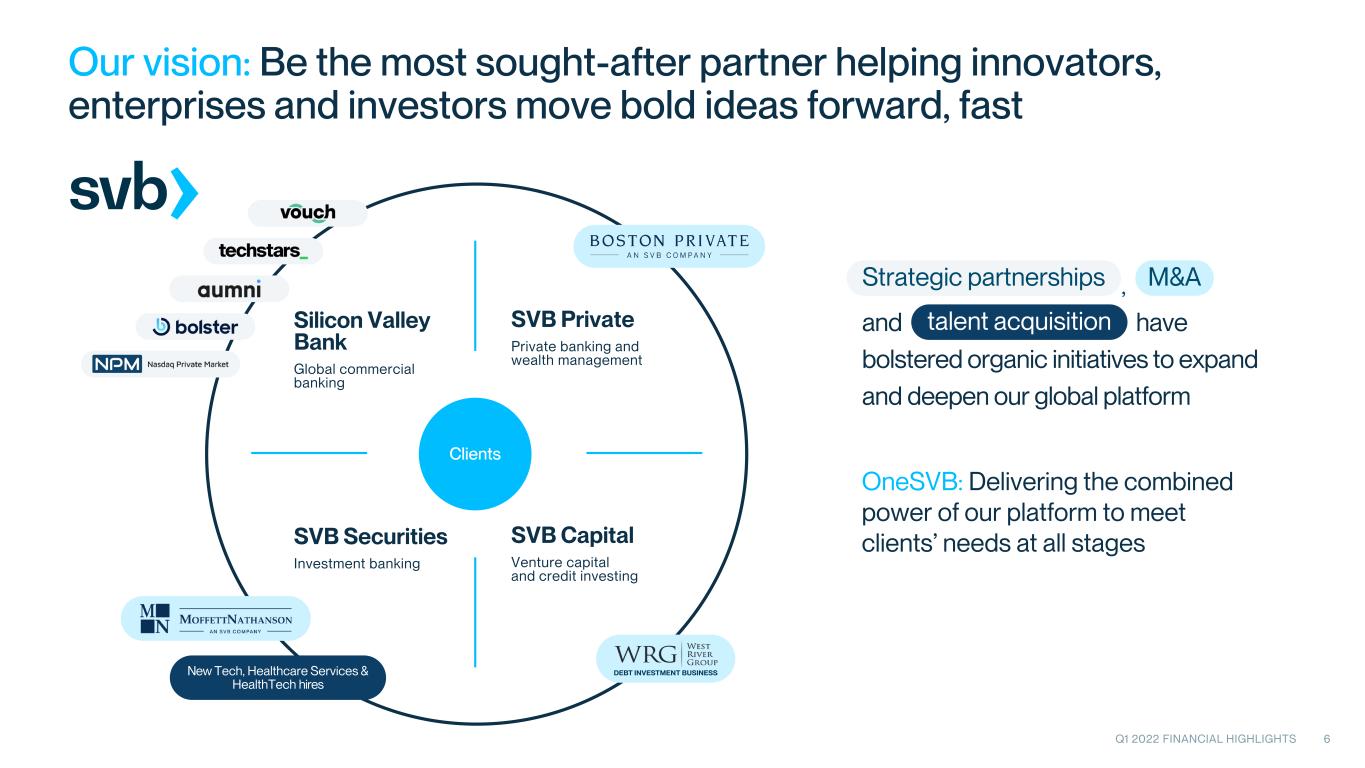
Clients Silicon Valley Bank Global commercial banking Q1 2022 FINANCIAL HIGHLIGHTS 6 Our vision: Be the most sought-after partner helping innovators, enterprises and investors move bold ideas forward, fast New Tech, Healthcare Services & HealthTech hires , and have bolstered organic initiatives to expand and deepen our global platform M&AStrategic partnerships talent acquisition SVB Securities Investment banking SVB Private Private banking and wealth management SVB Capital Venture capital and credit investing OneSVB: Delivering the combined power of our platform to meet clients’ needs at all stages
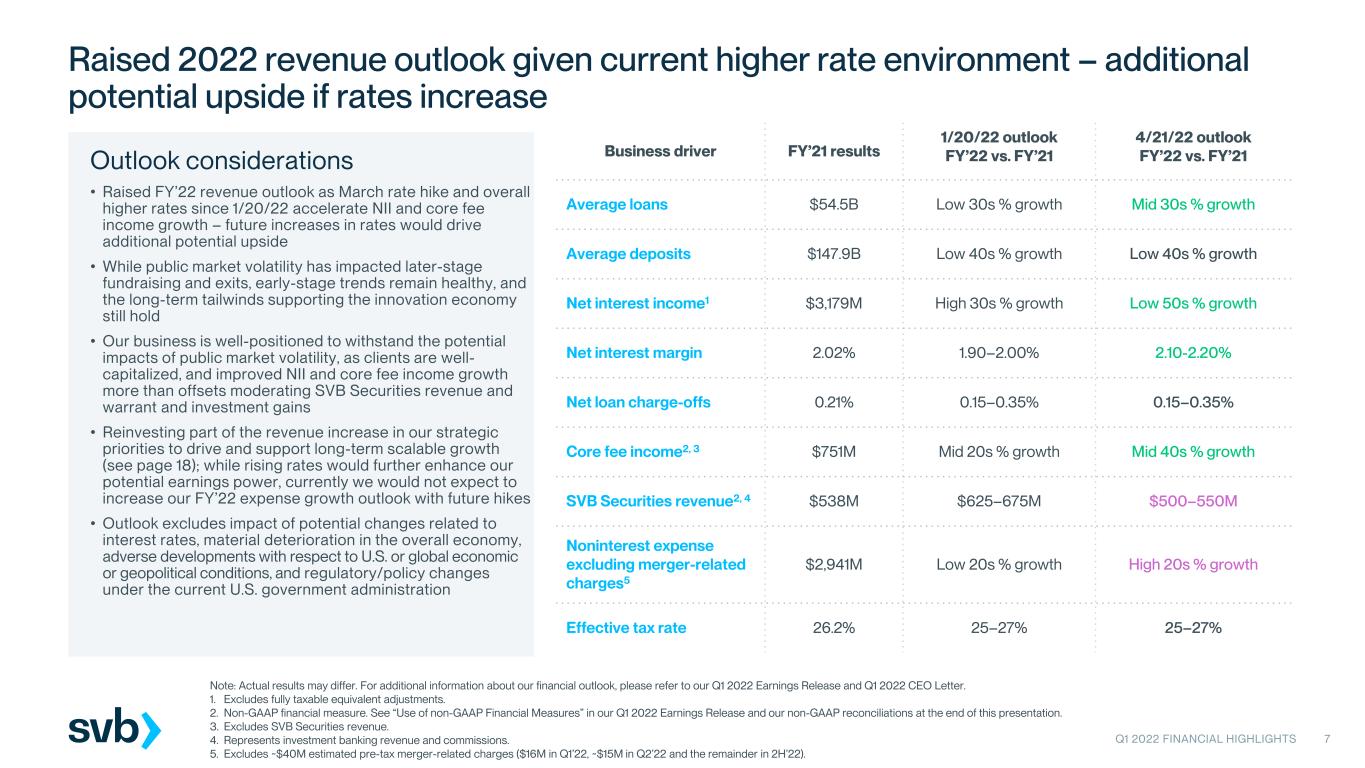
Q1 2022 FINANCIAL HIGHLIGHTS 7 Raised 2022 revenue outlook given current higher rate environment – additional potential upside if rates increase Outlook considerations • Raised FY’22 revenue outlook as March rate hike and overall higher rates since 1/20/22 accelerate NII and core fee income growth – future increases in rates would drive additional potential upside • While public market volatility has impacted later-stage fundraising and exits, early-stage trends remain healthy, and the long-term tailwinds supporting the innovation economy still hold • Our business is well-positioned to withstand the potential impacts of public market volatility, as clients are well- capitalized, and improved NII and core fee income growth more than offsets moderating SVB Securities revenue and warrant and investment gains • Reinvesting part of the revenue increase in our strategic priorities to drive and support long-term scalable growth (see page 18); while rising rates would further enhance our potential earnings power, currently we would not expect to increase our FY’22 expense growth outlook with future hikes • Outlook excludes impact of potential changes related to interest rates, material deterioration in the overall economy, adverse developments with respect to U.S. or global economic or geopolitical conditions, and regulatory/policy changes under the current U.S. government administration Note: Actual results may differ. For additional information about our financial outlook, please refer to our Q1 2022 Earnings Release and Q1 2022 CEO Letter. 1. Excludes fully taxable equivalent adjustments. 2. Non-GAAP financial measure. See “Use of non-GAAP Financial Measures” in our Q1 2022 Earnings Release and our non-GAAP reconciliations at the end of this presentation. 3. Excludes SVB Securities revenue. 4. Represents investment banking revenue and commissions. 5. Excludes ~$40M estimated pre-tax merger-related charges ($16M in Q1’22, ~$15M in Q2’22 and the remainder in 2H’22). Business driver FY’21 results 1/20/22 outlook FY’22 vs. FY’21 4/21/22 outlook FY’22 vs. FY’21 Average loans $54.5B Low 30s % growth Mid 30s % growth Average deposits $147.9B Low 40s % growth Low 40s % growth Net interest income1 $3,179M High 30s % growth Low 50s % growth Net interest margin 2.02% 1.90–2.00% 2.10-2.20% Net loan charge-offs 0.21% 0.15–0.35% 0.15–0.35% Core fee income2, 3 $751M Mid 20s % growth Mid 40s % growth SVB Securities revenue2, 4 $538M $625–675M $500–550M Noninterest expense excluding merger-related charges5 $2,941M Low 20s % growth High 20s % growth Effective tax rate 26.2% 25–27% 25–27%
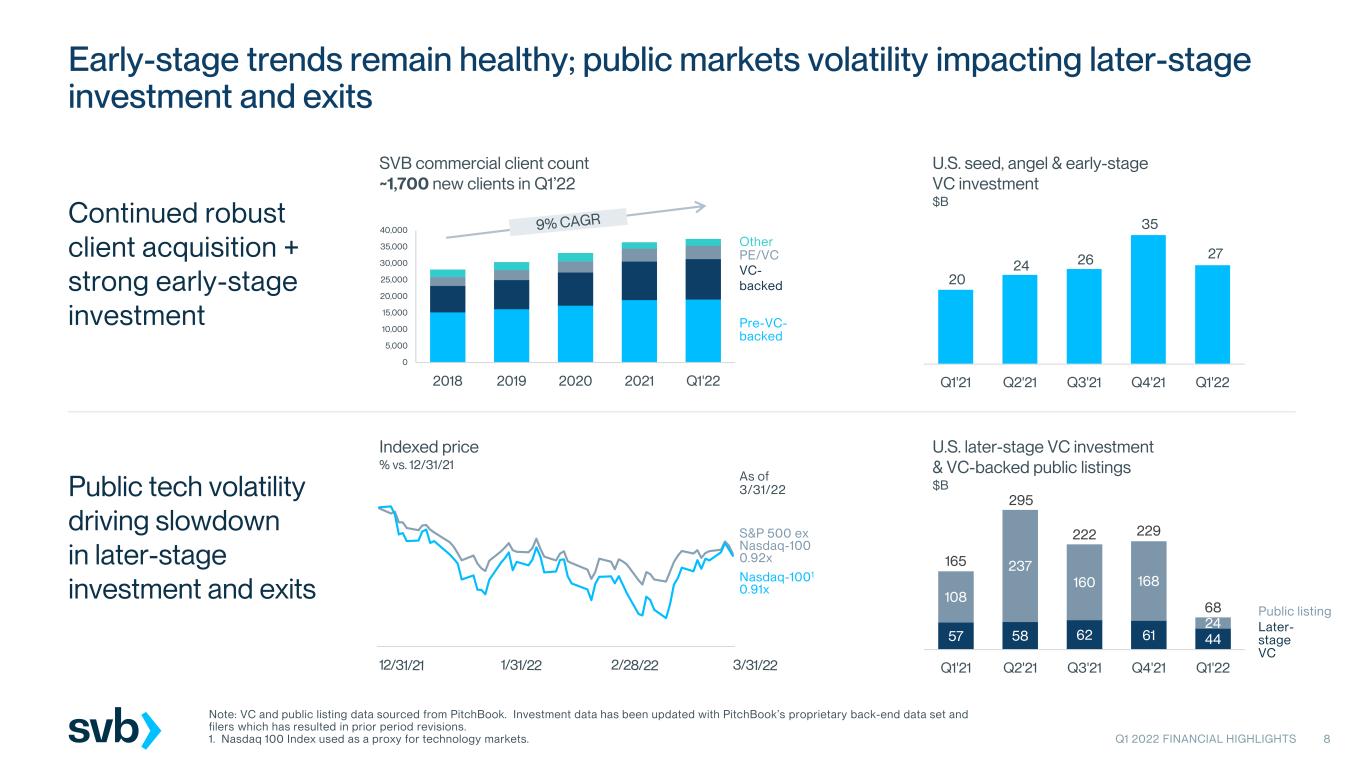
U.S. seed, angel & early-stage VC investment $B 20 24 26 35 27 - 5 10 15 20 25 30 35 40 Q1'21 Q2'21 Q3'21 Q4'21 Q1'22 0 5,000 10,000 15,000 20,000 25,000 30,000 35,000 40,000 2018 2019 2020 2021 Q1'22 Q1 2022 FINANCIAL HIGHLIGHTS 8 Early-stage trends remain healthy; public markets volatility impacting later-stage investment and exits Note: VC and public listing data sourced from PitchBook. Investment data has been updated with PitchBook’s proprietary back-end data set and filers which has resulted in prior period revisions. 1. Nasdaq 100 Index used as a proxy for technology markets. Other PE/VC VC- backed Pre-VC- backed 57 58 62 61 44 108 237 160 168 24 165 295 222 229 68 0 100 200 300 Q1'21 Q2'21 Q3'21 Q4'21 Q1'22 Later- stage VC Public listing S&P 500 ex Nasdaq-100 0.92x As of 3/31/22 Nasdaq-1001 0.91x Public tech volatility driving slowdown in later-stage investment and exits Continued robust client acquisition + strong early-stage investment SVB commercial client count ~1,700 new clients in Q1’22 Indexed price % vs. 12/31/21 U.S. later-stage VC investment & VC-backed public listings $B
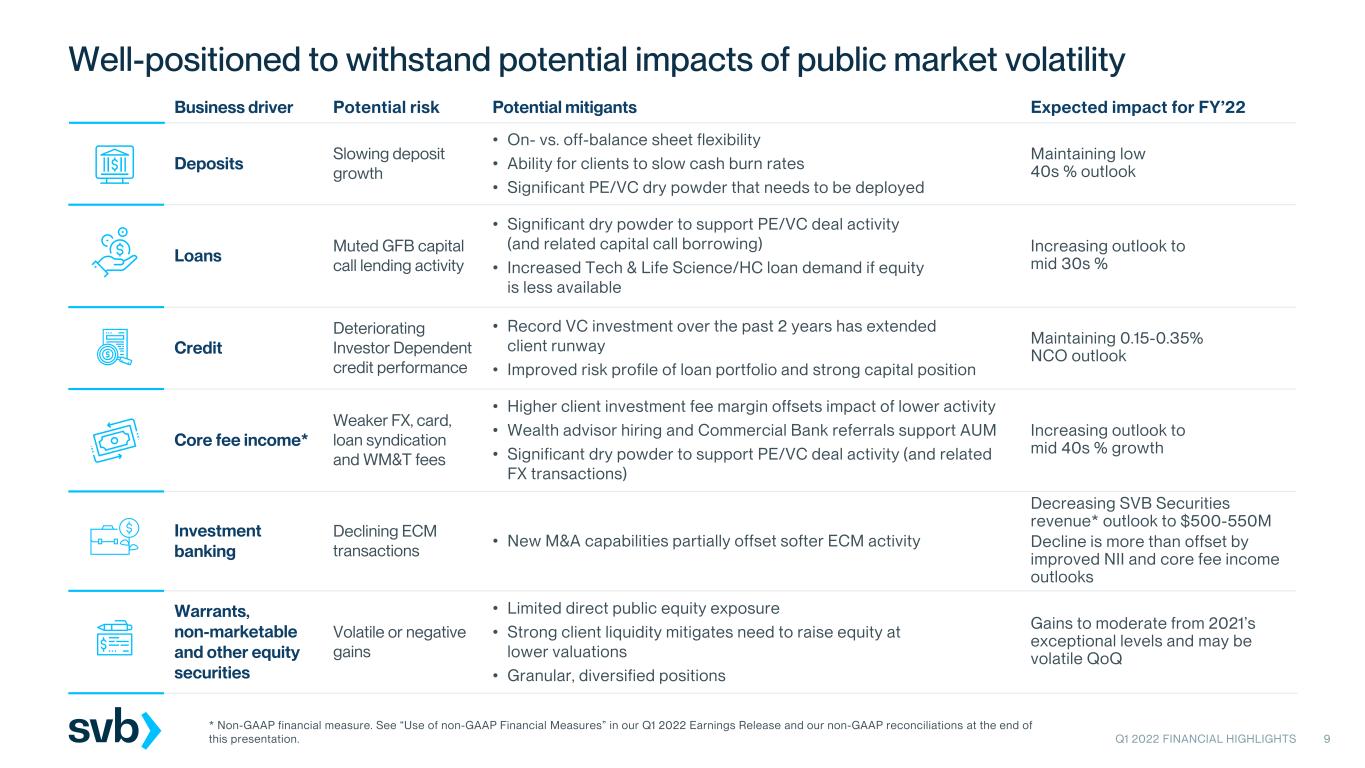
Business driver Potential risk Potential mitigants Expected impact for FY’22 Deposits Slowing deposit growth • On- vs. off-balance sheet flexibility • Ability for clients to slow cash burn rates • Significant PE/VC dry powder that needs to be deployed Maintaining low 40s % outlook Loans Muted GFB capital call lending activity • Significant dry powder to support PE/VC deal activity (and related capital call borrowing) • Increased Tech & Life Science/HC loan demand if equity is less available Increasing outlook to mid 30s % Credit Deteriorating Investor Dependent credit performance • Record VC investment over the past 2 years has extended client runway • Improved risk profile of loan portfolio and strong capital position Maintaining 0.15-0.35% NCO outlook Core fee income* Weaker FX, card, loan syndication and WM&T fees • Higher client investment fee margin offsets impact of lower activity • Wealth advisor hiring and Commercial Bank referrals support AUM • Significant dry powder to support PE/VC deal activity (and related FX transactions) Increasing outlook to mid 40s % growth Investment banking Declining ECM transactions • New M&A capabilities partially offset softer ECM activity Decreasing SVB Securities revenue* outlook to $500-550M Decline is more than offset by improved NII and core fee income outlooks Warrants, non-marketable and other equity securities Volatile or negative gains • Limited direct public equity exposure • Strong client liquidity mitigates need to raise equity at lower valuations • Granular, diversified positions Gains to moderate from 2021’s exceptional levels and may be volatile QoQ Q1 2022 FINANCIAL HIGHLIGHTS 9 Well-positioned to withstand potential impacts of public market volatility * Non-GAAP financial measure. See “Use of non-GAAP Financial Measures” in our Q1 2022 Earnings Release and our non-GAAP reconciliations at the end of this presentation.
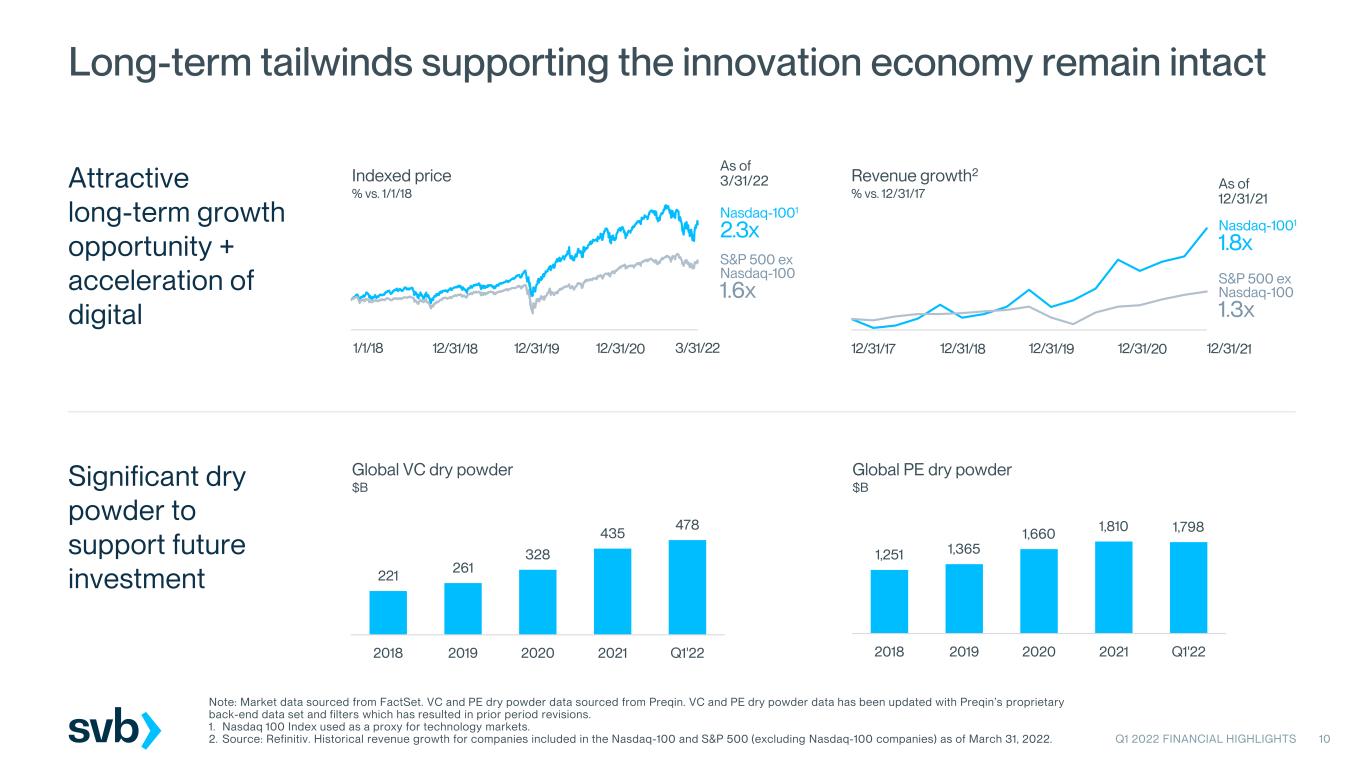
S&P 500 ex Nasdaq-100 1.6x As of 3/31/22 Nasdaq-1001 2.3x Significant dry powder to support future investment Attractive long-term growth opportunity + acceleration of digital 1,251 1,365 1,660 1,810 1,798 2018 2019 2020 2021 Q1'22 221 261 328 435 478 2018 2019 2020 2021 Q1'22 Indexed price % vs. 1/1/18 Q1 2022 FINANCIAL HIGHLIGHTS 10 Long-term tailwinds supporting the innovation economy remain intact Note: Market data sourced from FactSet. VC and PE dry powder data sourced from Preqin. VC and PE dry powder data has been updated with Preqin’s proprietary back-end data set and filters which has resulted in prior period revisions. 1. Nasdaq 100 Index used as a proxy for technology markets. 2. Source: Refinitiv. Historical revenue growth for companies included in the Nasdaq-100 and S&P 500 (excluding Nasdaq-100 companies) as of March 31, 2022. Revenue growth2 % vs. 12/31/17 3/31/22 As of 12/31/21 Nasdaq-1001 1.8x S&P 500 ex Nasdaq-100 1.3x Global VC dry powder $B Global PE dry powder $B 1/1/18

17 20 21 16 16 18 20 24 30 39 43 51 75 92 117 181 206 4 4 5 9 12 15 18 20 28 37 39 43 48 55 75 148 191 21 24 26 25 28 33 38 44 58 76 82 94 123 147 192 329 397 24% 15% 9% -4% 9% 20% 14% 15% 33% 29% 9% 15% 31% 19% 31% 71% 25% 28% -2% -25% 15% 42% -8% 18% 51% 16% -4% 7% 63% 0.2% 15% 98% -200% -150% -100% -50% 0% 50% 100% 2006 2007 2008 2009 2010 2011 2012 2013 2014 2015 2016 2017 2018 2019 2020 2021 Q1'22 Global financial crisis VC recalibration* COVID-19 pandemic Q1 2022 FINANCIAL HIGHLIGHTS 11 Resilient client funds growth over the long-term Total average client funds $B Annual total client funds growth rate (positive, negative) On-balance sheet deposits Annual U.S. VC investment growth rate (positive, negative)Off-balance sheet client funds Q1’22 vs. Q4’21 QoQ growth Average client funds +2% U.S. VC investment -26% Note: VC investment data sourced from PitchBook. Investment data has been updated with PitchBook’s proprietary back-end data set and filters which has resulted in prior period revisions. * Pullback in VC investment.
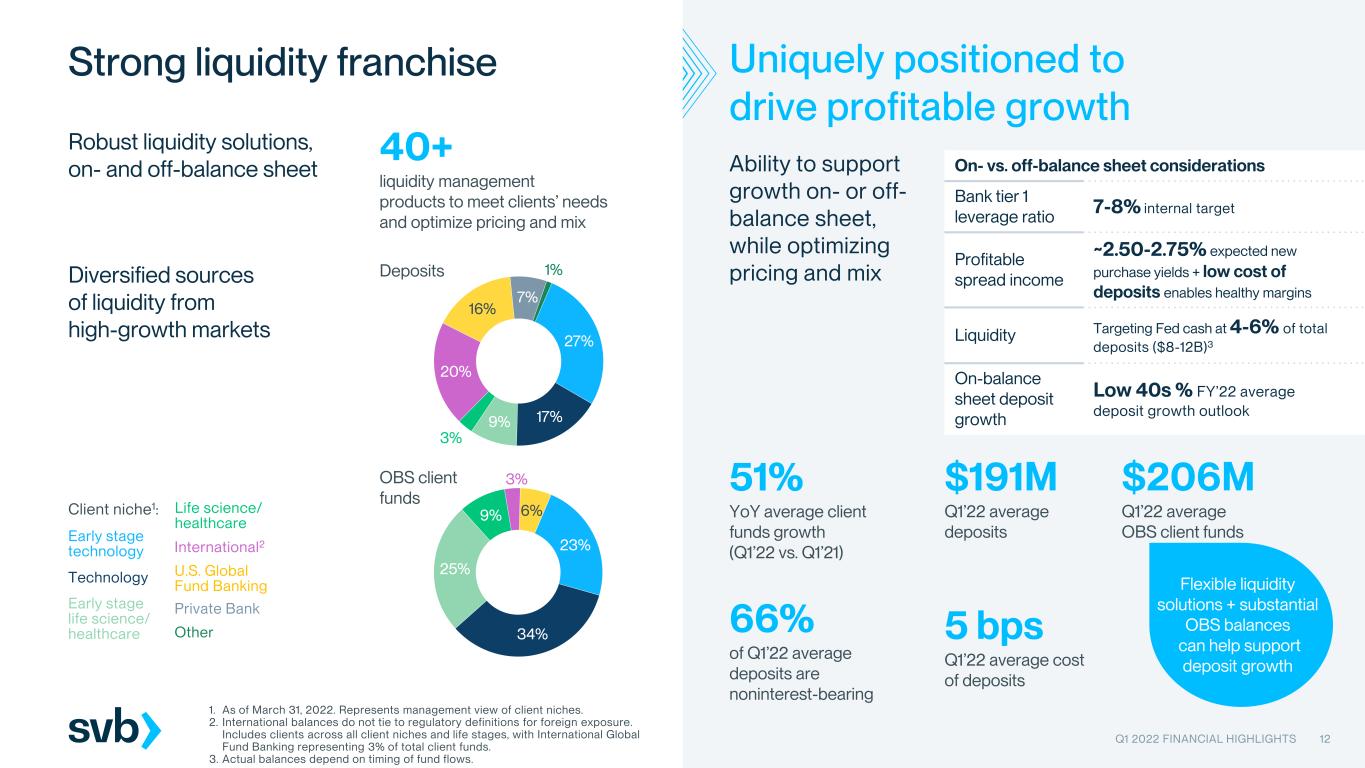
Q1 2022 FINANCIAL HIGHLIGHTS Strong liquidity franchise Uniquely positioned to drive profitable growth 40+ liquidity management products to meet clients’ needs and optimize pricing and mix Robust liquidity solutions, on- and off-balance sheet Diversified sources of liquidity from high-growth markets 27% 17%9% 3% 20% 16% 7% 1% 23% 34% 25% 9% 3% 6% Deposits OBS client funds Early stage life science/ healthcare Early stage technology Private Bank International2 Life science/ healthcare Technology Other U.S. Global Fund Banking Client niche1: 1. As of March 31, 2022. Represents management view of client niches. 2. International balances do not tie to regulatory definitions for foreign exposure. Includes clients across all client niches and life stages, with International Global Fund Banking representing 3% of total client funds. 3. Actual balances depend on timing of fund flows. On- vs. off-balance sheet considerations Bank tier 1 leverage ratio 7-8% internal target Profitable spread income ~2.50-2.75% expected new purchase yields + low cost of deposits enables healthy margins Liquidity Targeting Fed cash at 4-6% of total deposits ($8-12B)3 On-balance sheet deposit growth Low 40s % FY’22 average deposit growth outlook Ability to support growth on- or off- balance sheet, while optimizing pricing and mix 66% of Q1’22 average deposits are noninterest-bearing $191M Q1’22 average deposits 5 bps Q1’22 average cost of deposits 51% YoY average client funds growth (Q1’22 vs. Q1’21) $206M Q1’22 average OBS client funds Flexible liquidity solutions + substantial OBS balances can help support deposit growth 12
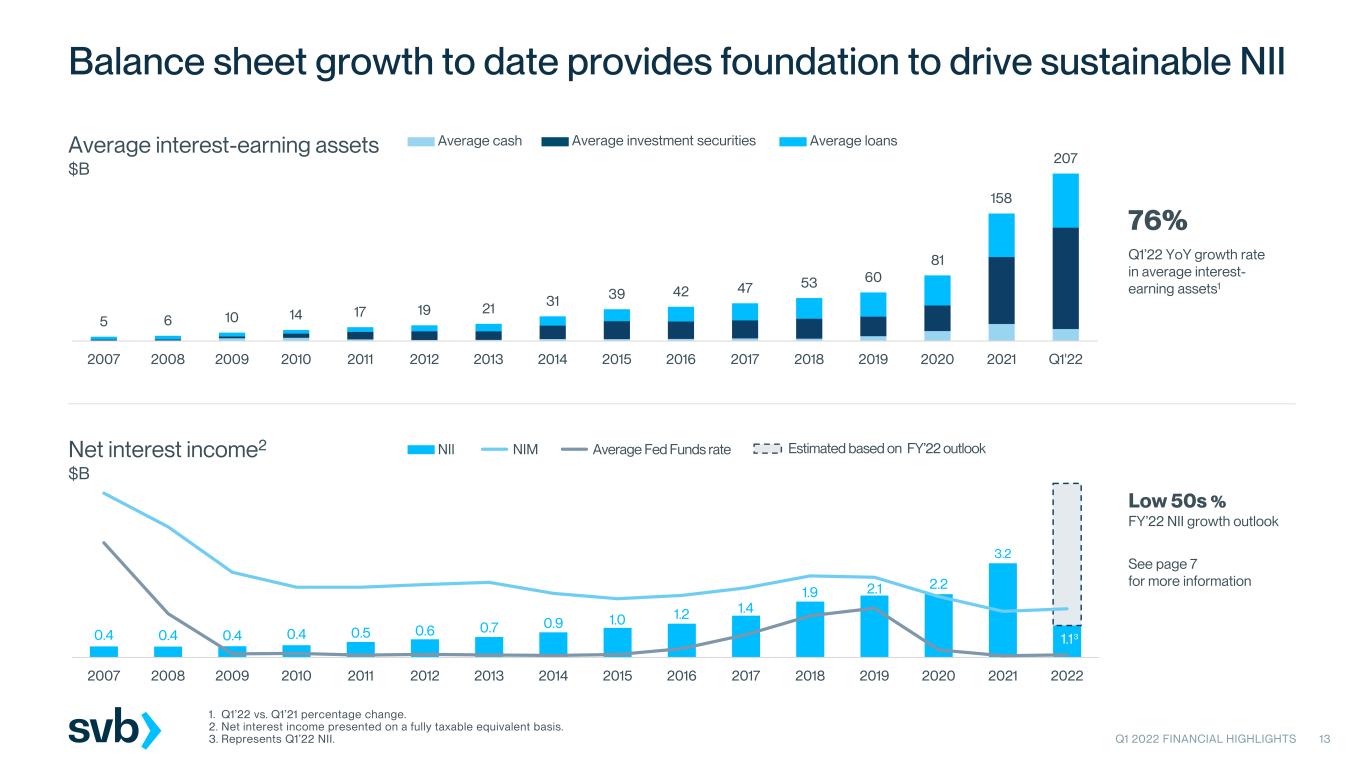
0.4 0.4 0.4 0.4 0.5 0.6 0.7 0.9 1.0 1.2 1.4 1.9 2.1 2.2 3.2 1.1 2007 2008 2009 2010 2011 2012 2013 2014 2015 2016 2017 2018 2019 2020 2021 2022 5 6 10 14 17 19 21 31 39 42 47 53 60 81 158 207 0 50 100 150 200 2007 2008 2009 2010 2011 2012 2013 2014 2015 2016 2017 2018 2019 2020 2021 Q1'22 Q1 2022 FINANCIAL HIGHLIGHTS 13 Balance sheet growth to date provides foundation to drive sustainable NII NII Estimated based on FY’22 outlookNIM Average Fed Funds rate Low 50s % FY’22 NII growth outlook See page 7 for more information 1. Q1’22 vs. Q1’21 percentage change. 2. Net interest income presented on a fully taxable equivalent basis. 3. Represents Q1’22 NII. Net interest income2 $B 76% Q1’22 YoY growth rate in average interest- earning assets1 Average interest-earning assets $B Average cash Average investment securities Average loans 3
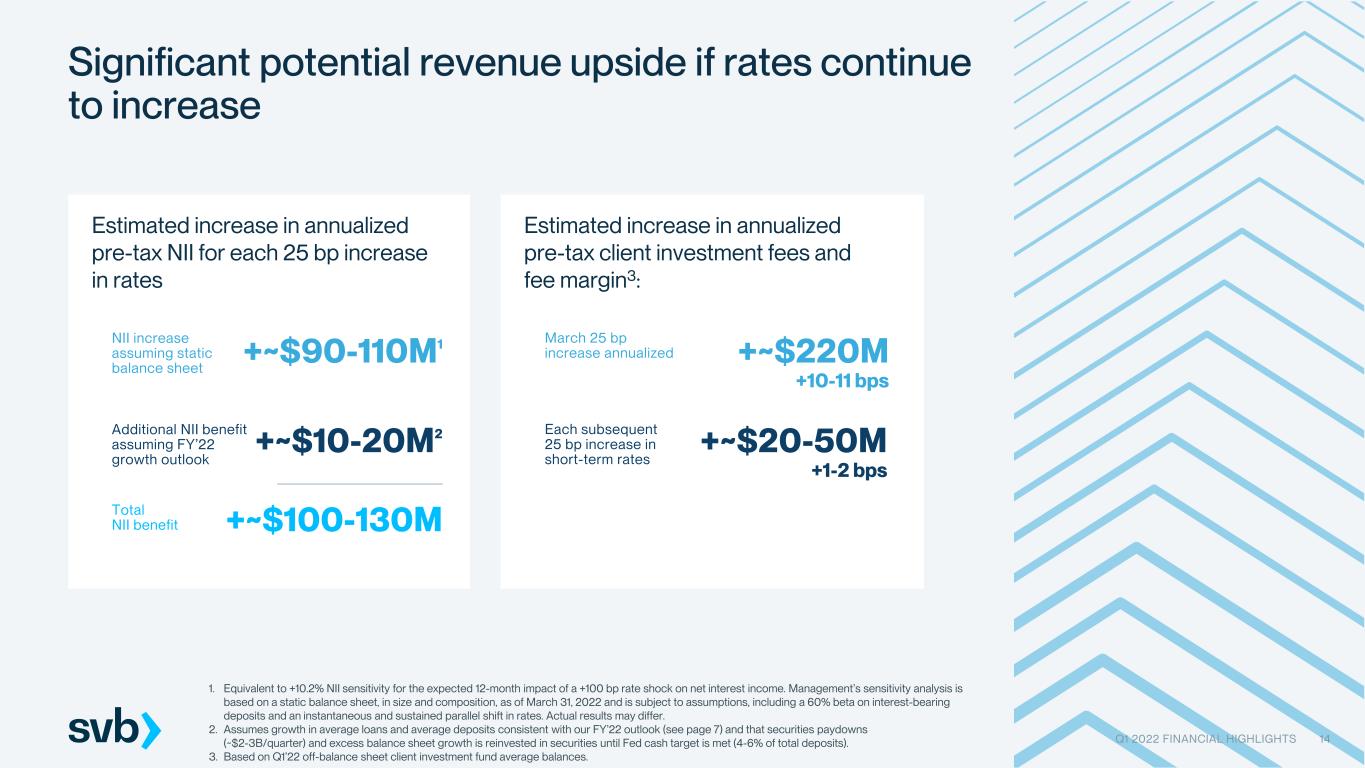
Significant potential revenue upside if rates continue to increase Estimated increase in annualized pre-tax client investment fees and fee margin3: +~$90-110M1 +~$20-50M +1-2 bps Each subsequent 25 bp increase in short-term rates Estimated increase in annualized pre-tax NII for each 25 bp increase in rates +~$10-20M2 NII increase assuming static balance sheet Additional NII benefit assuming FY’22 growth outlook Total NII benefit +~$100-130M 1. Equivalent to +10.2% NII sensitivity for the expected 12-month impact of a +100 bp rate shock on net interest income. Management’s sensitivity analysis is based on a static balance sheet, in size and composition, as of March 31, 2022 and is subject to assumptions, including a 60% beta on interest-bearing deposits and an instantaneous and sustained parallel shift in rates. Actual results may differ. 2. Assumes growth in average loans and average deposits consistent with our FY’22 outlook (see page 7) and that securities paydowns (~$2-3B/quarter) and excess balance sheet growth is reinvested in securities until Fed cash target is met (4-6% of total deposits). 3. Based on Q1’22 off-balance sheet client investment fund average balances. Q1 2022 FINANCIAL HIGHLIGHTS 14 +~$220M +10-11 bps March 25 bp increase annualized
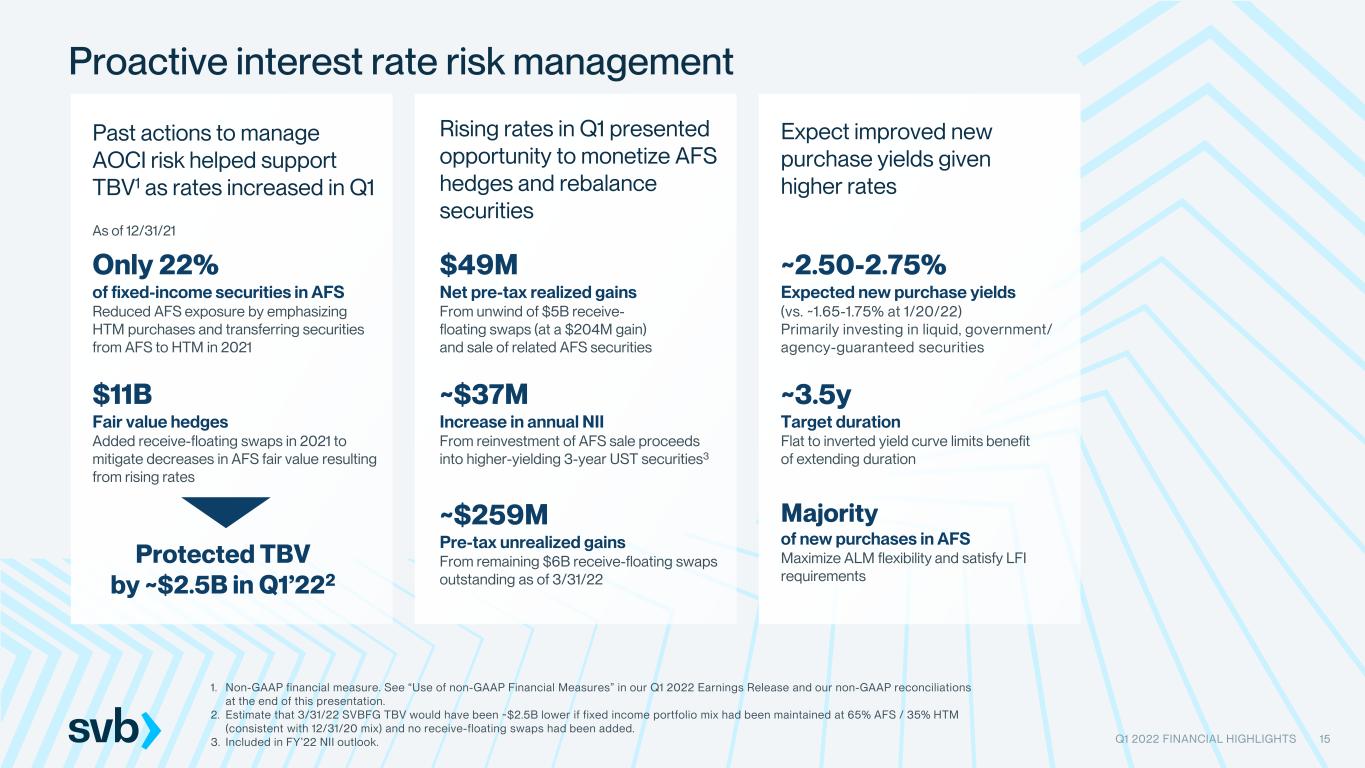
Q1 2022 FINANCIAL HIGHLIGHTS 15 Proactive interest rate risk management Expect improved new purchase yields given higher rates 1. Non-GAAP financial measure. See “Use of non-GAAP Financial Measures” in our Q1 2022 Earnings Release and our non-GAAP reconciliations at the end of this presentation. 2. Estimate that 3/31/22 SVBFG TBV would have been ~$2.5B lower if fixed income portfolio mix had been maintained at 65% AFS / 35% HTM (consistent with 12/31/20 mix) and no receive-floating swaps had been added. 3. Included in FY’22 NII outlook. Past actions to manage AOCI risk helped support TBV1 as rates increased in Q1 Only 22% of fixed-income securities in AFS Reduced AFS exposure by emphasizing HTM purchases and transferring securities from AFS to HTM in 2021 $11B Fair value hedges Added receive-floating swaps in 2021 to mitigate decreases in AFS fair value resulting from rising rates Rising rates in Q1 presented opportunity to monetize AFS hedges and rebalance securities $49M Net pre-tax realized gains From unwind of $5B receive- floating swaps (at a $204M gain) and sale of related AFS securities ~$37M Increase in annual NII From reinvestment of AFS sale proceeds into higher-yielding 3-year UST securities3 ~$259M Pre-tax unrealized gains From remaining $6B receive-floating swaps outstanding as of 3/31/22 ~3.5y Target duration Flat to inverted yield curve limits benefit of extending duration ~2.50-2.75% Expected new purchase yields (vs. ~1.65-1.75% at 1/20/22) Primarily investing in liquid, government/ agency-guaranteed securities Majority of new purchases in AFS Maximize ALM flexibility and satisfy LFI requirements Protected TBV by ~$2.5B in Q1’222 As of 12/31/21
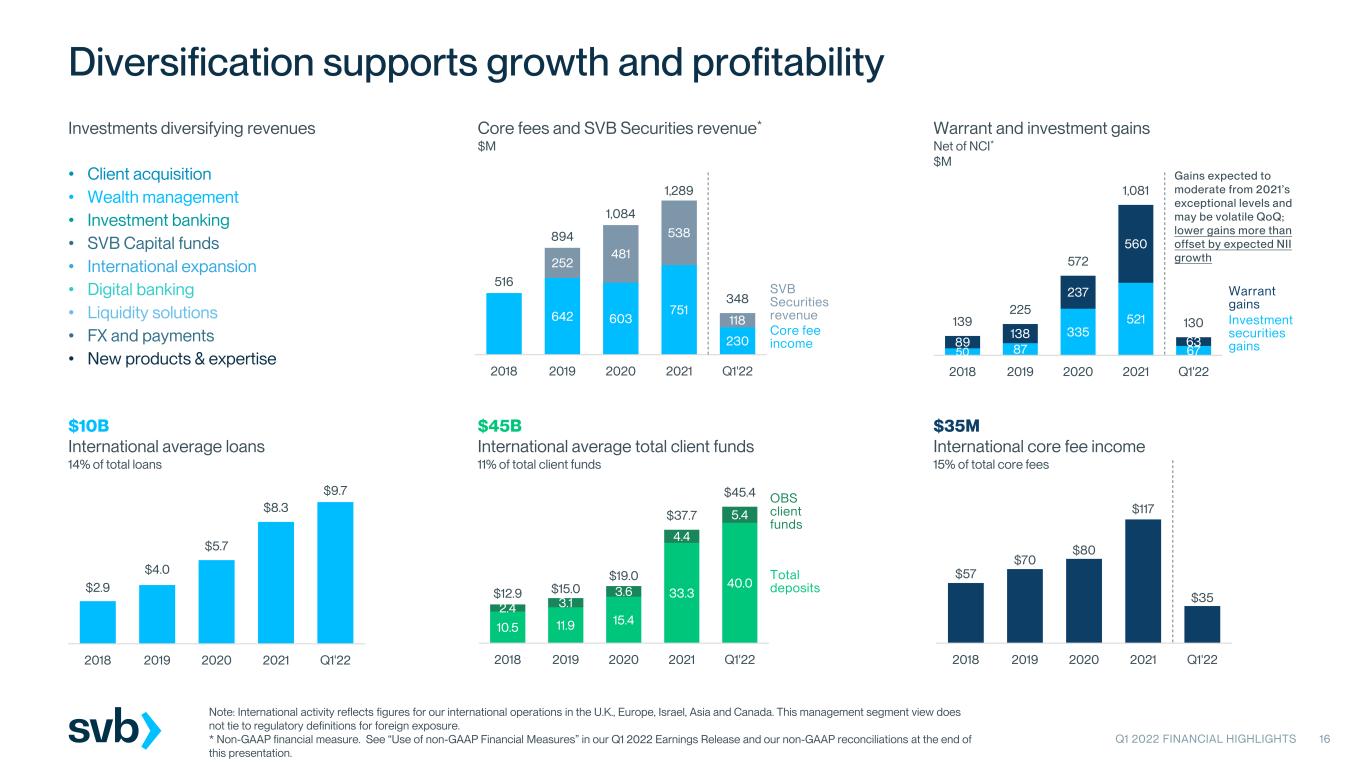
10.5 11.9 15.4 33.3 40.0 2.4 3.1 3.6 4.4 5.4 $12.9 $15.0 $19.0 $37.7 $45.4 2018 2019 2020 2021 Q1'22 Total deposits OBS client funds Q1 2022 FINANCIAL HIGHLIGHTS 16 Diversification supports growth and profitability Note: International activity reflects figures for our international operations in the U.K., Europe, Israel, Asia and Canada. This management segment view does not tie to regulatory definitions for foreign exposure. * Non-GAAP financial measure. See “Use of non-GAAP Financial Measures” in our Q1 2022 Earnings Release and our non-GAAP reconciliations at the end of this presentation. 642 603 751 230 252 481 538 118 516 894 1,084 1,289 348 2018 2019 2020 2021 Q1'22 SVB Securities revenue Core fee income $57 $70 $80 $117 $35 2018 2019 2020 2021 Q1'22 Warrant gains 50 87 335 521 67 89 138 237 560 63 139 225 572 1,081 130 2018 2019 2020 2021 Q1'22 Investment securities gains Gains expected to moderate from 2021’s exceptional levels and may be volatile QoQ; lower gains more than offset by expected NII growth $10B International average loans 14% of total loans Investments diversifying revenues • Client acquisition • Wealth management • Investment banking • SVB Capital funds • International expansion • Digital banking • Liquidity solutions • FX and payments • New products & expertise $2.9 $4.0 $5.7 $8.3 $9.7 2018 2019 2020 2021 Q1'22 Core fees and SVB Securities revenue* $M $45B International average total client funds 11% of total client funds Warrant and investment gains Net of NCI* $M $35M International core fee income 15% of total core fees

Silicon Valley Bank capital ratios1 As of 3/31/22 17 Strong capital position with multiple levers to support capital ratios 7.00% 8.50% 10.50% 4.00% 14.91% 14.91% 15.44% 7.09% Common Equity Tier 1 Tier 1 Capital Total Capital Tier 1 Leverage SVB capital ratio Regulatory minimum Levers to support capital ratios Targeting 7-8% Bank Tier 1 leverage Q1’22 Bank capital ratio drivers • Strong earnings and robust balance sheet growth • No downstream of SVBFG liquidity to Bank in Q1 1. Ratios as of March 31, 2022 are preliminary. 2. Excludes $1.1B shares issued on July 1, 2021 to complete Boston Private acquisition. 15% Q1’22 ROE Strong profitability builds capital 40+ liquidity solutions Robust liquidity solutions on- and off- balance sheet help manage growth $2B 3/31/22 SVBFG liquidity SVBFG liquidity a portion of which can be downstreamed to Bank $3.4B Preferred stock Capital markets activity to support growth $1.7B Senior notes $2.4B Common stock2 FY’21 new issuances Amounts are gross of fees Q1 2022 FINANCIAL HIGHLIGHTS
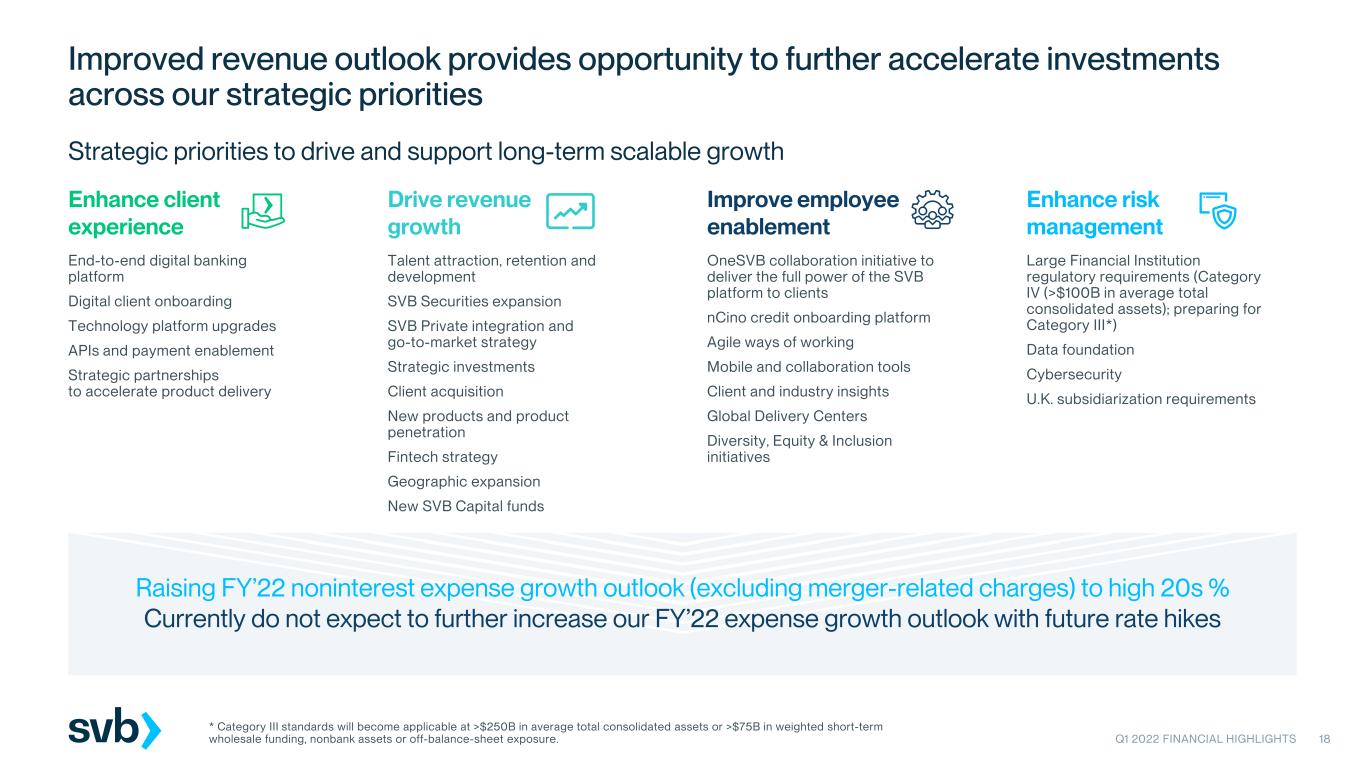
Raising FY’22 noninterest expense growth outlook (excluding merger-related charges) to high 20s % Currently do not expect to further increase our FY’22 expense growth outlook with future rate hikes Q1 2022 FINANCIAL HIGHLIGHTS 18 Improved revenue outlook provides opportunity to further accelerate investments across our strategic priorities OneSVB collaboration initiative to deliver the full power of the SVB platform to clients nCino credit onboarding platform Agile ways of working Mobile and collaboration tools Client and industry insights Global Delivery Centers Diversity, Equity & Inclusion initiatives Large Financial Institution regulatory requirements (Category IV (>$100B in average total consolidated assets); preparing for Category III*) Data foundation Cybersecurity U.K. subsidiarization requirements End-to-end digital banking platform Digital client onboarding Technology platform upgrades APIs and payment enablement Strategic partnerships to accelerate product delivery * Category III standards will become applicable at >$250B in average total consolidated assets or >$75B in weighted short-term wholesale funding, nonbank assets or off-balance-sheet exposure. Talent attraction, retention and development SVB Securities expansion SVB Private integration and go-to-market strategy Strategic investments Client acquisition New products and product penetration Fintech strategy Geographic expansion New SVB Capital funds Strategic priorities to drive and support long-term scalable growth Enhance client experience Drive revenue growth Improve employee enablement Enhance risk management
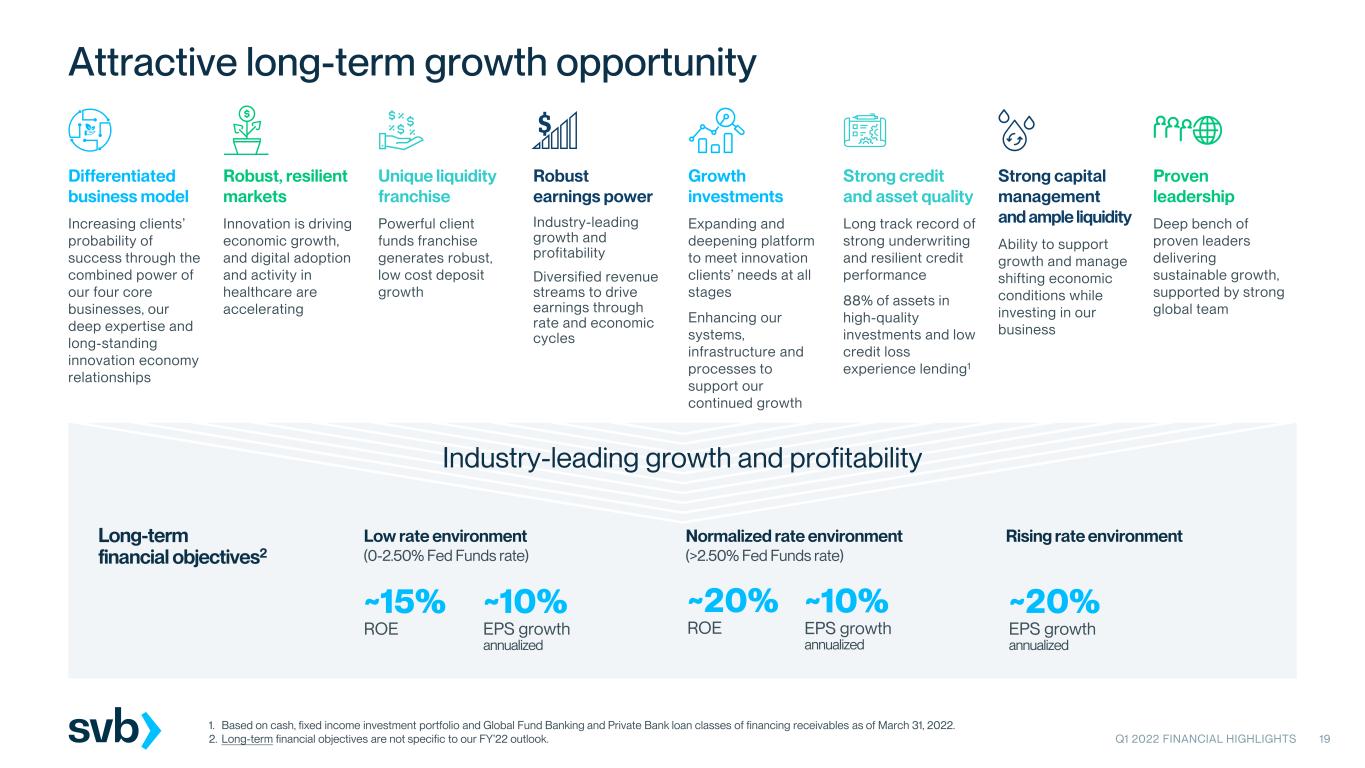
Q1 2022 FINANCIAL HIGHLIGHTS 19 Attractive long-term growth opportunity 1. Based on cash, fixed income investment portfolio and Global Fund Banking and Private Bank loan classes of financing receivables as of March 31, 2022. 2. Long-term financial objectives are not specific to our FY’22 outlook. Long-term financial objectives2 ~15% ROE Low rate environment (0-2.50% Fed Funds rate) ~10% EPS growth annualized ~20% ROE ~20% EPS growth annualized Normalized rate environment (>2.50% Fed Funds rate) Rising rate environment ~10% EPS growth annualized Industry-leading growth and profitability Robust, resilient markets Innovation is driving economic growth, and digital adoption and activity in healthcare are accelerating Robust earnings power Industry-leading growth and profitability Diversified revenue streams to drive earnings through rate and economic cycles Proven leadership Deep bench of proven leaders delivering sustainable growth, supported by strong global team Strong capital management and ample liquidity Ability to support growth and manage shifting economic conditions while investing in our business Strong credit and asset quality Long track record of strong underwriting and resilient credit performance 88% of assets in high-quality investments and low credit loss experience lending1 Growth investments Expanding and deepening platform to meet innovation clients’ needs at all stages Enhancing our systems, infrastructure and processes to support our continued growth Differentiated business model Increasing clients’ probability of success through the combined power of our four core businesses, our deep expertise and long-standing innovation economy relationships Unique liquidity franchise Powerful client funds franchise generates robust, low cost deposit growth

Performance detail and outlook drivers Q1 2022 FINANCIAL HIGHLIGHTS 20
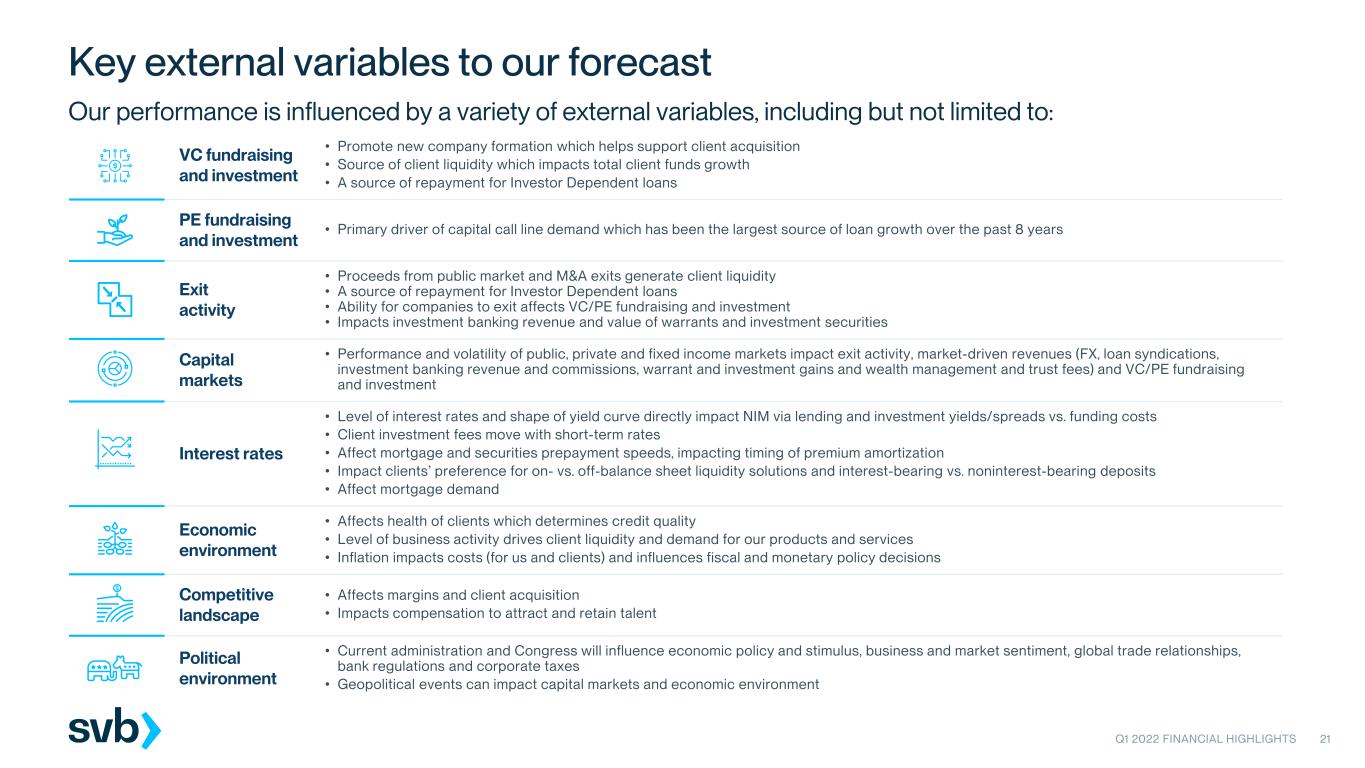
VC fundraising and investment • Promote new company formation which helps support client acquisition • Source of client liquidity which impacts total client funds growth • A source of repayment for Investor Dependent loans PE fundraising and investment • Primary driver of capital call line demand which has been the largest source of loan growth over the past 8 years Exit activity • Proceeds from public market and M&A exits generate client liquidity • A source of repayment for Investor Dependent loans • Ability for companies to exit affects VC/PE fundraising and investment • Impacts investment banking revenue and value of warrants and investment securities Capital markets • Performance and volatility of public, private and fixed income markets impact exit activity, market-driven revenues (FX, loan syndications, investment banking revenue and commissions, warrant and investment gains and wealth management and trust fees) and VC/PE fundraising and investment Interest rates • Level of interest rates and shape of yield curve directly impact NIM via lending and investment yields/spreads vs. funding costs • Client investment fees move with short-term rates • Affect mortgage and securities prepayment speeds, impacting timing of premium amortization • Impact clients’ preference for on- vs. off-balance sheet liquidity solutions and interest-bearing vs. noninterest-bearing deposits • Affect mortgage demand Economic environment • Affects health of clients which determines credit quality • Level of business activity drives client liquidity and demand for our products and services • Inflation impacts costs (for us and clients) and influences fiscal and monetary policy decisions Competitive landscape • Affects margins and client acquisition • Impacts compensation to attract and retain talent Political environment • Current administration and Congress will influence economic policy and stimulus, business and market sentiment, global trade relationships, bank regulations and corporate taxes • Geopolitical events can impact capital markets and economic environment Q1 2022 FINANCIAL HIGHLIGHTS 21 Key external variables to our forecast Our performance is influenced by a variety of external variables, including but not limited to:
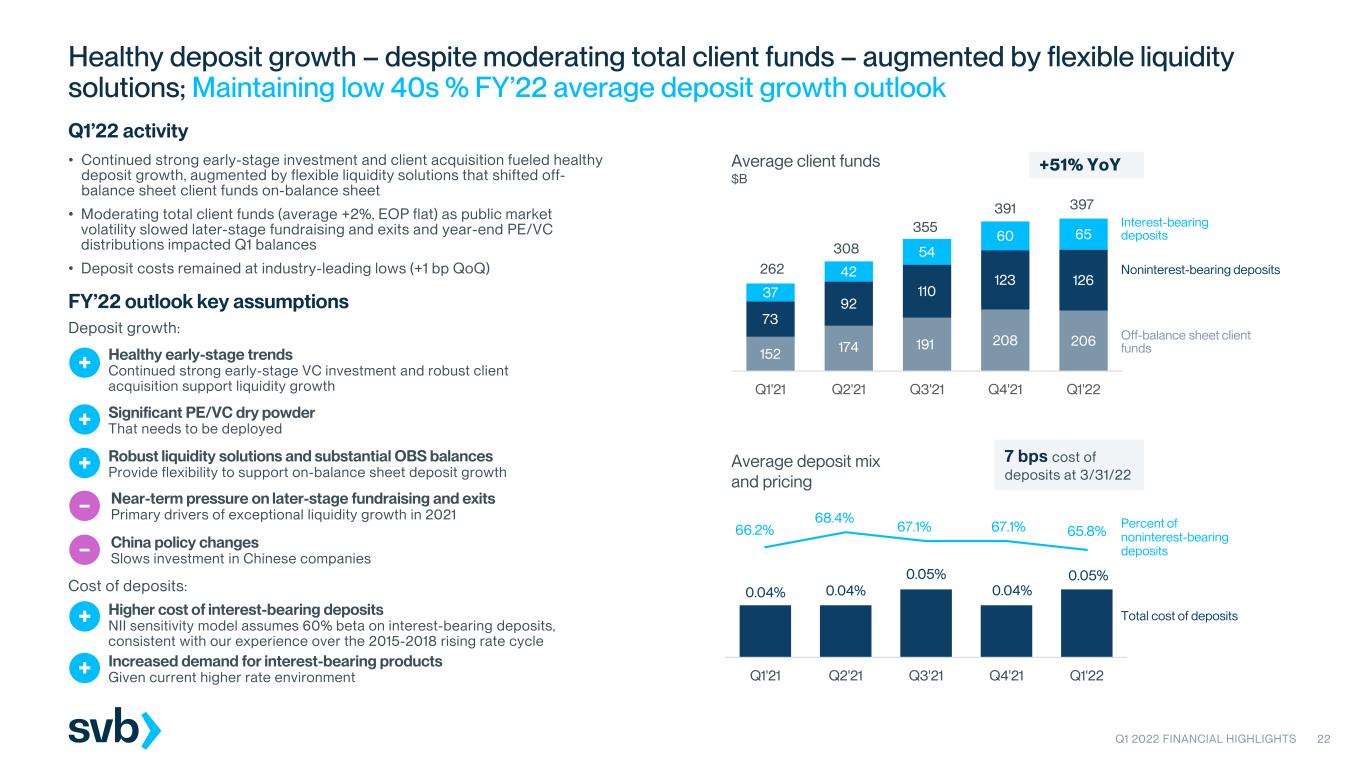
Q1 2022 FINANCIAL HIGHLIGHTS 22 Healthy deposit growth – despite moderating total client funds – augmented by flexible liquidity solutions; Maintaining low 40s % FY’22 average deposit growth outlook Average client funds $B • Continued strong early-stage investment and client acquisition fueled healthy deposit growth, augmented by flexible liquidity solutions that shifted off- balance sheet client funds on-balance sheet • Moderating total client funds (average +2%, EOP flat) as public market volatility slowed later-stage fundraising and exits and year-end PE/VC distributions impacted Q1 balances • Deposit costs remained at industry-leading lows (+1 bp QoQ) Q1’22 activity Healthy early-stage trends Continued strong early-stage VC investment and robust client acquisition support liquidity growth + China policy changes Slows investment in Chinese companies– Deposit growth: FY’22 outlook key assumptions Average deposit mix and pricing 152 174 191 208 206 73 92 110 123 126 37 42 54 60 65 262 308 355 391 397 Q1'21 Q2'21 Q3'21 Q4'21 Q1'22 0.04% 0.04% 0.05% 0.04% 0.05% 66.2% 68.4% 67.1% 67.1% 65.8% 50% 52% 54% 56% 58% 60% 62% 64% 66% 68% 70% 0.00% 0.02% 0.04% 0.06% 0.08% 0.10% Q1'21 Q2'21 Q3'21 Q4'21 Q1'22 Off-balance sheet client funds Noninterest-bearing deposits Interest-bearing deposits Percent of noninterest-bearing deposits Total cost of deposits +51% YoY Robust liquidity solutions and substantial OBS balances Provide flexibility to support on-balance sheet deposit growth+ Near-term pressure on later-stage fundraising and exits Primary drivers of exceptional liquidity growth in 2021– 7 bps cost of deposits at 3/31/22 Significant PE/VC dry powder That needs to be deployed+ Cost of deposits: Increased demand for interest-bearing products Given current higher rate environment+ Higher cost of interest-bearing deposits NII sensitivity model assumes 60% beta on interest-bearing deposits, consistent with our experience over the 2015-2018 rising rate cycle +
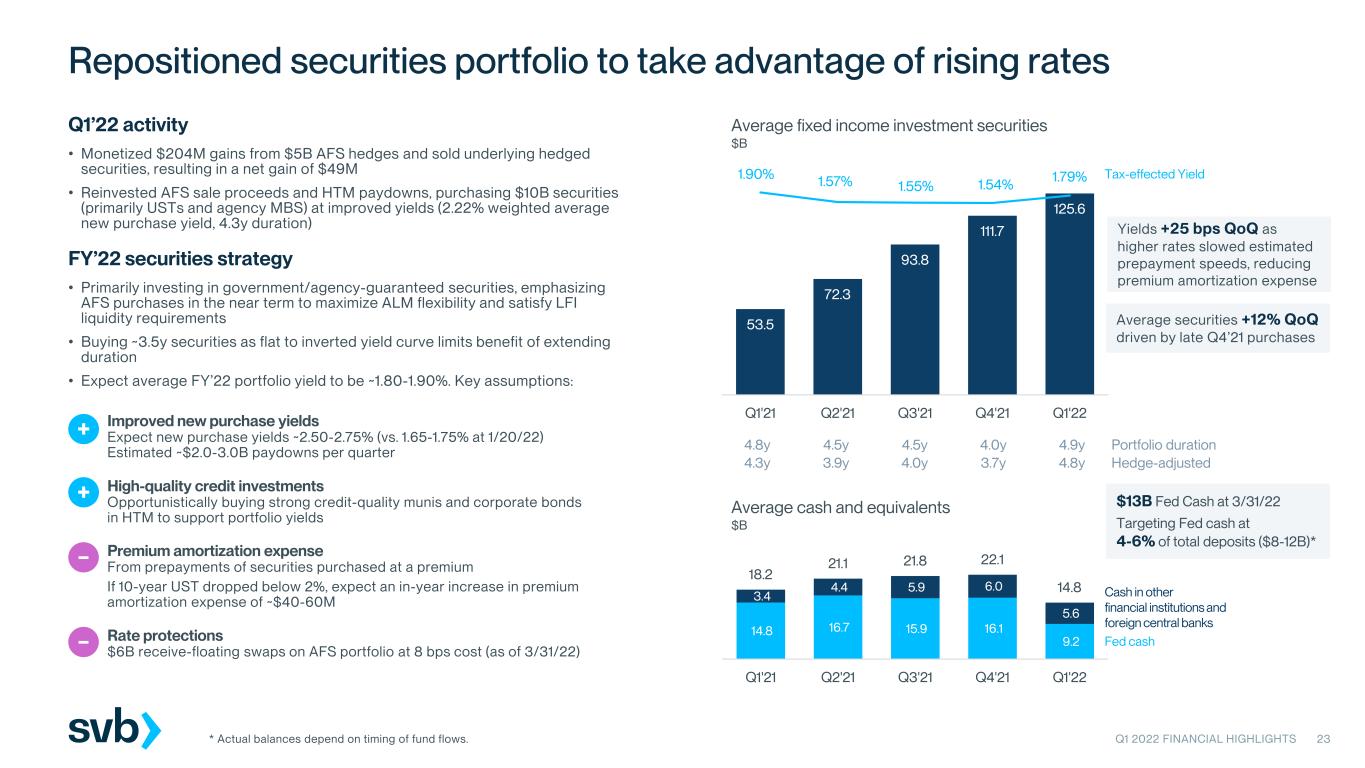
53.5 72.3 93.8 111.7 125.6 1.90% 1.57% 1.55% 1.54% 1.79% 0.0 20.0 40.0 60.0 80.0 100.0 120.0 140.0 Q1'21 Q2'21 Q3'21 Q4'21 Q1'22 14.8 16.7 15.9 16.1 9.2 3.4 4.4 5.9 6.0 5.6 18.2 21.1 21.8 22.1 14.8 Q1'21 Q2'21 Q3'21 Q4'21 Q1'22 Q1 2022 FINANCIAL HIGHLIGHTS 23 Repositioned securities portfolio to take advantage of rising rates * Actual balances depend on timing of fund flows. Average fixed income investment securities $B • Monetized $204M gains from $5B AFS hedges and sold underlying hedged securities, resulting in a net gain of $49M • Reinvested AFS sale proceeds and HTM paydowns, purchasing $10B securities (primarily USTs and agency MBS) at improved yields (2.22% weighted average new purchase yield, 4.3y duration) Q1’22 activity Improved new purchase yields Expect new purchase yields ~2.50-2.75% (vs. 1.65-1.75% at 1/20/22) Estimated ~$2.0-3.0B paydowns per quarter + High-quality credit investments Opportunistically buying strong credit-quality munis and corporate bonds in HTM to support portfolio yields + Average cash and equivalents $B Tax-effected Yield Yields +25 bps QoQ as higher rates slowed estimated prepayment speeds, reducing premium amortization expense• Primarily investing in government/agency-guaranteed securities, emphasizing AFS purchases in the near term to maximize ALM flexibility and satisfy LFI liquidity requirements • Buying ~3.5y securities as flat to inverted yield curve limits benefit of extending duration • Expect average FY’22 portfolio yield to be ~1.80-1.90%. Key assumptions: FY’22 securities strategy 4.8y 4.5y 4.5y 4.0y 4.9y Portfolio duration 4.3y 3.9y 4.0y 3.7y 4.8y Hedge-adjusted Fed cash Cash in other financial institutions and foreign central banks $13B Fed Cash at 3/31/22 Targeting Fed cash at 4-6% of total deposits ($8-12B)* Average securities +12% QoQ driven by late Q4’21 purchases Premium amortization expense From prepayments of securities purchased at a premium If 10-year UST dropped below 2%, expect an in-year increase in premium amortization expense of ~$40-60M – Rate protections $6B receive-floating swaps on AFS portfolio at 8 bps cost (as of 3/31/22) –
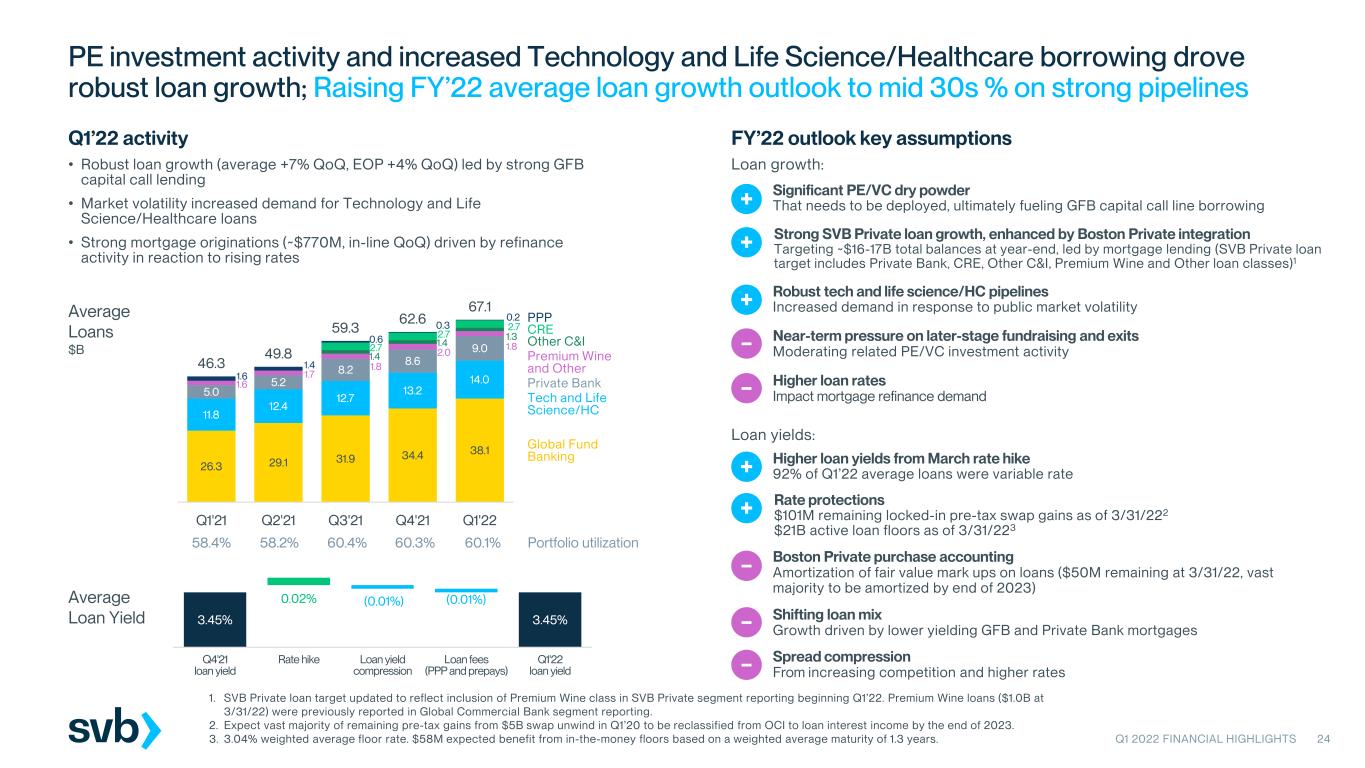
26.3 29.1 31.9 34.4 38.1 11.8 12.4 12.7 13.2 14.0 5.0 5.2 8.2 8.6 9.0 1.6 1.7 1.8 2.0 1.8 1.4 1.4 1.3 2.7 2.7 2.7 1.6 1.4 0.6 0.3 0.2 46.3 49.8 59.3 62.6 67.1 Q1'21 Q2'21 Q3'21 Q4'21 Q1'22 PE investment activity and increased Technology and Life Science/Healthcare borrowing drove robust loan growth; Raising FY’22 average loan growth outlook to mid 30s % on strong pipelines Average Loans $B • Robust loan growth (average +7% QoQ, EOP +4% QoQ) led by strong GFB capital call lending • Market volatility increased demand for Technology and Life Science/Healthcare loans • Strong mortgage originations (~$770M, in-line QoQ) driven by refinance activity in reaction to rising rates Loan growth: Boston Private purchase accounting Amortization of fair value mark ups on loans ($50M remaining at 3/31/22, vast majority to be amortized by end of 2023) – Strong SVB Private loan growth, enhanced by Boston Private integration Targeting ~$16-17B total balances at year-end, led by mortgage lending (SVB Private loan target includes Private Bank, CRE, Other C&I, Premium Wine and Other loan classes)1 + Significant PE/VC dry powder That needs to be deployed, ultimately fueling GFB capital call line borrowing+ Robust tech and life science/HC pipelines Increased demand in response to public market volatility+ Q1’22 activity FY’22 outlook key assumptions 3.45% 3.45% (0.01%) (0.01%)0.02% Q4'21 loan yield Rate hike Loan yield compression Loan fees (PPP and prepays) Q1'22 loan yield Global Fund Banking Private Bank PPP Premium Wine and Other Tech and Life Science/HC Average Loan Yield CRE Other C&I Loan yields: Shifting loan mix Growth driven by lower yielding GFB and Private Bank mortgages– Spread compression From increasing competition and higher rates– Rate protections $101M remaining locked-in pre-tax swap gains as of 3/31/222 $21B active loan floors as of 3/31/223 + 1. SVB Private loan target updated to reflect inclusion of Premium Wine class in SVB Private segment reporting beginning Q1’22. Premium Wine loans ($1.0B at 3/31/22) were previously reported in Global Commercial Bank segment reporting. 2. Expect vast majority of remaining pre-tax gains from $5B swap unwind in Q1’20 to be reclassified from OCI to loan interest income by the end of 2023. 3. 3.04% weighted average floor rate. $58M expected benefit from in-the-money floors based on a weighted average maturity of 1.3 years. 58.4% 58.2% 60.4% 60.3% 60.1% Portfolio utilization Higher loan yields from March rate hike 92% of Q1’22 average loans were variable rate+ Higher loan rates Impact mortgage refinance demand– Q1 2022 FINANCIAL HIGHLIGHTS 24 Near-term pressure on later-stage fundraising and exits Moderating related PE/VC investment activity–
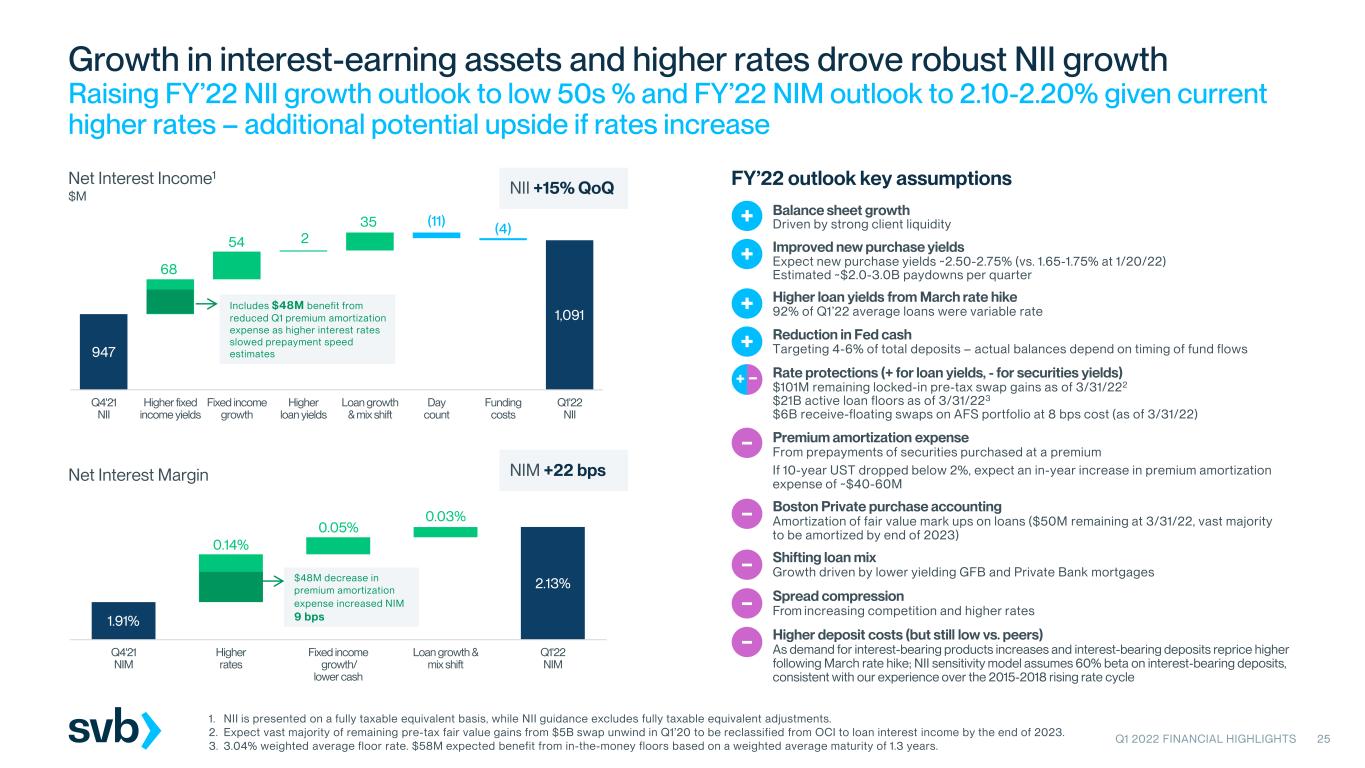
947 1,091 (11) (4) 68 54 2 35 Q4'21 NII Higher fixed income yields Fixed income growth Higher loan yields Loan growth & mix shift Day count Funding costs Q1'22 NII Q1 2022 FINANCIAL HIGHLIGHTS 25 Growth in interest-earning assets and higher rates drove robust NII growth Raising FY’22 NII growth outlook to low 50s % and FY’22 NIM outlook to 2.10-2.20% given current higher rates – additional potential upside if rates increase Shifting loan mix Growth driven by lower yielding GFB and Private Bank mortgages– FY’22 outlook key assumptionsNet Interest Income1 $M NII +15% QoQ Net Interest Margin 1.91% 2.13% 0.14% 0.05% 0.03% Q4'21 NIM Higher rates Fixed income growth/ lower cash Loan growth & mix shift Q1'22 NIM 1. NII is presented on a fully taxable equivalent basis, while NII guidance excludes fully taxable equivalent adjustments. 2. Expect vast majority of remaining pre-tax fair value gains from $5B swap unwind in Q1’20 to be reclassified from OCI to loan interest income by the end of 2023. 3. 3.04% weighted average floor rate. $58M expected benefit from in-the-money floors based on a weighted average maturity of 1.3 years. Reduction in Fed cash Targeting 4-6% of total deposits – actual balances depend on timing of fund flows+ Improved new purchase yields Expect new purchase yields ~2.50-2.75% (vs. 1.65-1.75% at 1/20/22) Estimated ~$2.0-3.0B paydowns per quarter + Spread compression From increasing competition and higher rates– Balance sheet growth Driven by strong client liquidity+ Higher loan yields from March rate hike 92% of Q1’22 average loans were variable rate+ + – Rate protections (+ for loan yields, - for securities yields) $101M remaining locked-in pre-tax swap gains as of 3/31/222 $21B active loan floors as of 3/31/223 $6B receive-floating swaps on AFS portfolio at 8 bps cost (as of 3/31/22) Boston Private purchase accounting Amortization of fair value mark ups on loans ($50M remaining at 3/31/22, vast majority to be amortized by end of 2023) – Higher deposit costs (but still low vs. peers) As demand for interest-bearing products increases and interest-bearing deposits reprice higher following March rate hike; NII sensitivity model assumes 60% beta on interest-bearing deposits, consistent with our experience over the 2015-2018 rising rate cycle – NIM +22 bps Includes $48M benefit from reduced Q1 premium amortization expense as higher interest rates slowed prepayment speed estimates Premium amortization expense From prepayments of securities purchased at a premium If 10-year UST dropped below 2%, expect an in-year increase in premium amortization expense of ~$40-60M – $48M decrease in premium amortization expense increased NIM 9 bps
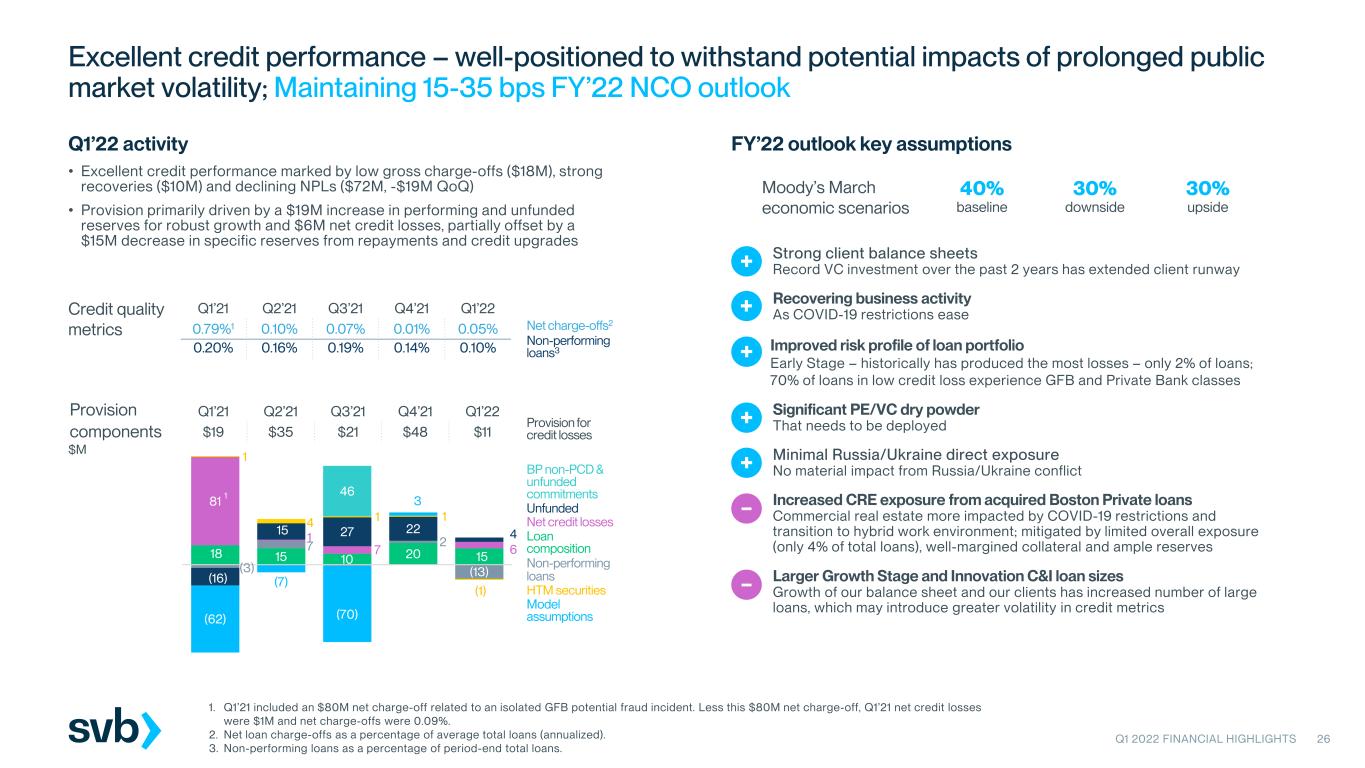
Q1 2022 FINANCIAL HIGHLIGHTS 26 Excellent credit performance – well-positioned to withstand potential impacts of prolonged public market volatility; Maintaining 15-35 bps FY’22 NCO outlook • Excellent credit performance marked by low gross charge-offs ($18M), strong recoveries ($10M) and declining NPLs ($72M, -$19M QoQ) • Provision primarily driven by a $19M increase in performing and unfunded reserves for robust growth and $6M net credit losses, partially offset by a $15M decrease in specific reserves from repayments and credit upgrades Q1’22 activity FY’22 outlook key assumptions Credit quality metrics Provision components $M Q1’21 Q2’21 Q3’21 Q4’21 Q1’22 0.79%1 0.10% 0.07% 0.01% 0.05% 0.20% 0.16% 0.19% 0.14% 0.10% Non-performing loans3 Net charge-offs2 18 15 10 20 15 (3) 7 2 (13) 81 1 7 6 (16) 15 27 22 4 1 4 1 1 (1) 46 (62) (7) (70) 3 Q1'21 Q2'21 Q3'21 Q4'21 Q1'22 Non-performing loans Loan composition Model assumptions Unfunded Net credit losses HTM securities BP non-PCD & unfunded commitments Q1’21 Q2’21 Q3’21 Q4’21 Q1’22 $19 $35 $21 $48 $11 40% baseline 30% downside 30% upside Provision for credit losses Moody’s March economic scenarios 1. Q1’21 included an $80M net charge-off related to an isolated GFB potential fraud incident. Less this $80M net charge-off, Q1’21 net credit losses were $1M and net charge-offs were 0.09%. 2. Net loan charge-offs as a percentage of average total loans (annualized). 3. Non-performing loans as a percentage of period-end total loans. Strong client balance sheets Record VC investment over the past 2 years has extended client runway+ Larger Growth Stage and Innovation C&I loan sizes Growth of our balance sheet and our clients has increased number of large loans, which may introduce greater volatility in credit metrics – Significant PE/VC dry powder That needs to be deployed+ Improved risk profile of loan portfolio Early Stage – historically has produced the most losses – only 2% of loans; 70% of loans in low credit loss experience GFB and Private Bank classes + Increased CRE exposure from acquired Boston Private loans Commercial real estate more impacted by COVID-19 restrictions and transition to hybrid work environment; mitigated by limited overall exposure (only 4% of total loans), well-margined collateral and ample reserves – Minimal Russia/Ukraine direct exposure No material impact from Russia/Ukraine conflict+ Recovering business activity As COVID-19 restrictions ease+ 1
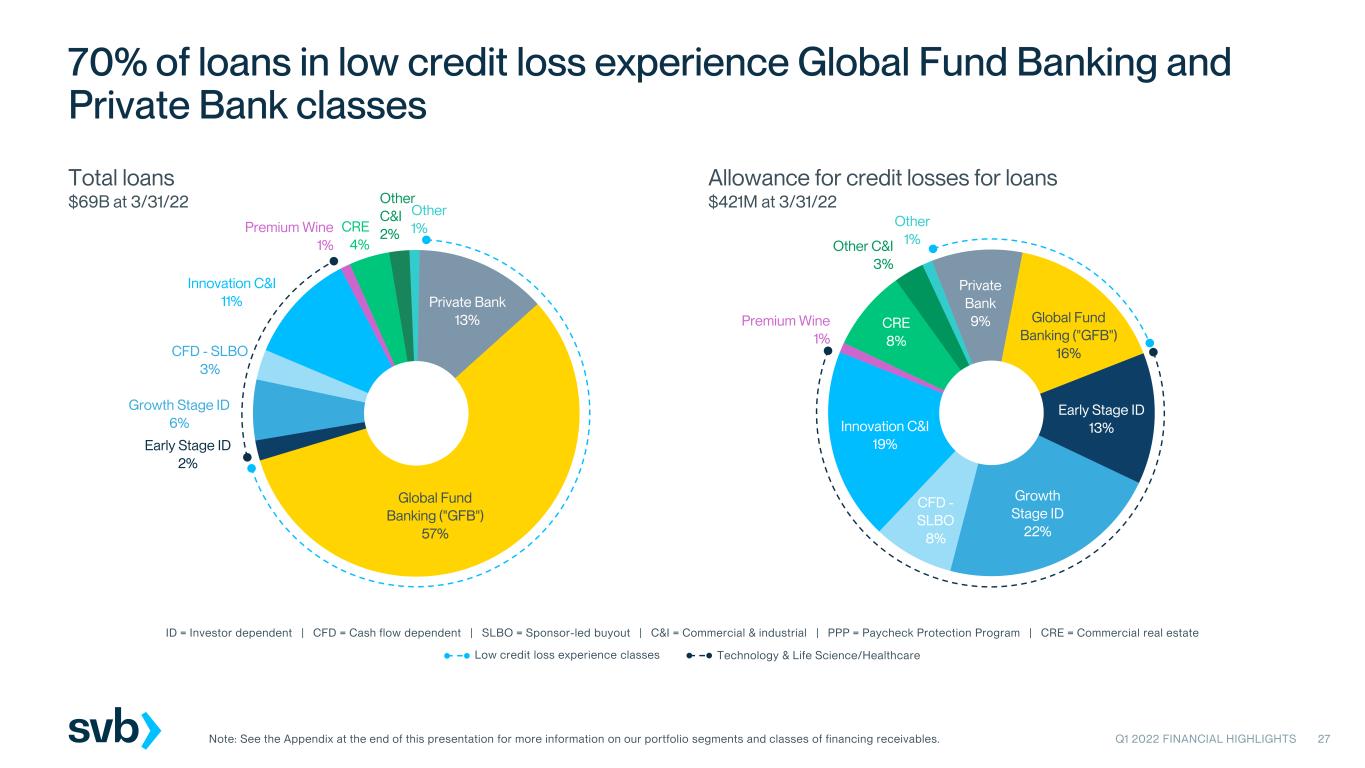
Global Fund Banking ("GFB") 57% Early Stage ID 2% Growth Stage ID 6% CFD - SLBO 3% Innovation C&I 11% Premium Wine 1% CRE 4% Other C&I 2% Other 1% Private Bank 13% 70% of loans in low credit loss experience Global Fund Banking and Private Bank classes Total loans $69B at 3/31/22 Global Fund Banking ("GFB") 16% Early Stage ID 13% Growth Stage ID 22% CFD - SLBO 8% Innovation C&I 19% Premium Wine 1% CRE 8% Other C&I 3% Other 1% Private Bank 9% Note: See the Appendix at the end of this presentation for more information on our portfolio segments and classes of financing receivables. Q1 2022 FINANCIAL HIGHLIGHTS 27 Allowance for credit losses for loans $421M at 3/31/22 ID = Investor dependent | CFD = Cash flow dependent | SLBO = Sponsor-led buyout | C&I = Commercial & industrial | PPP = Paycheck Protection Program | CRE = Commercial real estate Low credit loss experience classes Technology & Life Science/Healthcare
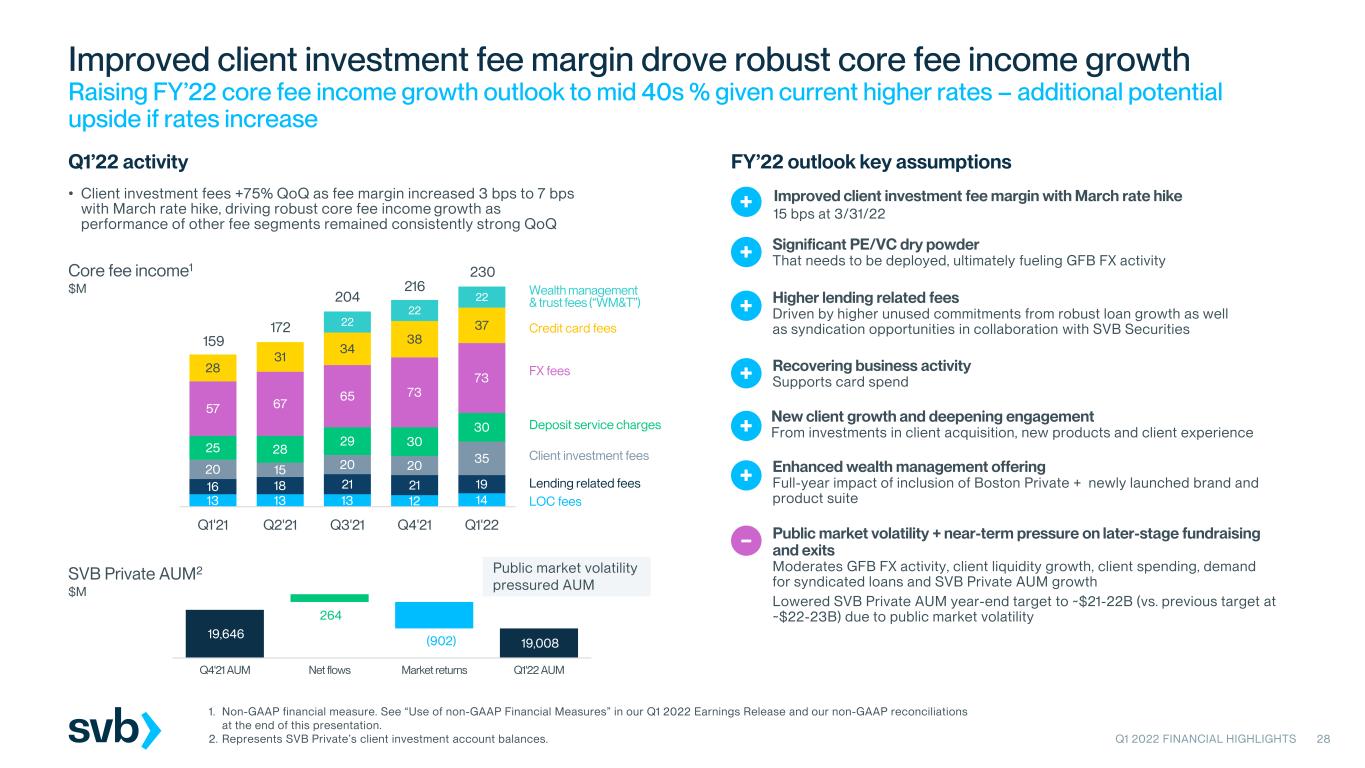
13 13 13 12 14 16 18 21 21 19 20 15 20 20 35 25 28 29 30 30 57 67 65 73 73 28 31 34 38 3722 22 22 0 0 0 0 0 0 Q1'21 Q2'21 Q3'21 Q4'21 Q1'22 Q1 2022 FINANCIAL HIGHLIGHTS 28 Improved client investment fee margin drove robust core fee income growth Raising FY’22 core fee income growth outlook to mid 40s % given current higher rates – additional potential upside if rates increase Core fee income1 $M • Client investment fees +75% QoQ as fee margin increased 3 bps to 7 bps with March rate hike, driving robust core fee income growth as performance of other fee segments remained consistently strong QoQ Recovering business activity Supports card spend+ New client growth and deepening engagement From investments in client acquisition, new products and client experience+ Enhanced wealth management offering Full-year impact of inclusion of Boston Private + newly launched brand and product suite + Improved client investment fee margin with March rate hike 15 bps at 3/31/22 + Higher lending related fees Driven by higher unused commitments from robust loan growth as well as syndication opportunities in collaboration with SVB Securities + Significant PE/VC dry powder That needs to be deployed, ultimately fueling GFB FX activity+ Lending related fees Deposit service charges Credit card fees LOC fees FX fees Wealth management & trust fees (“WM&T”) 159 172 204 216 Q1’22 activity FY’22 outlook key assumptions 1. Non-GAAP financial measure. See “Use of non-GAAP Financial Measures” in our Q1 2022 Earnings Release and our non-GAAP reconciliations at the end of this presentation. 2. Represents SVB Private’s client investment account balances. 230 Client investment fees SVB Private AUM2 $M 19,646 19,008 (902) 264 Q4'21 AUM Net flows Market returns Q1'22 AUM Public market volatility + near-term pressure on later-stage fundraising and exits Moderates GFB FX activity, client liquidity growth, client spending, demand for syndicated loans and SVB Private AUM growth Lowered SVB Private AUM year-end target to ~$21-22B (vs. previous target at ~$22-23B) due to public market volatility – Public market volatility pressured AUM
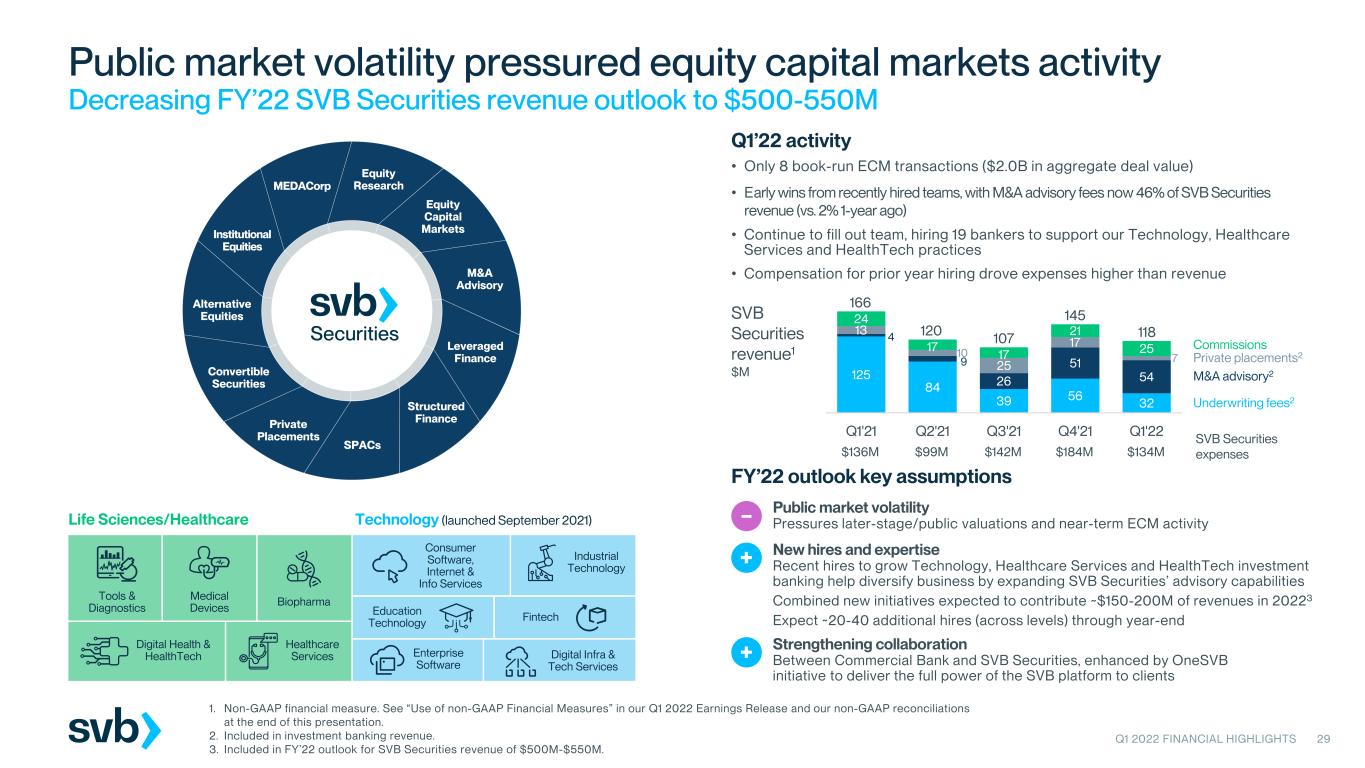
125 84 39 56 32 4 9 26 51 54 13 10 25 17 7 24 17 17 21 25 166 120 107 145 118 Q1'21 Q2'21 Q3'21 Q4'21 Q1'22 SVB Securities expenses • Only 8 book-run ECM transactions ($2.0B in aggregate deal value) • Early wins from recently hired teams, with M&A advisory fees now 46% of SVB Securities revenue (vs. 2% 1-year ago) • Continue to fill out team, hiring 19 bankers to support our Technology, Healthcare Services and HealthTech practices • Compensation for prior year hiring drove expenses higher than revenue Q1 2022 FINANCIAL HIGHLIGHTS 29 Public market volatility pressured equity capital markets activity Decreasing FY’22 SVB Securities revenue outlook to $500-550M 1. Non-GAAP financial measure. See “Use of non-GAAP Financial Measures” in our Q1 2022 Earnings Release and our non-GAAP reconciliations at the end of this presentation. 2. Included in investment banking revenue. 3. Included in FY’22 outlook for SVB Securities revenue of $500M-$550M. New hires and expertise Recent hires to grow Technology, Healthcare Services and HealthTech investment banking help diversify business by expanding SVB Securities’ advisory capabilities Combined new initiatives expected to contribute ~$150-200M of revenues in 20223 Expect ~20-40 additional hires (across levels) through year-end + FY’22 outlook key assumptions Q1’22 activity SVB Securities revenue1 $M $136M $99M $142M $184M $134M Equity Capital Markets Convertible Securities Alternative Equities Institutional Equities MEDACorp M&A Advisory Equity Research Leveraged Finance Structured Finance SPACs Private Placements Technology (launched September 2021)Life Sciences/Healthcare Tools & Diagnostics Medical Devices Biopharma Healthcare Services Digital Health & HealthTech Education Technology Industrial Technology Enterprise Software Digital Infra & Tech Services Fintech Consumer Software, Internet & Info Services Public market volatility Pressures later-stage/public valuations and near-term ECM activity– Strengthening collaboration Between Commercial Bank and SVB Securities, enhanced by OneSVB initiative to deliver the full power of the SVB platform to clients + Underwriting fees2 M&A advisory2 Commissions Private placements2
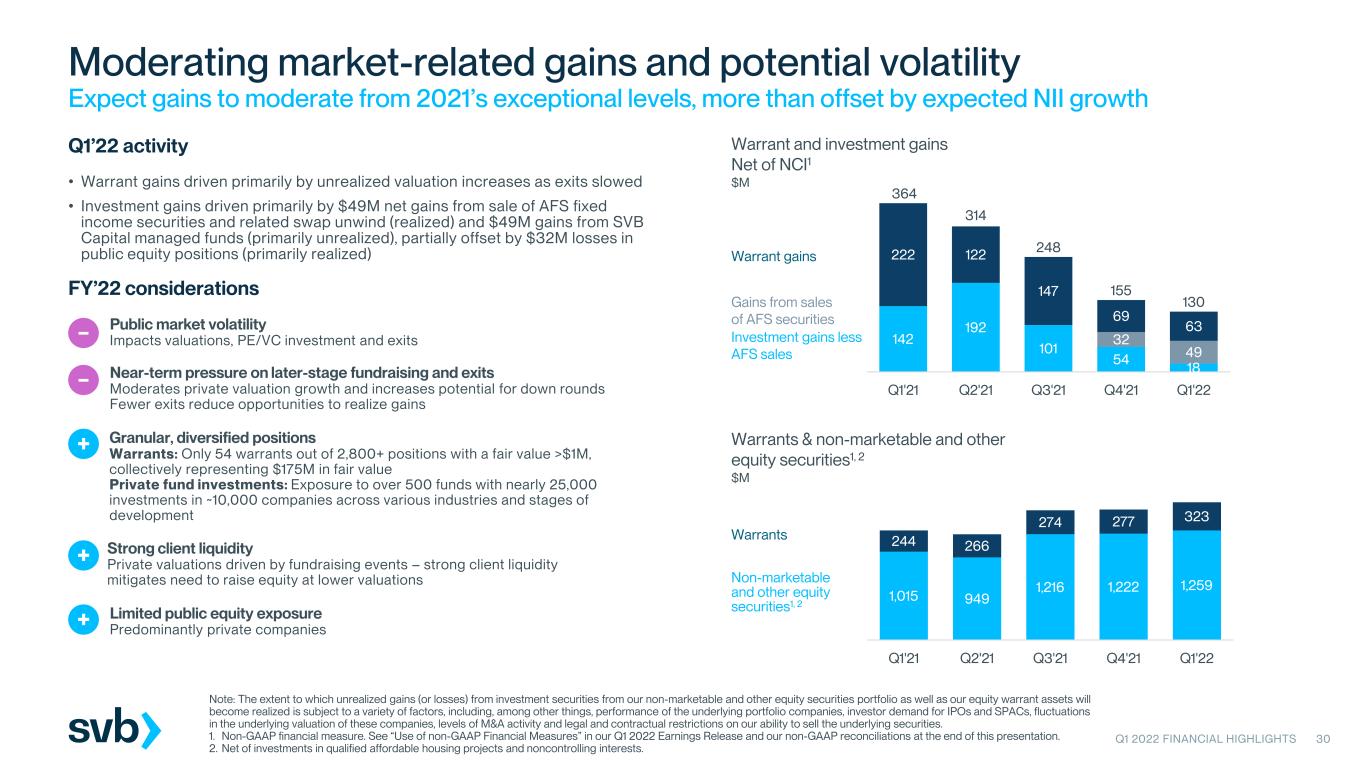
142 192 101 54 18 32 49 222 122 147 69 63 364 314 248 155 130 Q1'21 Q2'21 Q3'21 Q4'21 Q1'22 1,015 949 1,216 1,222 1,259 244 266 274 277 323 Q1'21 Q2'21 Q3'21 Q4'21 Q1'22 Q1 2022 FINANCIAL HIGHLIGHTS 30 Moderating market-related gains and potential volatility Expect gains to moderate from 2021’s exceptional levels, more than offset by expected NII growth Note: The extent to which unrealized gains (or losses) from investment securities from our non-marketable and other equity securities portfolio as well as our equity warrant assets will become realized is subject to a variety of factors, including, among other things, performance of the underlying portfolio companies, investor demand for IPOs and SPACs, fluctuations in the underlying valuation of these companies, levels of M&A activity and legal and contractual restrictions on our ability to sell the underlying securities. 1. Non-GAAP financial measure. See “Use of non-GAAP Financial Measures” in our Q1 2022 Earnings Release and our non-GAAP reconciliations at the end of this presentation. 2. Net of investments in qualified affordable housing projects and noncontrolling interests. Warrant and investment gains Net of NCI1 $M• Warrant gains driven primarily by unrealized valuation increases as exits slowed • Investment gains driven primarily by $49M net gains from sale of AFS fixed income securities and related swap unwind (realized) and $49M gains from SVB Capital managed funds (primarily unrealized), partially offset by $32M losses in public equity positions (primarily realized) Q1’22 activity Public market volatility Impacts valuations, PE/VC investment and exits– FY’22 considerations Warrants & non-marketable and other equity securities1, 2 $M Warrant gains Investment gains less AFS sales Warrants Non-marketable and other equity securities1, 2 Near-term pressure on later-stage fundraising and exits Moderates private valuation growth and increases potential for down rounds Fewer exits reduce opportunities to realize gains – Strong client liquidity Private valuations driven by fundraising events – strong client liquidity mitigates need to raise equity at lower valuations + Limited public equity exposure Predominantly private companies+ Granular, diversified positions Warrants: Only 54 warrants out of 2,800+ positions with a fair value >$1M, collectively representing $175M in fair value Private fund investments: Exposure to over 500 funds with nearly 25,000 investments in ~10,000 companies across various industries and stages of development + Gains from sales of AFS securities
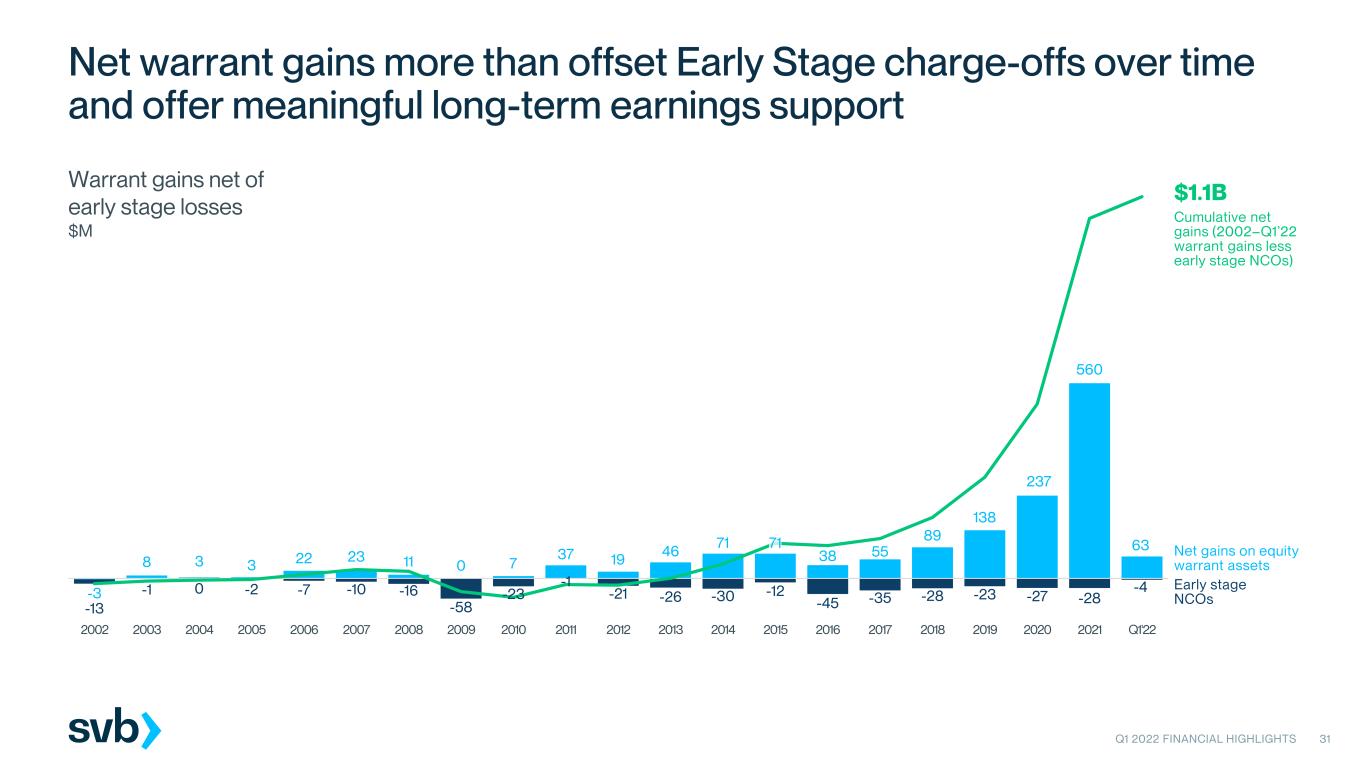
-3 8 3 3 22 23 11 0 7 37 19 46 71 71 38 55 89 138 237 560 63 -13 -1 0 -2 -7 -10 -16 -58 -23 -1 -21 -26 -30 -12 -45 -35 -28 -23 -27 -28 -4 2002 2003 2004 2005 2006 2007 2008 2009 2010 2011 2012 2013 2014 2015 2016 2017 2018 2019 2020 2021 Q1'22 Q1 2022 FINANCIAL HIGHLIGHTS 31 Net warrant gains more than offset Early Stage charge-offs over time and offer meaningful long-term earnings support Net gains on equity warrant assets Cumulative net gains (2002–Q1’22 warrant gains less early stage NCOs) Early stage NCOs $1.1BWarrant gains net of early stage losses $M
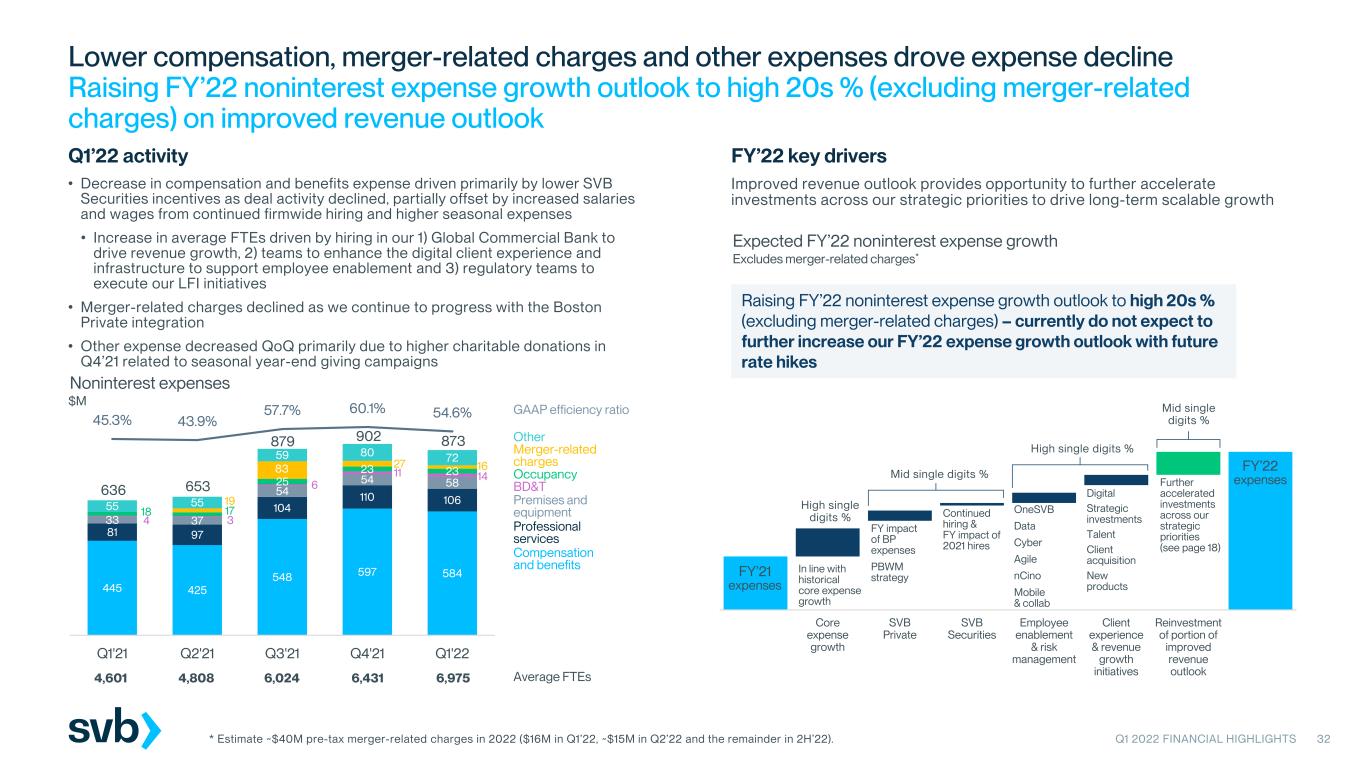
Core expense growth SVB Private SVB Securities Employee enablement & risk management Client experience & revenue growth initiatives Reinvestment of portion of improved revenue outlook FY’22 expenses FY’21 expenses Continued hiring & FY impact of 2021 hires FY impact of BP expenses PBWM strategy High single digits % Mid single digits % High single digits % In line with historical core expense growth OneSVB Data Cyber Agile nCino Mobile & collab Digital Strategic investments Talent Client acquisition New products Q1 2022 FINANCIAL HIGHLIGHTS 32 Lower compensation, merger-related charges and other expenses drove expense decline Raising FY’22 noninterest expense growth outlook to high 20s % (excluding merger-related charges) on improved revenue outlook * Estimate ~$40M pre-tax merger-related charges in 2022 ($16M in Q1’22, ~$15M in Q2’22 and the remainder in 2H’22). • Decrease in compensation and benefits expense driven primarily by lower SVB Securities incentives as deal activity declined, partially offset by increased salaries and wages from continued firmwide hiring and higher seasonal expenses • Increase in average FTEs driven by hiring in our 1) Global Commercial Bank to drive revenue growth, 2) teams to enhance the digital client experience and infrastructure to support employee enablement and 3) regulatory teams to execute our LFI initiatives • Merger-related charges declined as we continue to progress with the Boston Private integration • Other expense decreased QoQ primarily due to higher charitable donations in Q4’21 related to seasonal year-end giving campaigns Improved revenue outlook provides opportunity to further accelerate investments across our strategic priorities to drive long-term scalable growth Q1’22 activity FY’22 key drivers Noninterest expenses $M 445 425 548 597 584 81 97 104 110 106 33 37 54 54 58 4 3 6 11 14 18 17 25 23 23 19 83 27 16 55 55 59 80 72 636 653 879 902 873 45.3% 43.9% 57.7% 60.1% 54.6% 0 100 200 300 400 500 600 700 800 900 1000 Q1'21 Q2'21 Q3'21 Q4'21 Q1'22 4,601 4,808 6,024 6,431 6,975 GAAP efficiency ratio Other Occupancy BD&T Premises and equipment Professional services Compensation and benefits Average FTEs Merger-related charges Expected FY’22 noninterest expense growth Excludes merger-related charges* Raising FY’22 noninterest expense growth outlook to high 20s % (excluding merger-related charges) – currently do not expect to further increase our FY’22 expense growth outlook with future rate hikes Mid single digits % Further accelerated investments across our strategic priorities (see page 18)
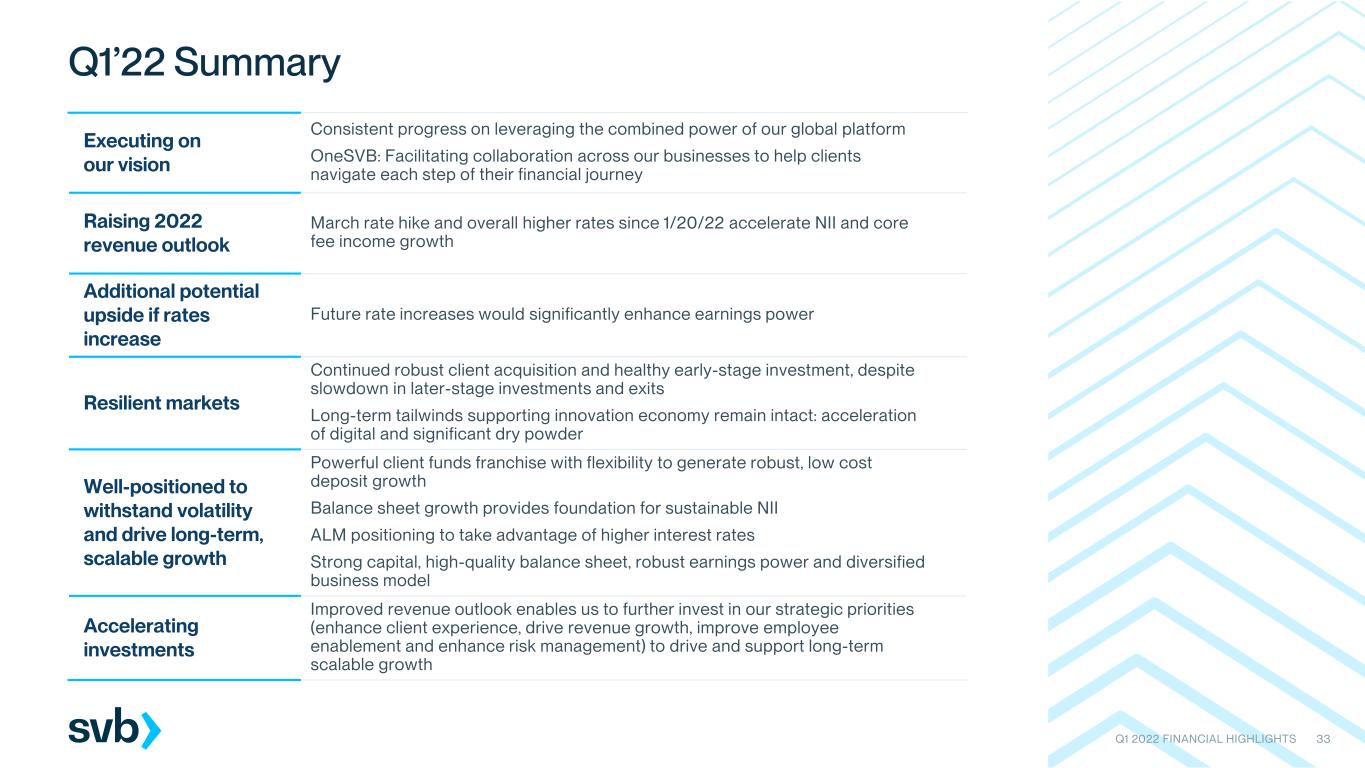
Q1 2022 FINANCIAL HIGHLIGHTS 33 Q1’22 Summary Executing on our vision Consistent progress on leveraging the combined power of our global platform OneSVB: Facilitating collaboration across our businesses to help clients navigate each step of their financial journey Raising 2022 revenue outlook March rate hike and overall higher rates since 1/20/22 accelerate NII and core fee income growth Additional potential upside if rates increase Future rate increases would significantly enhance earnings power Resilient markets Continued robust client acquisition and healthy early-stage investment, despite slowdown in later-stage investments and exits Long-term tailwinds supporting innovation economy remain intact: acceleration of digital and significant dry powder Well-positioned to withstand volatility and drive long-term, scalable growth Powerful client funds franchise with flexibility to generate robust, low cost deposit growth Balance sheet growth provides foundation for sustainable NII ALM positioning to take advantage of higher interest rates Strong capital, high-quality balance sheet, robust earnings power and diversified business model Accelerating investments Improved revenue outlook enables us to further invest in our strategic priorities (enhance client experience, drive revenue growth, improve employee enablement and enhance risk management) to drive and support long-term scalable growth

Appendix Q1 2022 FINANCIAL HIGHLIGHTS 34

Q1 2022 FINANCIAL HIGHLIGHTS 35 The financial partner of the global innovation economy Q1’22 U.S. venture- backed technology and life science companies Nearly half Unparalleled access, connections and insights to increase our clients’ probability of success Q1’22 U.S. venture- backed technology and healthcare IPOs Deep sector expertise Comprehensive solutions PRIVATE BANKING & WEALTH MANAGEMENT GLOBAL COMMERCIAL BANKING INVESTMENT SOLUTIONS FUNDS MANAGEMENT RESEARCH & INSIGHTS INVESTMENT BANKINGENTERPRISE SOFTWARE CONSUMER INTERNET LIFE SCIENCE & HEALTHCARE PREMIUM WINE PRIVATE EQUITY & VENTURE CAPITAL HARDWARE & FRONTIER TECH FINTECHCLIMATE TECH Technology & Life Sciences/Healthcare Corporate Banking Revenue >$75M Startup (Early-Stage) Revenue <$5M Venture- Funded Revenue $5M–$75M Investors Private Equity Venture Capital Individuals Entrepreneurs, Investors, Executives We bank: We help individuals, investors and the world’s most innovative companies achieve their ambitious goals 43%
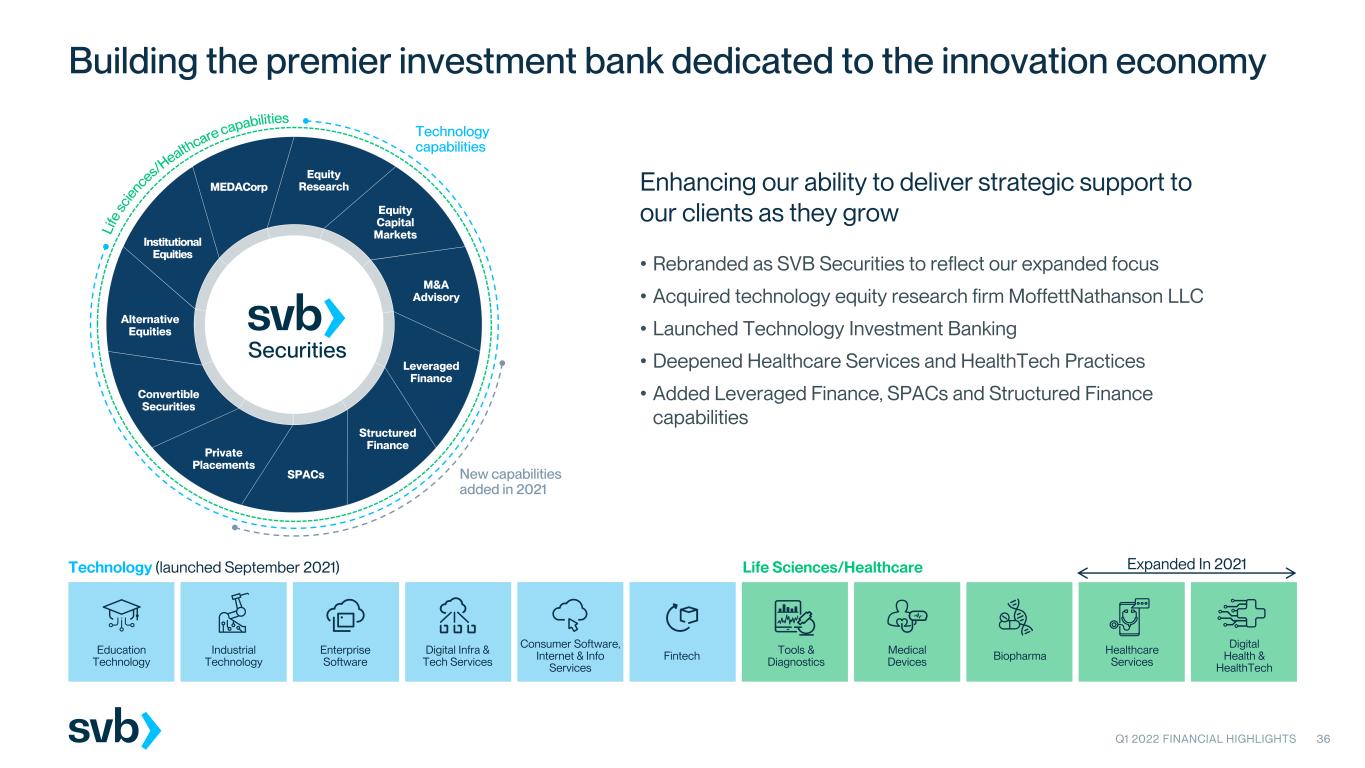
Equity Capital Markets Convertible Securities Alternative Equities Institutional Equities MEDACorp M&A Advisory Equity Research Leveraged Finance Structured Finance SPACs Private Placements New capabilities added in 2021 Technology capabilities Q1 2022 FINANCIAL HIGHLIGHTS 36 Building the premier investment bank dedicated to the innovation economy • Rebranded as SVB Securities to reflect our expanded focus • Acquired technology equity research firm MoffettNathanson LLC • Launched Technology Investment Banking • Deepened Healthcare Services and HealthTech Practices • Added Leveraged Finance, SPACs and Structured Finance capabilities Life Sciences/Healthcare Expanded In 2021Technology (launched September 2021) Education Technology Industrial Technology Enterprise Software Digital Infra & Tech Services Consumer Software, Internet & Info Services Fintech Tools & Diagnostics Medical Devices Biopharma Healthcare Services Digital Health & HealthTech Enhancing our ability to deliver strategic support to our clients as they grow
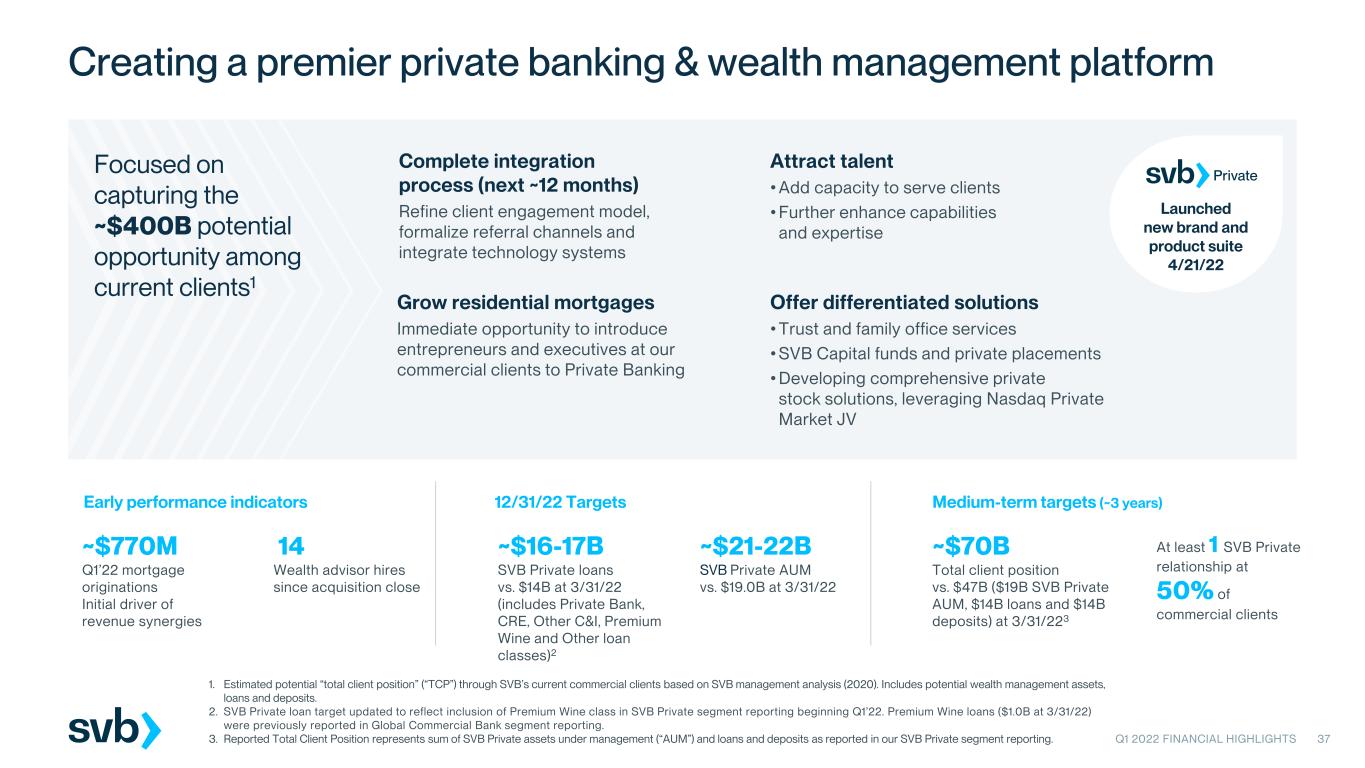
Q1 2022 FINANCIAL HIGHLIGHTS 37 Creating a premier private banking & wealth management platform Focused on capturing the ~$400B potential opportunity among current clients1 1. Estimated potential “total client position” (“TCP”) through SVB’s current commercial clients based on SVB management analysis (2020). Includes potential wealth management assets, loans and deposits. 2. SVB Private loan target updated to reflect inclusion of Premium Wine class in SVB Private segment reporting beginning Q1’22. Premium Wine loans ($1.0B at 3/31/22) were previously reported in Global Commercial Bank segment reporting. 3. Reported Total Client Position represents sum of SVB Private assets under management (“AUM”) and loans and deposits as reported in our SVB Private segment reporting. ~$70B Total client position vs. $47B ($19B SVB Private AUM, $14B loans and $14B deposits) at 3/31/223 At least 1 SVB Private relationship at 50% of commercial clients ~$770M Q1’22 mortgage originations Initial driver of revenue synergies 14 Wealth advisor hires since acquisition close Early performance indicators Medium-term targets (~3 years)12/31/22 Targets ~$16-17B SVB Private loans vs. $14B at 3/31/22 (includes Private Bank, CRE, Other C&I, Premium Wine and Other loan classes)2 ~$21-22B SVB Private AUM vs. $19.0B at 3/31/22 Grow residential mortgages Immediate opportunity to introduce entrepreneurs and executives at our commercial clients to Private Banking Attract talent • Add capacity to serve clients • Further enhance capabilities and expertise Offer differentiated solutions • Trust and family office services • SVB Capital funds and private placements • Developing comprehensive private stock solutions, leveraging Nasdaq Private Market JV Complete integration process (next ~12 months) Refine client engagement model, formalize referral channels and integrate technology systems Launched new brand and product suite 4/21/22
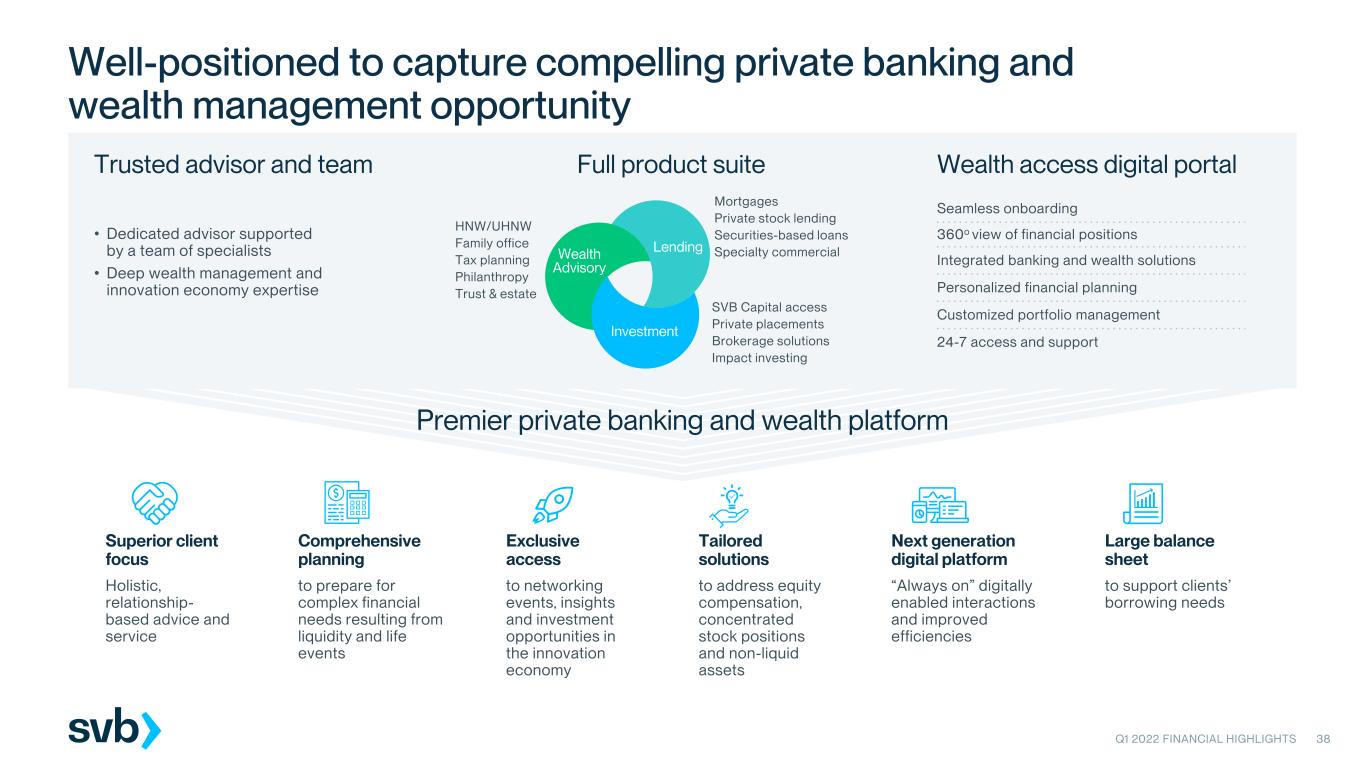
Wealth access digital portal Superior client focus Holistic, relationship- based advice and service Comprehensive planning to prepare for complex financial needs resulting from liquidity and life events Exclusive access to networking events, insights and investment opportunities in the innovation economy Tailored solutions to address equity compensation, concentrated stock positions and non-liquid assets Next generation digital platform “Always on” digitally enabled interactions and improved efficiencies Large balance sheet to support clients’ borrowing needs Wealth Advisory Investment Lending Q1 2022 FINANCIAL HIGHLIGHTS 38 Well-positioned to capture compelling private banking and wealth management opportunity • Dedicated advisor supported by a team of specialists • Deep wealth management and innovation economy expertise Seamless onboarding 360o view of financial positions Integrated banking and wealth solutions Personalized financial planning Customized portfolio management 24-7 access and support Mortgages Private stock lending Securities-based loans Specialty commercial SVB Capital access Private placements Brokerage solutions Impact investing HNW/UHNW Family office Tax planning Philanthropy Trust & estate Premier private banking and wealth platform Trusted advisor and team Full product suite
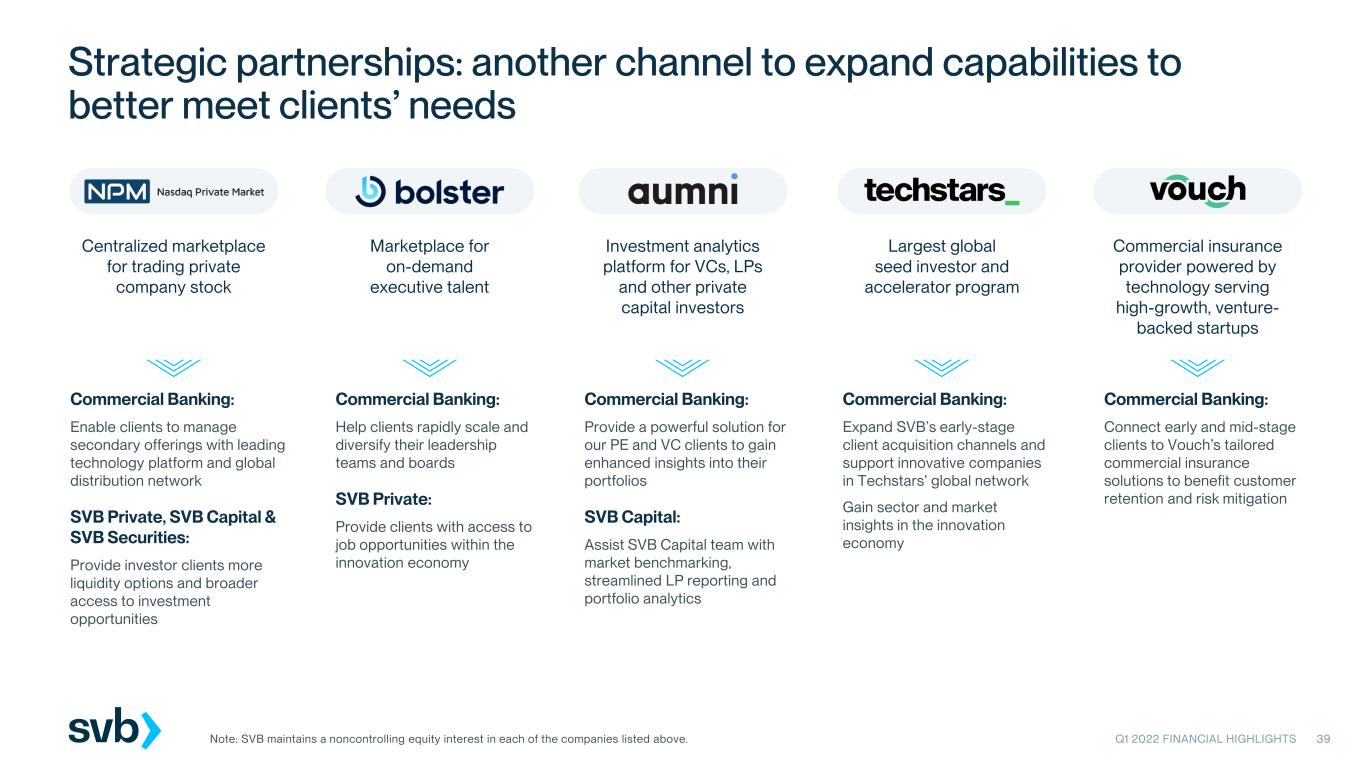
Centralized marketplace for trading private company stock Commercial Banking: Enable clients to manage secondary offerings with leading technology platform and global distribution network SVB Private, SVB Capital & SVB Securities: Provide investor clients more liquidity options and broader access to investment opportunities Marketplace for on-demand executive talent Commercial Banking: Help clients rapidly scale and diversify their leadership teams and boards SVB Private: Provide clients with access to job opportunities within the innovation economy Investment analytics platform for VCs, LPs and other private capital investors Commercial Banking: Provide a powerful solution for our PE and VC clients to gain enhanced insights into their portfolios SVB Capital: Assist SVB Capital team with market benchmarking, streamlined LP reporting and portfolio analytics Commercial insurance provider powered by technology serving high-growth, venture- backed startups Commercial Banking: Connect early and mid-stage clients to Vouch’s tailored commercial insurance solutions to benefit customer retention and risk mitigation Largest global seed investor and accelerator program Commercial Banking: Expand SVB’s early-stage client acquisition channels and support innovative companies in Techstars’ global network Gain sector and market insights in the innovation economy Q1 2022 FINANCIAL HIGHLIGHTS 39 Strategic partnerships: another channel to expand capabilities to better meet clients’ needs Note: SVB maintains a noncontrolling equity interest in each of the companies listed above.
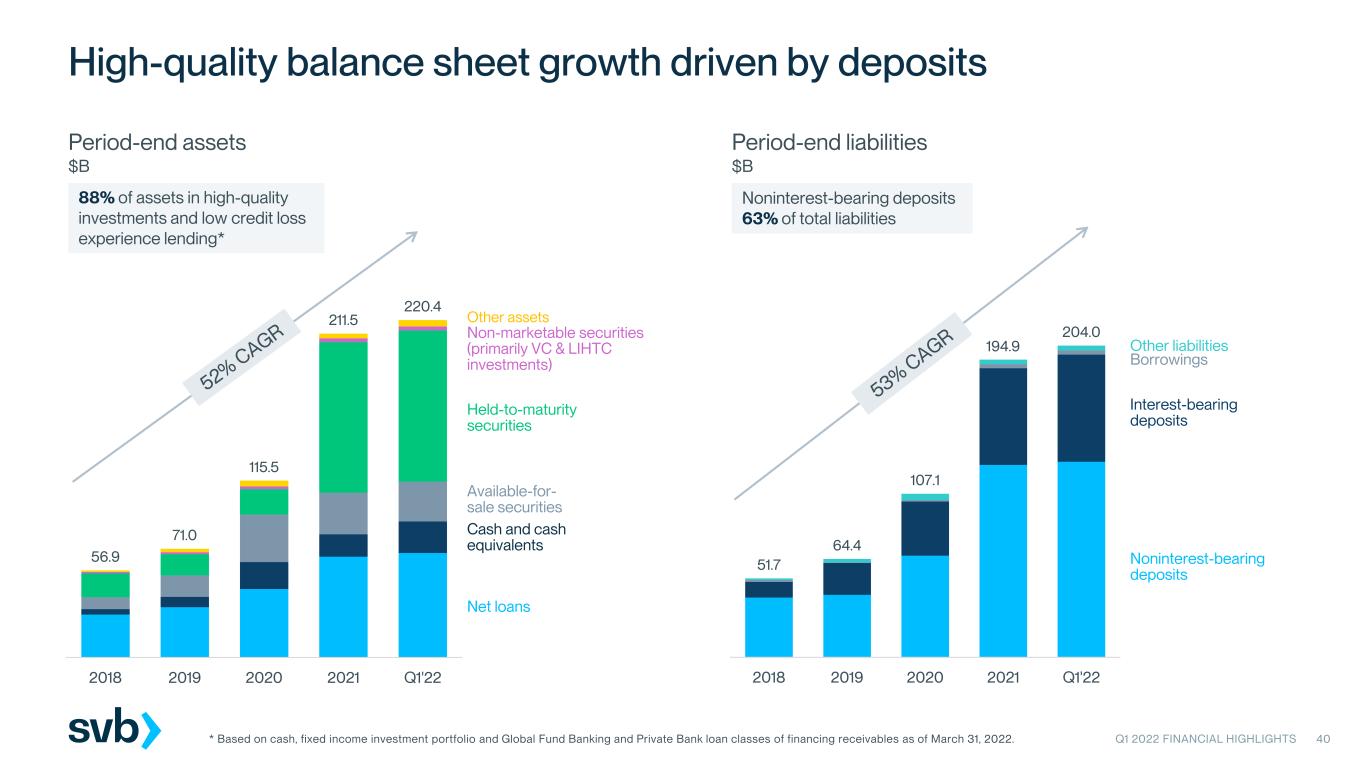
56.9 71.0 115.5 211.5 220.4 -$10 $10 $30 $50 $70 $90 $110 $130 $150 $170 $190 $210 $230 $250 2018 2019 2020 2021 Q1'22 Period-end assets $B Period-end liabilities $B 51.7 64.4 107.1 194.9 204.0 $ $20 $40 $60 $80 $100 $120 $140 $160 $180 $200 $220 2018 2019 2020 2021 Q1'22 Q1 2022 FINANCIAL HIGHLIGHTS 40 High-quality balance sheet growth driven by deposits Noninterest-bearing deposits Borrowings Interest-bearing deposits Other liabilities Net loans Other assets Non-marketable securities (primarily VC & LIHTC investments) Held-to-maturity securities Available-for- sale securities Cash and cash equivalents * Based on cash, fixed income investment portfolio and Global Fund Banking and Private Bank loan classes of financing receivables as of March 31, 2022. 88% of assets in high-quality investments and low credit loss experience lending* Noninterest-bearing deposits 63% of total liabilities
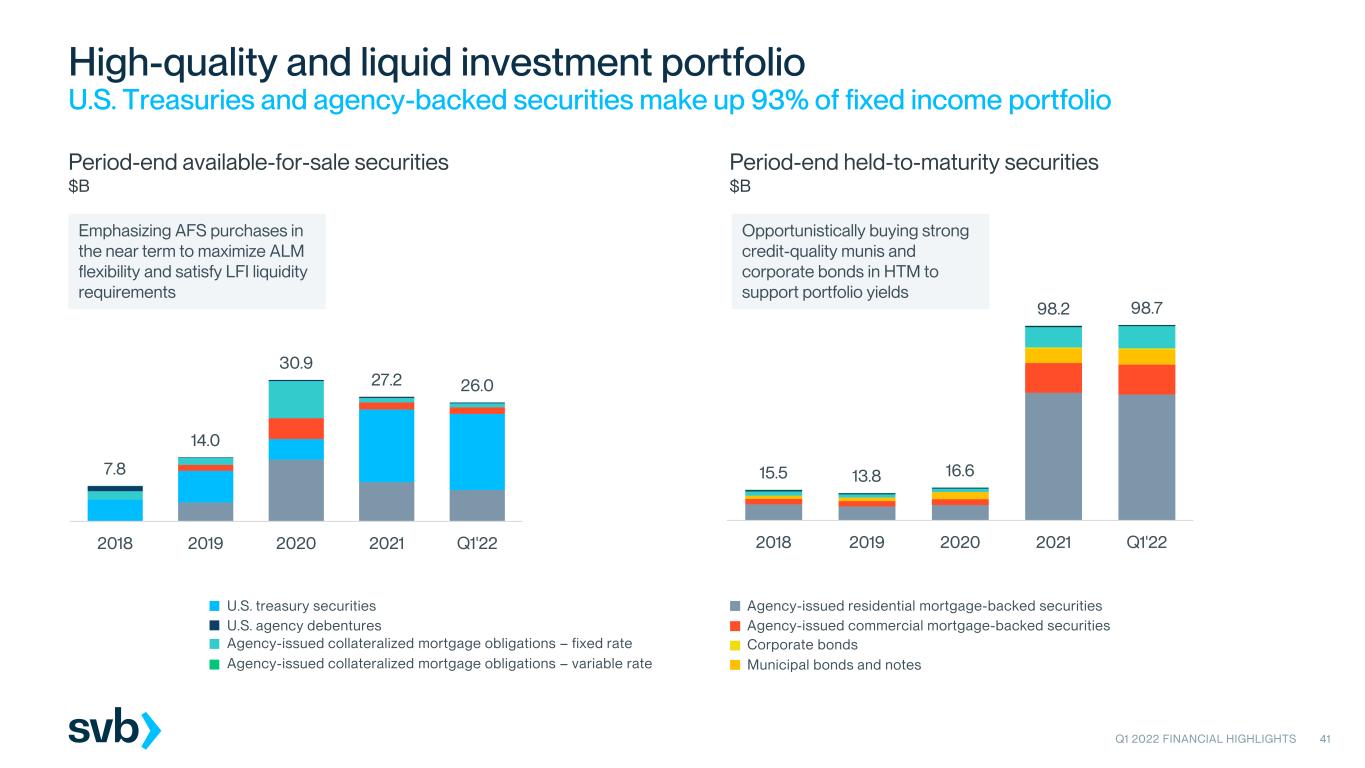
7.8 14.0 30.9 27.2 26.0 $ $ $ $ $ $ $ $ $ $ 2018 2019 2020 2021 Q1'22 41 High-quality and liquid investment portfolio U.S. Treasuries and agency-backed securities make up 93% of fixed income portfolio Q1 2022 FINANCIAL HIGHLIGHTS Municipal bonds and notes U.S. agency debentures Agency-issued commercial mortgage-backed securities Agency-issued collateralized mortgage obligations – variable rate U.S. treasury securities Agency-issued collateralized mortgage obligations – fixed rate Agency-issued residential mortgage-backed securities Corporate bonds Period-end available-for-sale securities $B Period-end held-to-maturity securities $B 15.5 13.8 16.6 98.2 98.7 $ 2018 2019 2020 2021 Q1'22 Opportunistically buying strong credit-quality munis and corporate bonds in HTM to support portfolio yields Emphasizing AFS purchases in the near term to maximize ALM flexibility and satisfy LFI liquidity requirements

Q1 2022 FINANCIAL HIGHLIGHTS 42 Improved risk profile, with loan growth driven by lowest risk loan classes 70% of loans in Global Fund Banking and Private Bank, classes with lowest historical credit losses Early Stage ID % of total loans Other C&I Technology and Life Science/Healthcare Premium Wine and Other Private Bank Global Fund Banking Early Stage Investor Dependent (“ID”) loans, our highest risk loan class, now only 2% of total loans, down from 11% in 2009 and 30% in 2000 CRE PPP 4.5 5.5 7.0 8.9 10.9 14.4 16.7 19.9 23.1 28.3 33.2 45.2 66.3 68.711% 10% 8% 9% 9% 8% 6% 6% 6% 6% 5% 3% 2% 2% 2009 2010 2011 2012 2013 2014 2015 2016 2017 2018 2019 2020 2021 Q1'22 Period-end total loans $B
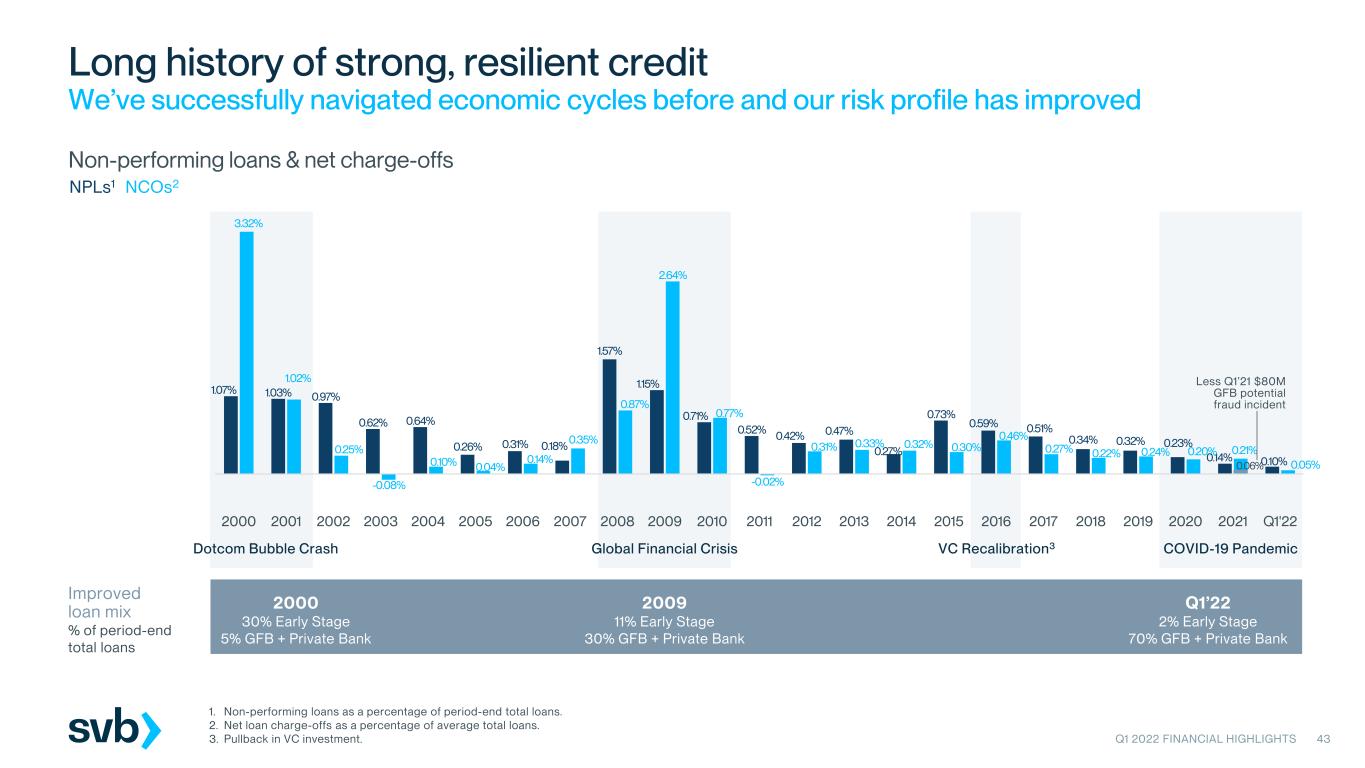
1.07% 1.03% 0.97% 0.62% 0.64% 0.26% 0.31% 0.18% 1.57% 1.15% 0.71% 0.52% 0.42% 0.47% 0.27% 0.73% 0.59% 0.51% 0.34% 0.32% 0.23% 0.14% 0.10% 3.32% 1.02% 0.25% -0.08% 0.10% 0.04% 0.14% 0.35% 0.87% 2.64% 0.77% -0.02% 0.31% 0.33% 0.32% 0.30% 0.46% 0.27% 0.22% 0.24% 0.20% 0.21% 0.05% 2000 2001 2002 2003 2004 2005 2006 2007 2008 2009 2010 2011 2012 2013 2014 2015 2016 2017 2018 2019 2020 2021 Q1'22 Q1 2022 FINANCIAL HIGHLIGHTS 43 Long history of strong, resilient credit We’ve successfully navigated economic cycles before and our risk profile has improved NCOs2NPLs1 Improved loan mix % of period-end total loans Global Financial CrisisDotcom Bubble Crash 2009 11% Early Stage 30% GFB + Private Bank Q1’22 2% Early Stage 70% GFB + Private Bank 2000 30% Early Stage 5% GFB + Private Bank COVID-19 PandemicVC Recalibration3 0.06% 1. Non-performing loans as a percentage of period-end total loans. 2. Net loan charge-offs as a percentage of average total loans. 3. Pullback in VC investment. Non-performing loans & net charge-offs Less Q1’21 $80M GFB potential fraud incident
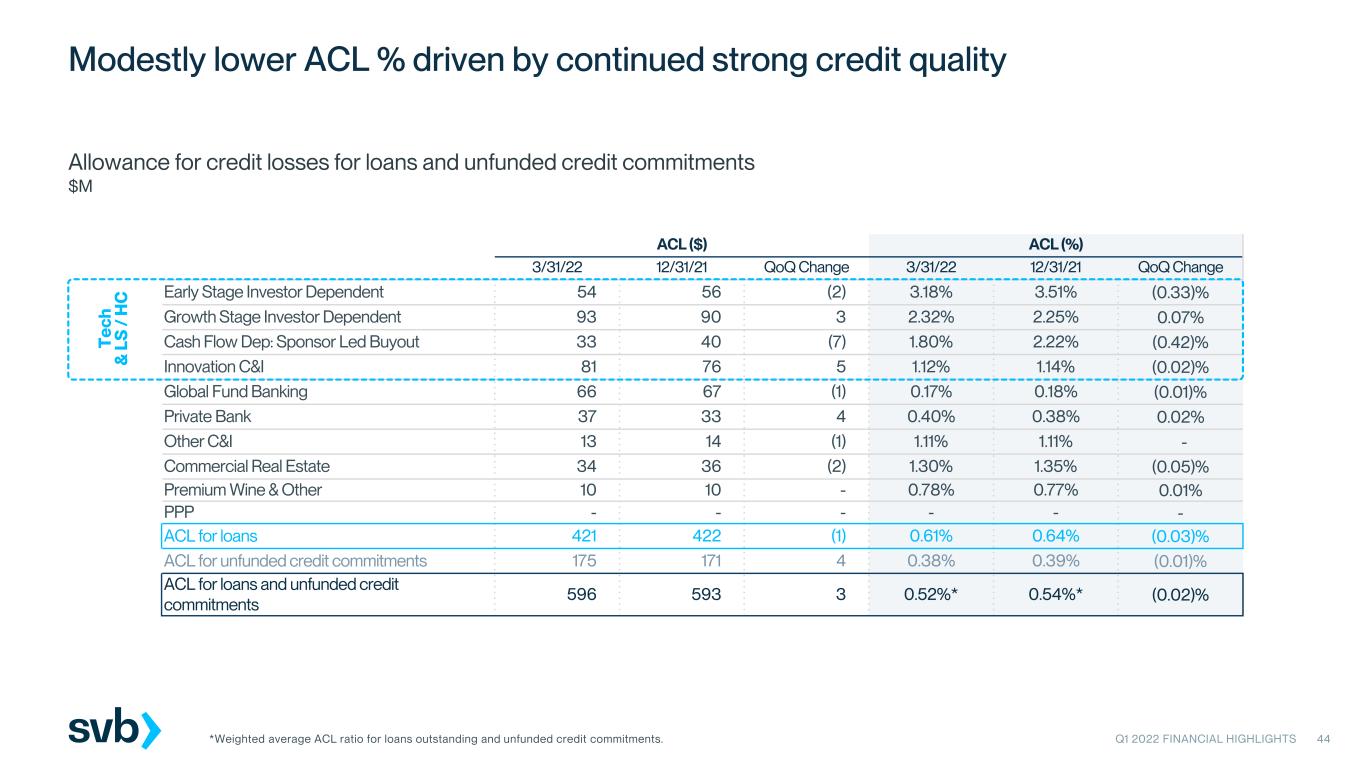
ACL ($) ACL (%) 3/31/22 12/31/21 QoQ Change 3/31/22 12/31/21 QoQ Change Early Stage Investor Dependent 54 56 (2) 3.18% 3.51% (0.33)% Growth Stage Investor Dependent 93 90 3 2.32% 2.25% 0.07% Cash Flow Dep: Sponsor Led Buyout 33 40 (7) 1.80% 2.22% (0.42)% Innovation C&I 81 76 5 1.12% 1.14% (0.02)% Global Fund Banking 66 67 (1) 0.17% 0.18% (0.01)% Private Bank 37 33 4 0.40% 0.38% 0.02% Other C&I 13 14 (1) 1.11% 1.11% - Commercial Real Estate 34 36 (2) 1.30% 1.35% (0.05)% Premium Wine & Other 10 10 - 0.78% 0.77% 0.01% PPP - - - - - - ACL for loans 421 422 (1) 0.61% 0.64% (0.03)% ACL for unfunded credit commitments 175 171 4 0.38% 0.39% (0.01)% ACL for loans and unfunded credit commitments 596 593 3 0.52%* 0.54%* (0.02)% 44 Modestly lower ACL % driven by continued strong credit quality Q1 2022 FINANCIAL HIGHLIGHTS T ec h & L S / H C *Weighted average ACL ratio for loans outstanding and unfunded credit commitments. Allowance for credit losses for loans and unfunded credit commitments $M

Q1 2022 FINANCIAL HIGHLIGHTS 45 Low credit risk capital call lines of credit Largest driver of loan growth over past 8 years; strong underwriting and well-diversified 1. Based on period end loans at March 31, 2022. Capital call lines represent 98% of GFB portfolio. 2. Based on total GFB loan commitments (funded + unfunded) as of March 31, 2022. Global Fund Banking capital call lending Short-term lines of credit used by PE and VC funds to support investment activity prior to the receipt of Limited Partner capital contributions of total loans56%1 Limited partner commitments and robust secondary markets Value of fund investments with solid asset coverage Strong sources of repayment Only 1 loss in our ~30 years of capital call lending Global Fund Banking portfolio2 By industry By investment style 22% 20% 12% 14% 8% 5% 19% Debt Buyout Growth Fund of funds VC funds Other Real estate 38% 13%7% 5% 7% 13% 4% 1% 2% 3% 7% Life sciences Industrial Other Consumer Debt Technology Real estate Fintech Natural resources Infrastructure Energy PE Funds
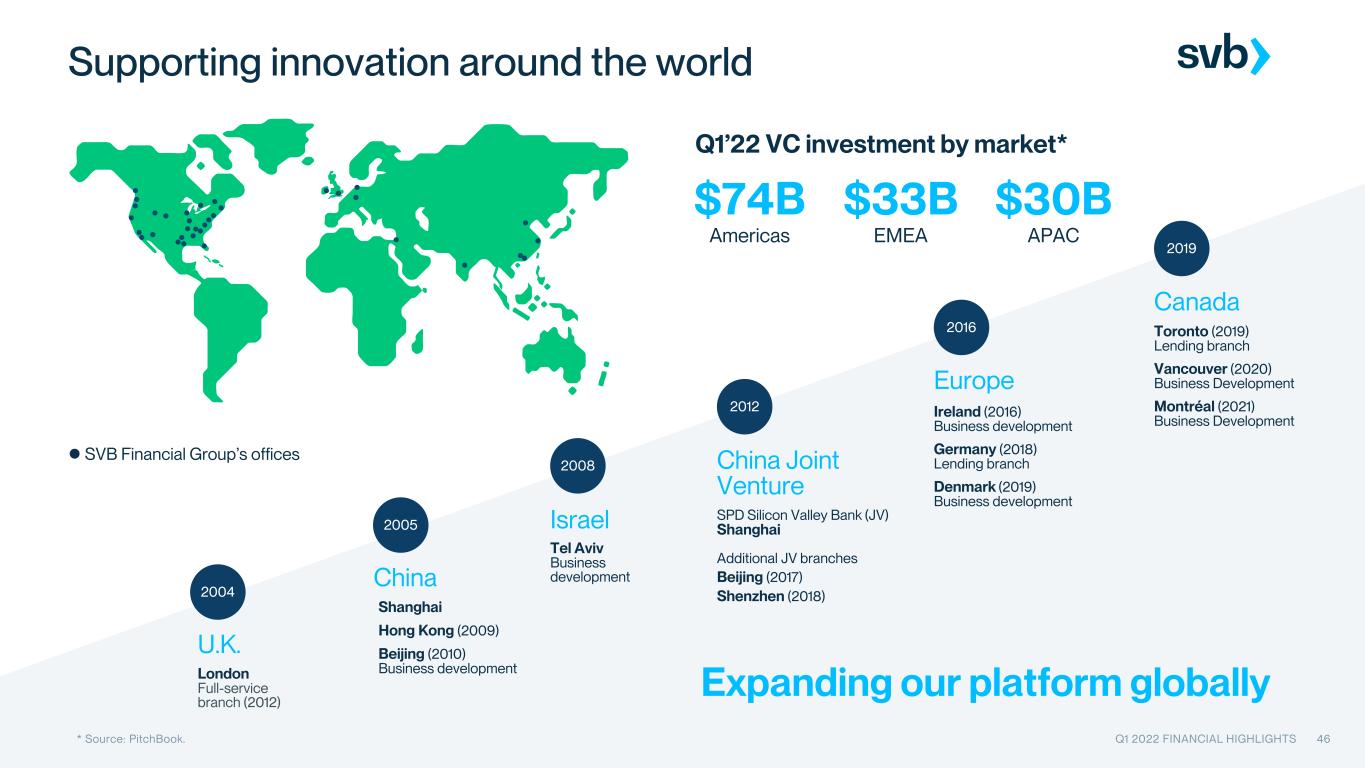
46 Supporting innovation around the world 2004 2005 2008 2012 2016 2019 SVB Financial Group’s offices * Source: PitchBook. $74B Americas $33B EMEA $30B APAC Q1’22 VC investment by market* Expanding our platform globally Israel Tel Aviv Business developmentChina Shanghai Hong Kong (2009) Beijing (2010) Business development Canada Toronto (2019) Lending branch Vancouver (2020) Business Development Montréal (2021) Business Development Europe Ireland (2016) Business development Germany (2018) Lending branch Denmark (2019) Business development U.K. London Full-service branch (2012) China Joint Venture SPD Silicon Valley Bank (JV) Shanghai Additional JV branches Beijing (2017) Shenzhen (2018) Q1 2022 FINANCIAL HIGHLIGHTS
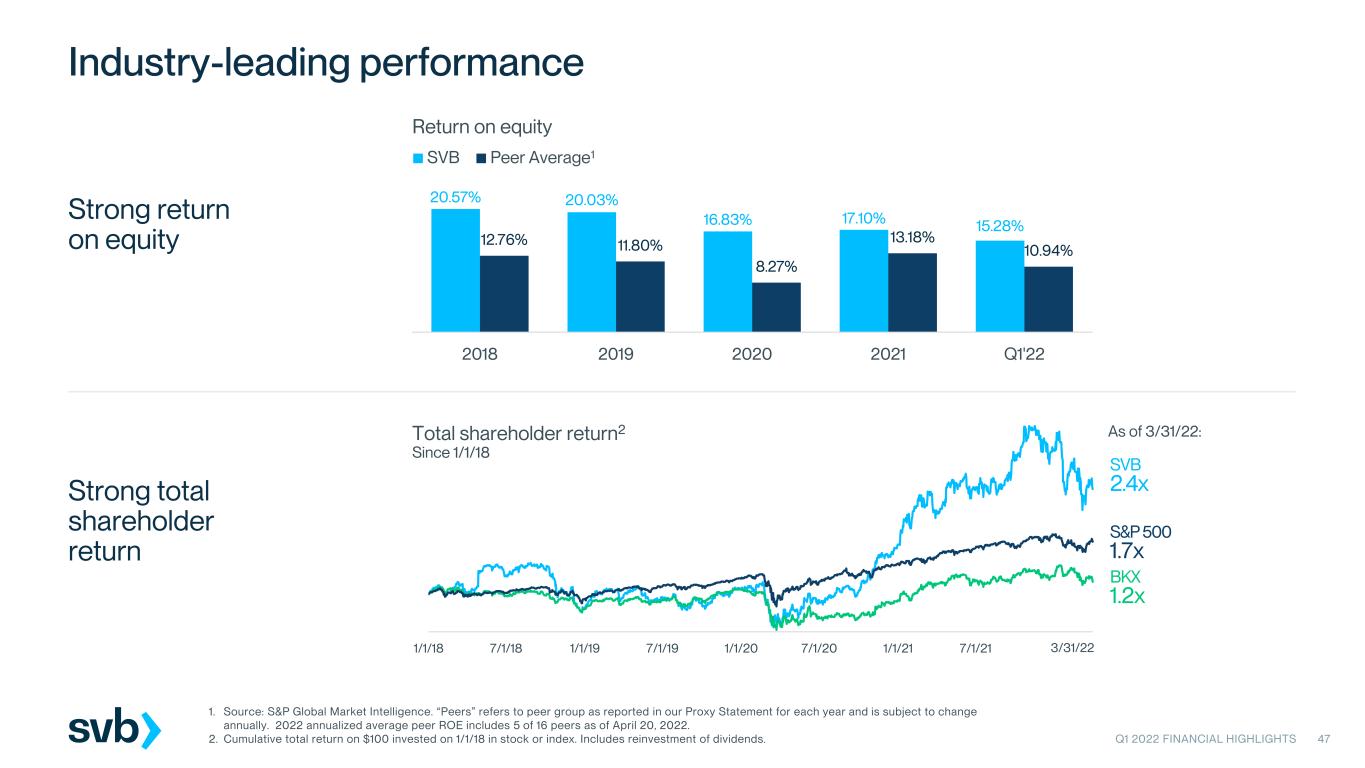
20.57% 20.03% 16.83% 17.10% 15.28% 12.76% 11.80% 8.27% 13.18% 10.94% 0.00% 5.00% 10.00% 15.00% 20.00% 25.00% 30.00% 2018 2019 2020 2021 Q1'22 SVB Peer Average 47 Industry-leading performance Q1 2022 FINANCIAL HIGHLIGHTS 1/1/18 7/1/18 1/1/19 7/1/19 1/1/20 7/1/20 1/1/21 7/1/21 1/1/22 SVB 2.4x BKX 1.2x S&P 500 1.7x Total shareholder return2 Since 1/1/18 3/31/22 1. Source: S&P Global Market Intelligence. “Peers” refers to peer group as reported in our Proxy Statement for each year and is subject to change annually. 2022 annualized average peer ROE includes 5 of 16 peers as of April 20, 2022. 2. Cumulative total return on $100 invested on 1/1/18 in stock or index. Includes reinvestment of dividends. Return on equity Strong total shareholder return As of 3/31/22: 1 Strong return on equity
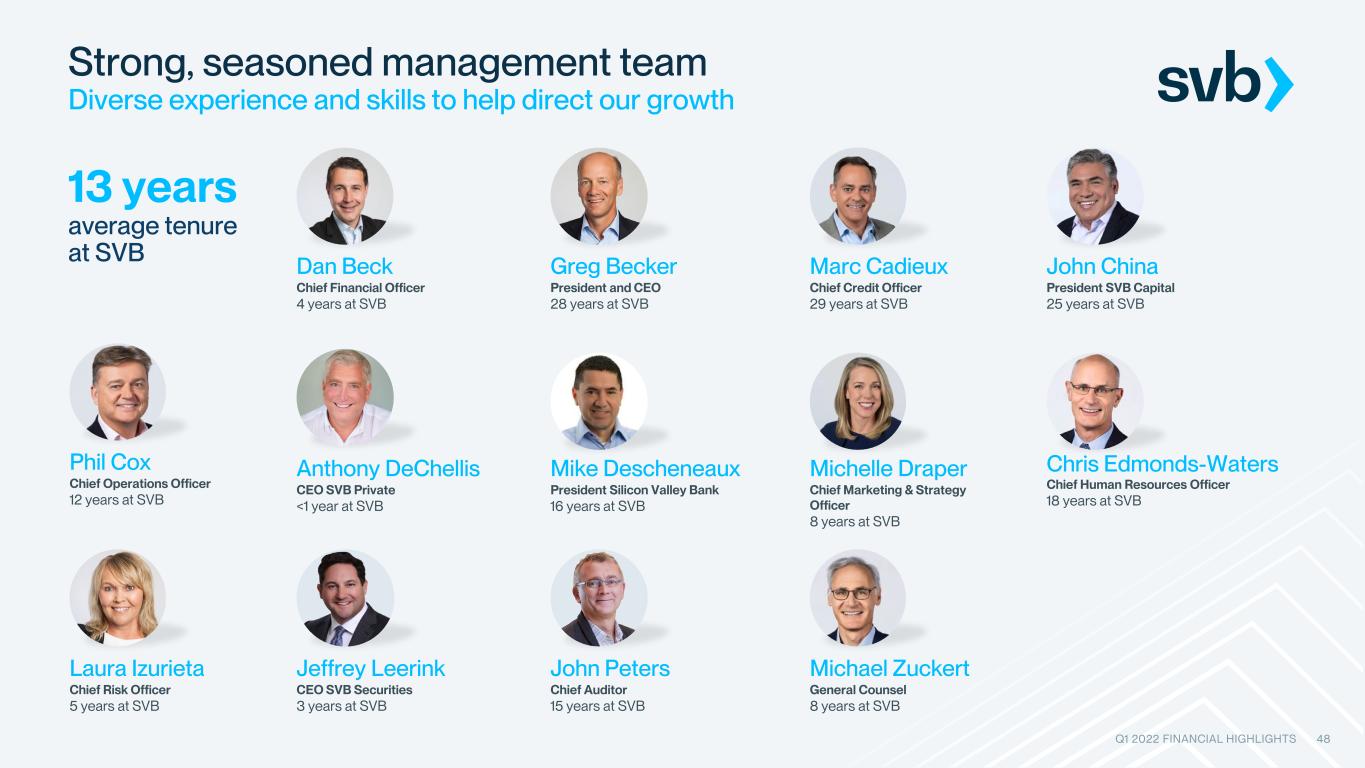
48 Strong, seasoned management team Diverse experience and skills to help direct our growth Dan Beck Chief Financial Officer 4 years at SVB Greg Becker President and CEO 28 years at SVB Marc Cadieux Chief Credit Officer 29 years at SVB John China President SVB Capital 25 years at SVB Phil Cox Chief Operations Officer 12 years at SVB Anthony DeChellis CEO SVB Private <1 year at SVB Mike Descheneaux President Silicon Valley Bank 16 years at SVB Michelle Draper Chief Marketing & Strategy Officer 8 years at SVB Chris Edmonds-Waters Chief Human Resources Officer 18 years at SVB Laura Izurieta Chief Risk Officer 5 years at SVB Jeffrey Leerink CEO SVB Securities 3 years at SVB John Peters Chief Auditor 15 years at SVB Michael Zuckert General Counsel 8 years at SVB 13 years average tenure at SVB Q1 2022 FINANCIAL HIGHLIGHTS
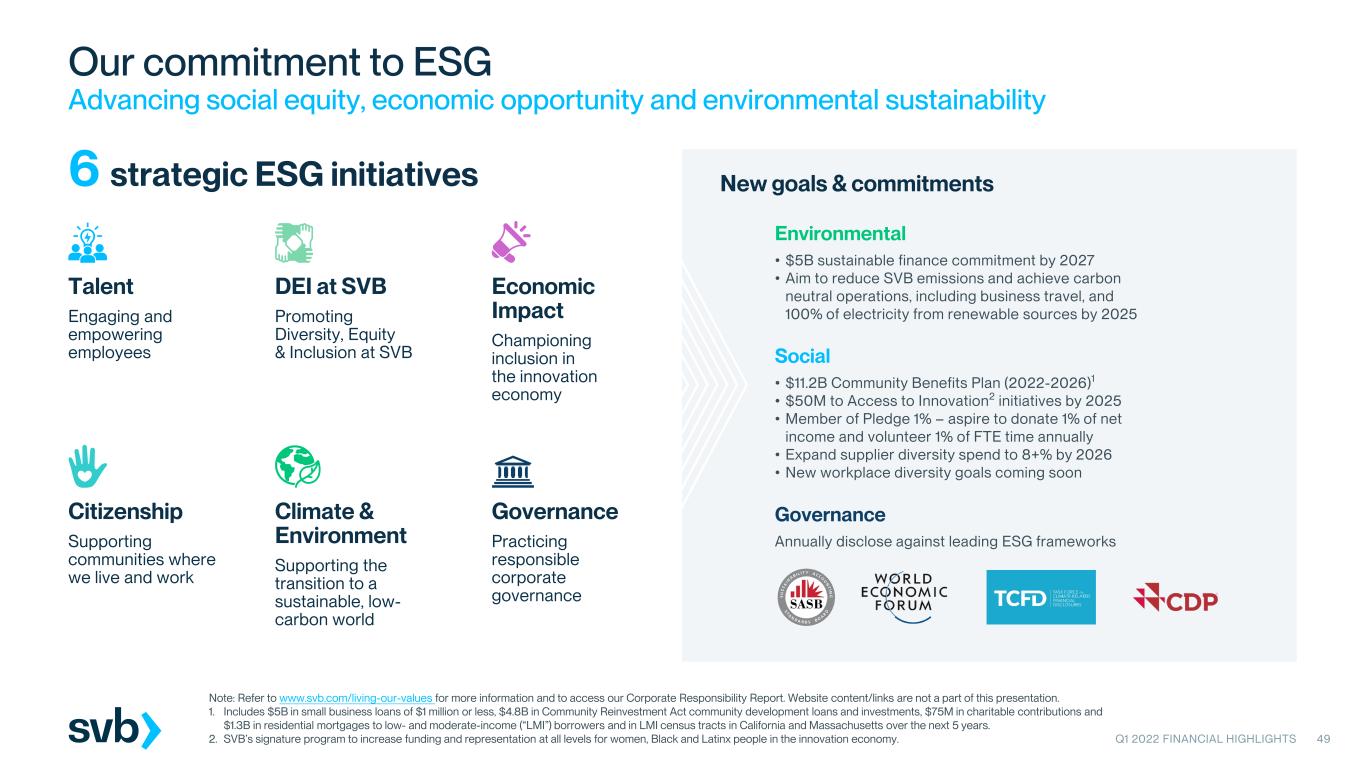
New goals & commitments Q1 2022 FINANCIAL HIGHLIGHTS 49 Our commitment to ESG Advancing social equity, economic opportunity and environmental sustainability 49 Environmental • $5B sustainable finance commitment by 2027 • Aim to reduce SVB emissions and achieve carbon neutral operations, including business travel, and 100% of electricity from renewable sources by 2025 Social • $11.2B Community Benefits Plan (2022-2026)1 • $50M to Access to Innovation2 initiatives by 2025 • Member of Pledge 1% – aspire to donate 1% of net income and volunteer 1% of FTE time annually • Expand supplier diversity spend to 8+% by 2026 • New workplace diversity goals coming soon Governance Annually disclose against leading ESG frameworks Note: Refer to www.svb.com/living-our-values for more information and to access our Corporate Responsibility Report. Website content/links are not a part of this presentation. 1. Includes $5B in small business loans of $1 million or less, $4.8B in Community Reinvestment Act community development loans and investments, $75M in charitable contributions and $1.3B in residential mortgages to low- and moderate-income (“LMI”) borrowers and in LMI census tracts in California and Massachusetts over the next 5 years. 2. SVB’s signature program to increase funding and representation at all levels for women, Black and Latinx people in the innovation economy. Talent Engaging and empowering employees DEI at SVB Promoting Diversity, Equity & Inclusion at SVB Economic Impact Championing inclusion in the innovation economy Citizenship Supporting communities where we live and work Climate & Environment Supporting the transition to a sustainable, low- carbon world Governance Practicing responsible corporate governance 6 strategic ESG initiatives
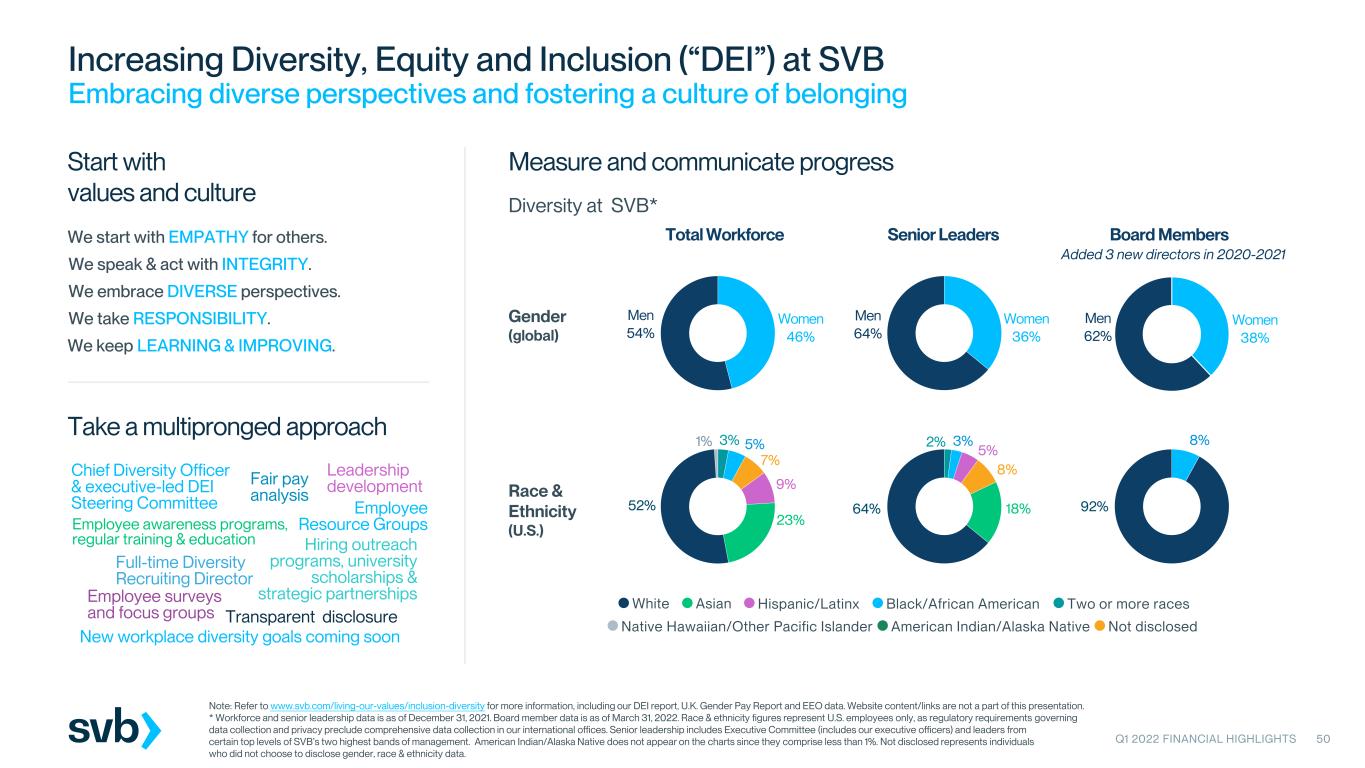
Q1 2022 FINANCIAL HIGHLIGHTS 50 Increasing Diversity, Equity and Inclusion (“DEI”) at SVB Embracing diverse perspectives and fostering a culture of belonging Gender (global) Race & Ethnicity (U.S.) Diversity at SVB* Note: Refer to www.svb.com/living-our-values/inclusion-diversity for more information, including our DEI report, U.K. Gender Pay Report and EEO data. Website content/links are not a part of this presentation. * Workforce and senior leadership data is as of December 31, 2021. Board member data is as of March 31, 2022. Race & ethnicity figures represent U.S. employees only, as regulatory requirements governing data collection and privacy preclude comprehensive data collection in our international offices. Senior leadership includes Executive Committee (includes our executive officers) and leaders from certain top levels of SVB’s two highest bands of management. American Indian/Alaska Native does not appear on the charts since they comprise less than 1%. Not disclosed represents individuals who did not choose to disclose gender, race & ethnicity data. Measure and communicate progress Native Hawaiian/Other Pacific Islander American Indian/Alaska Native Not disclosed White Asian Hispanic/Latinx Black/African American Two or more races Start with values and culture We keep LEARNING & IMPROVING. We start with EMPATHY for others. We speak & act with INTEGRITY. We take RESPONSIBILITY. We embrace DIVERSE perspectives. Take a multipronged approach Hiring outreach programs, university scholarships & strategic partnerships Chief Diversity Officer & executive-led DEI Steering Committee Full-time Diversity Recruiting Director Employee Resource GroupsEmployee awareness programs, regular training & education Leadership developmentFair pay analysis Employee surveys and focus groups Transparent disclosure New workplace diversity goals coming soon 3% 5% 7% 9% 23% 52% 1% 2% 3% 5% 8% 18%64% 8% 92% Women 38% Men 62% Women 46% Men 54% Women 36% Men 64% Senior LeadersTotal Workforce Board Members Added 3 new directors in 2020-2021
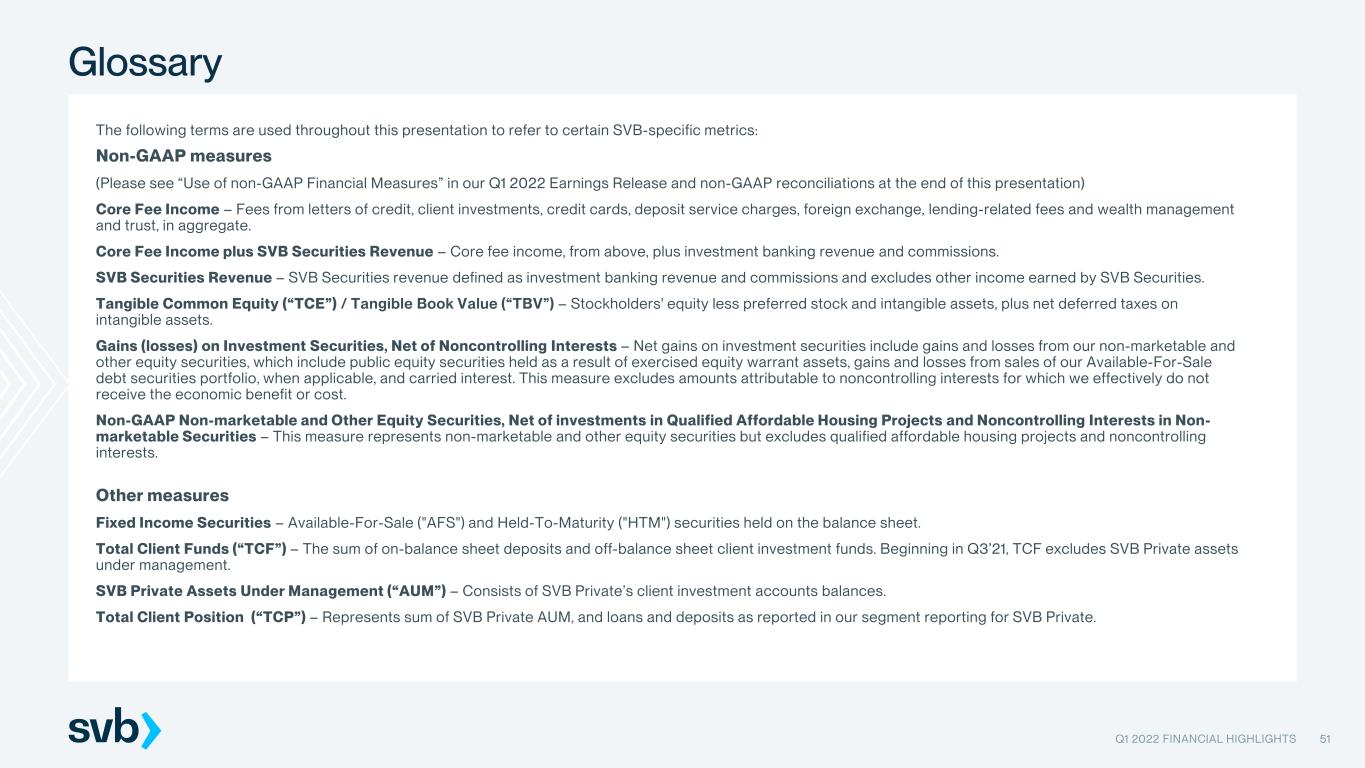
Glossary The following terms are used throughout this presentation to refer to certain SVB-specific metrics: Non-GAAP measures (Please see “Use of non-GAAP Financial Measures” in our Q1 2022 Earnings Release and non-GAAP reconciliations at the end of this presentation) Core Fee Income – Fees from letters of credit, client investments, credit cards, deposit service charges, foreign exchange, lending-related fees and wealth management and trust, in aggregate. Core Fee Income plus SVB Securities Revenue – Core fee income, from above, plus investment banking revenue and commissions. SVB Securities Revenue – SVB Securities revenue defined as investment banking revenue and commissions and excludes other income earned by SVB Securities. Tangible Common Equity (“TCE”) / Tangible Book Value (“TBV”) – Stockholders' equity less preferred stock and intangible assets, plus net deferred taxes on intangible assets. Gains (losses) on Investment Securities, Net of Noncontrolling Interests – Net gains on investment securities include gains and losses from our non-marketable and other equity securities, which include public equity securities held as a result of exercised equity warrant assets, gains and losses from sales of our Available-For-Sale debt securities portfolio, when applicable, and carried interest. This measure excludes amounts attributable to noncontrolling interests for which we effectively do not receive the economic benefit or cost. Non-GAAP Non-marketable and Other Equity Securities, Net of investments in Qualified Affordable Housing Projects and Noncontrolling Interests in Non- marketable Securities – This measure represents non-marketable and other equity securities but excludes qualified affordable housing projects and noncontrolling interests. Other measures Fixed Income Securities – Available-For-Sale ("AFS") and Held-To-Maturity ("HTM") securities held on the balance sheet. Total Client Funds (“TCF”) – The sum of on-balance sheet deposits and off-balance sheet client investment funds. Beginning in Q3’21, TCF excludes SVB Private assets under management. SVB Private Assets Under Management (“AUM”) – Consists of SVB Private’s client investment accounts balances. Total Client Position (“TCP”) – Represents sum of SVB Private AUM, and loans and deposits as reported in our segment reporting for SVB Private. Q1 2022 FINANCIAL HIGHLIGHTS 51
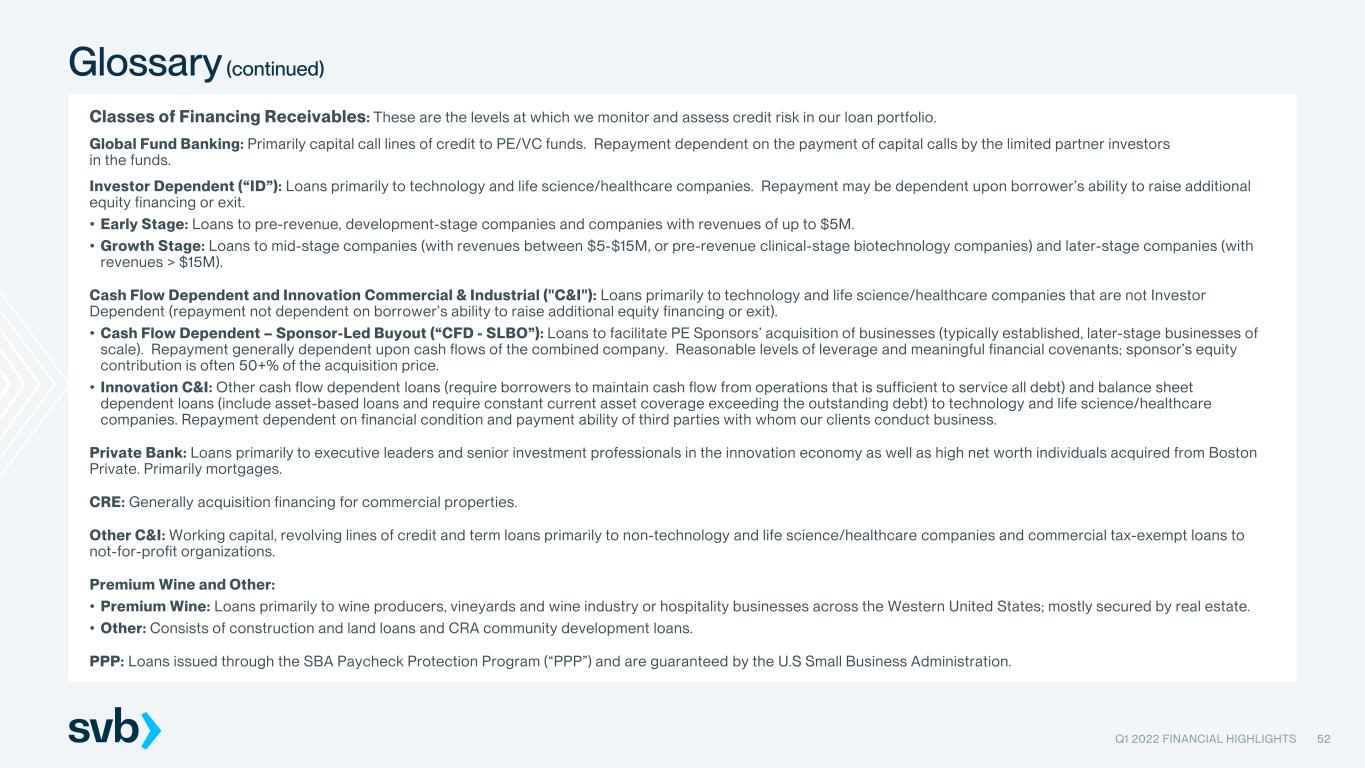
Glossary (continued) Classes of Financing Receivables: These are the levels at which we monitor and assess credit risk in our loan portfolio. Global Fund Banking: Primarily capital call lines of credit to PE/VC funds. Repayment dependent on the payment of capital calls by the limited partner investors in the funds. Investor Dependent (“ID”): Loans primarily to technology and life science/healthcare companies. Repayment may be dependent upon borrower’s ability to raise additional equity financing or exit. • Early Stage: Loans to pre-revenue, development-stage companies and companies with revenues of up to $5M. • Growth Stage: Loans to mid-stage companies (with revenues between $5-$15M, or pre-revenue clinical-stage biotechnology companies) and later-stage companies (with revenues > $15M). Cash Flow Dependent and Innovation Commercial & Industrial ("C&I"): Loans primarily to technology and life science/healthcare companies that are not Investor Dependent (repayment not dependent on borrower’s ability to raise additional equity financing or exit). • Cash Flow Dependent – Sponsor-Led Buyout (“CFD - SLBO”): Loans to facilitate PE Sponsors’ acquisition of businesses (typically established, later-stage businesses of scale). Repayment generally dependent upon cash flows of the combined company. Reasonable levels of leverage and meaningful financial covenants; sponsor’s equity contribution is often 50+% of the acquisition price. • Innovation C&I: Other cash flow dependent loans (require borrowers to maintain cash flow from operations that is sufficient to service all debt) and balance sheet dependent loans (include asset-based loans and require constant current asset coverage exceeding the outstanding debt) to technology and life science/healthcare companies. Repayment dependent on financial condition and payment ability of third parties with whom our clients conduct business. Private Bank: Loans primarily to executive leaders and senior investment professionals in the innovation economy as well as high net worth individuals acquired from Boston Private. Primarily mortgages. CRE: Generally acquisition financing for commercial properties. Other C&I: Working capital, revolving lines of credit and term loans primarily to non-technology and life science/healthcare companies and commercial tax-exempt loans to not-for-profit organizations. Premium Wine and Other: • Premium Wine: Loans primarily to wine producers, vineyards and wine industry or hospitality businesses across the Western United States; mostly secured by real estate. • Other: Consists of construction and land loans and CRA community development loans. PPP: Loans issued through the SBA Paycheck Protection Program (“PPP”) and are guaranteed by the U.S Small Business Administration. Q1 2022 FINANCIAL HIGHLIGHTS 52
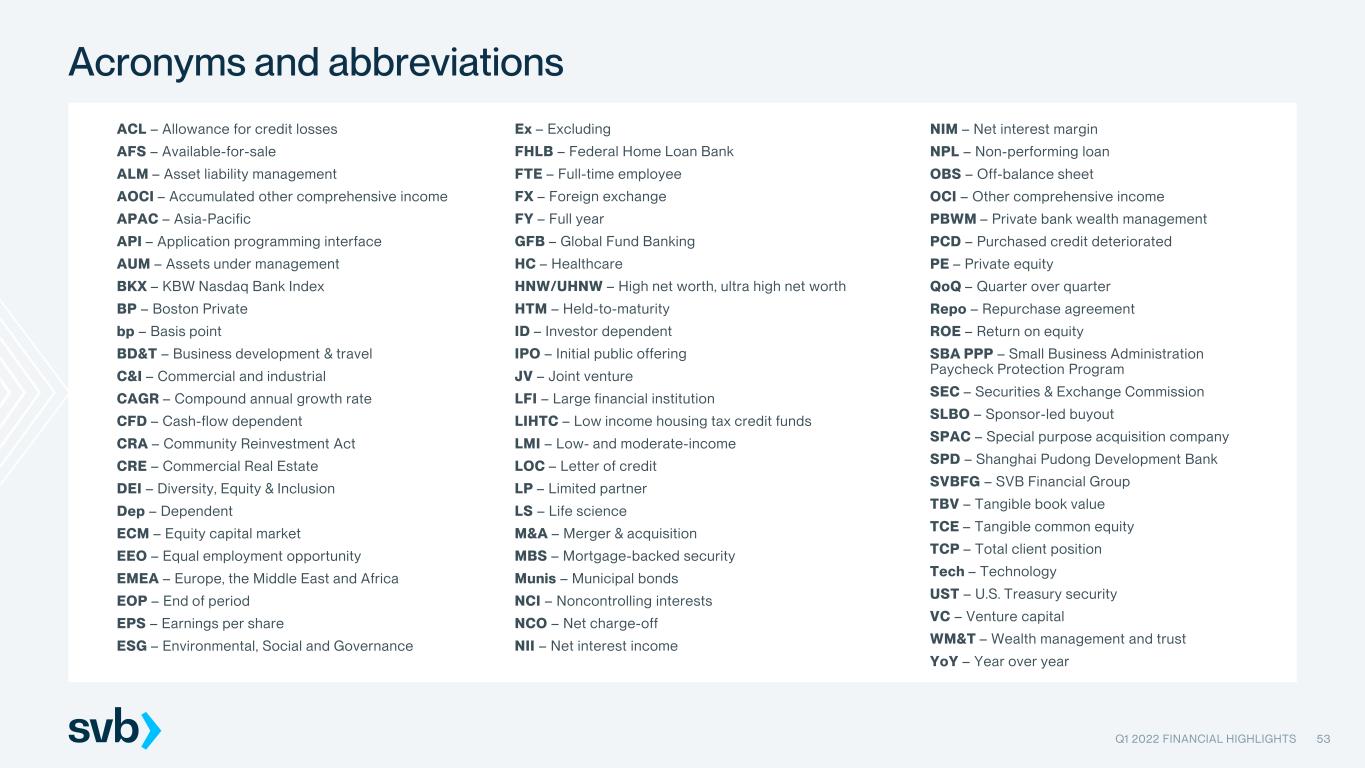
Acronyms and abbreviations Ex – Excluding FHLB – Federal Home Loan Bank FTE – Full-time employee FX – Foreign exchange FY – Full year GFB – Global Fund Banking HC – Healthcare HNW/UHNW – High net worth, ultra high net worth HTM – Held-to-maturity ID – Investor dependent IPO – Initial public offering JV – Joint venture LFI – Large financial institution LIHTC – Low income housing tax credit funds LMI – Low- and moderate-income LOC – Letter of credit LP – Limited partner LS – Life science M&A – Merger & acquisition MBS – Mortgage-backed security Munis – Municipal bonds NCI – Noncontrolling interests NCO – Net charge-off NII – Net interest income ACL – Allowance for credit losses AFS – Available-for-sale ALM – Asset liability management AOCI – Accumulated other comprehensive income APAC – Asia-Pacific API – Application programming interface AUM – Assets under management BKX – KBW Nasdaq Bank Index BP – Boston Private bp – Basis point BD&T – Business development & travel C&I – Commercial and industrial CAGR – Compound annual growth rate CFD – Cash-flow dependent CRA – Community Reinvestment Act CRE – Commercial Real Estate DEI – Diversity, Equity & Inclusion Dep – Dependent ECM – Equity capital market EEO – Equal employment opportunity EMEA – Europe, the Middle East and Africa EOP – End of period EPS – Earnings per share ESG – Environmental, Social and Governance NIM – Net interest margin NPL – Non-performing loan OBS – Off-balance sheet OCI – Other comprehensive income PBWM – Private bank wealth management PCD – Purchased credit deteriorated PE – Private equity QoQ – Quarter over quarter Repo – Repurchase agreement ROE – Return on equity SBA PPP – Small Business Administration Paycheck Protection Program SEC – Securities & Exchange Commission SLBO – Sponsor-led buyout SPAC – Special purpose acquisition company SPD – Shanghai Pudong Development Bank SVBFG – SVB Financial Group TBV – Tangible book value TCE – Tangible common equity TCP – Total client position Tech – Technology UST – U.S. Treasury security VC – Venture capital WM&T – Wealth management and trust YoY – Year over year Q1 2022 FINANCIAL HIGHLIGHTS 53
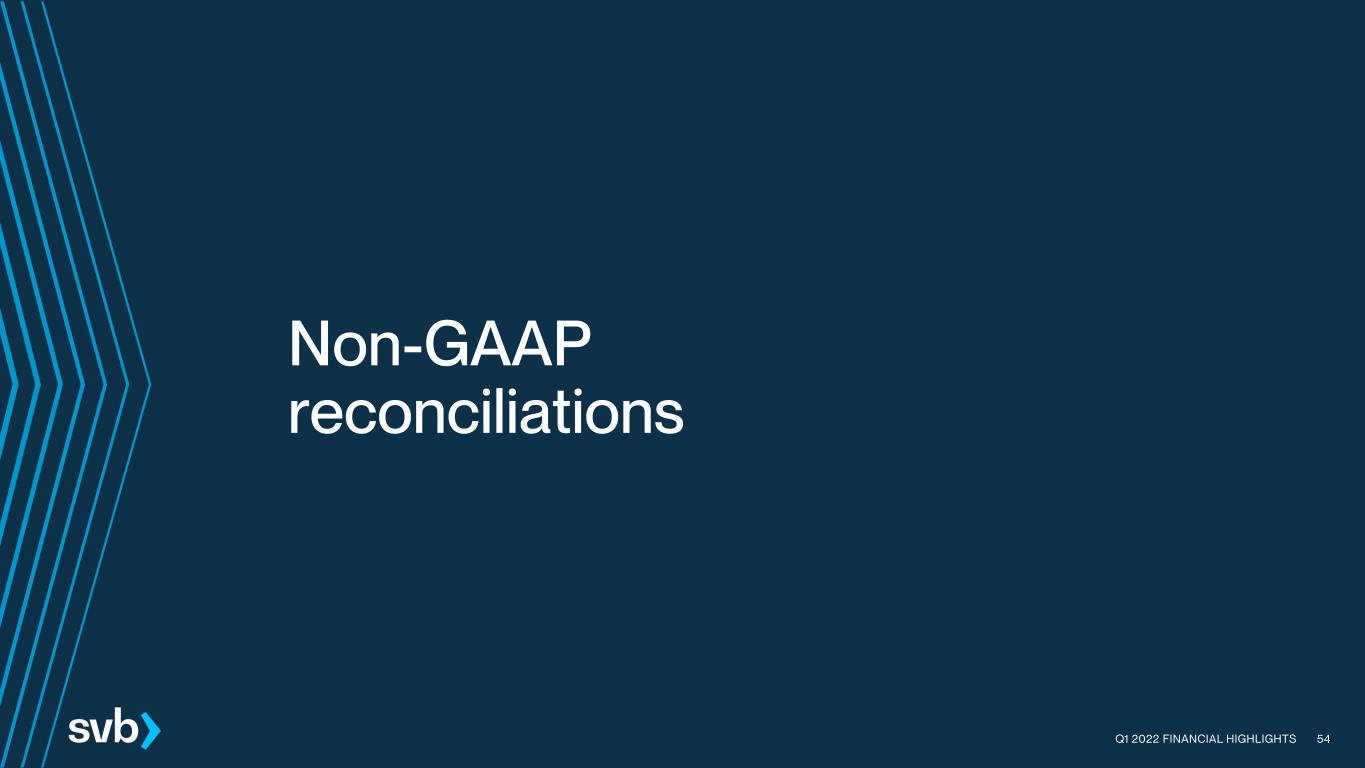
Non-GAAP reconciliations Q1 2022 FINANCIAL HIGHLIGHTS 54
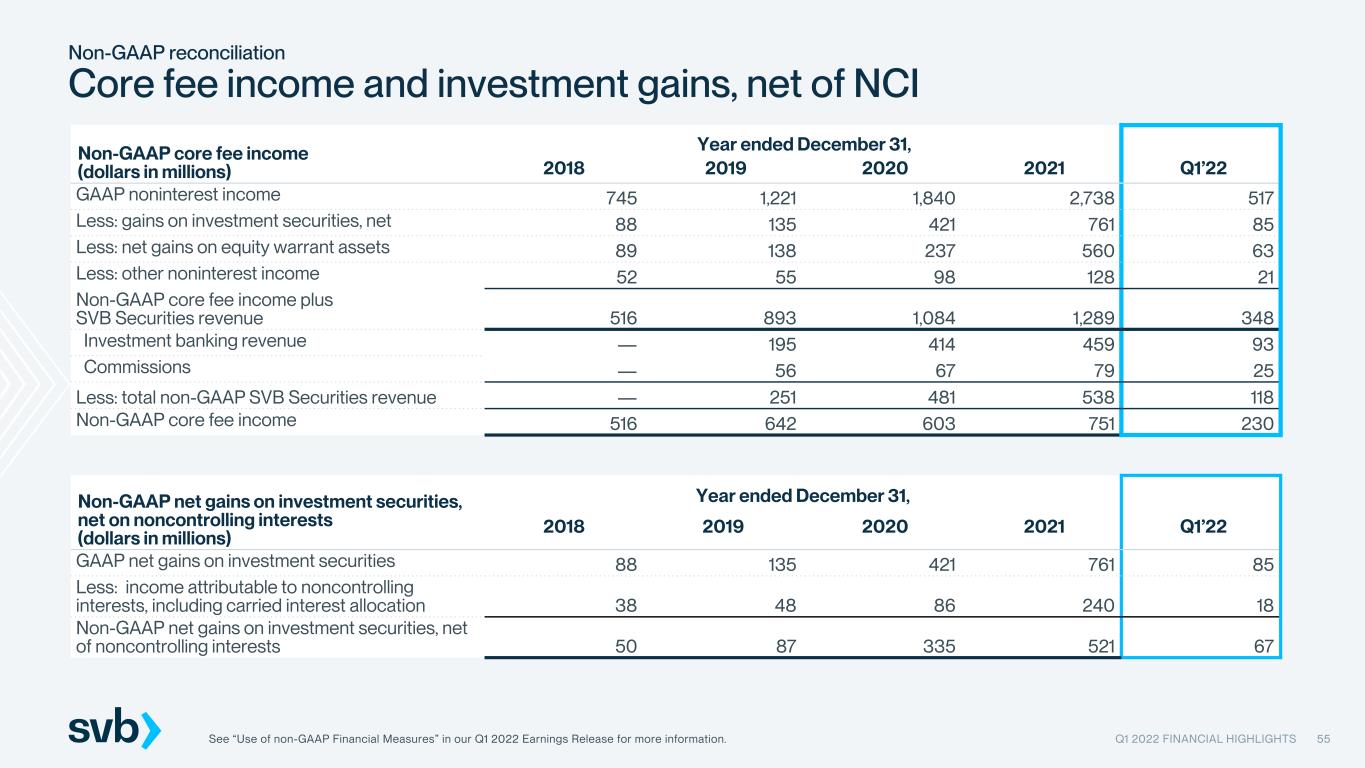
Non-GAAP reconciliation Core fee income and investment gains, net of NCI Q1 2022 FINANCIAL HIGHLIGHTS 55 Non-GAAP core fee income (dollars in millions) Yea ear ended December 31, r 2018 2019 2020 2021 Q1’22 GAAP noninterest income 745 1,221 1,840 2,738 517 Less: gains on investment securities, net 88 135 421 761 85 Less: net gains on equity warrant assets 89 138 237 560 63 Less: other noninterest income 52 55 98 128 21 Non-GAAP core fee income plus SVB Securities revenue 516 893 1,084 1,289 348 Investment banking revenue — 195 414 459 93 Commissions — 56 67 79 25 Less: total non-GAAP SVB Securities revenue — 251 481 538 118 Non-GAAP core fee income 516 642 603 751 230 See “Use of non-GAAP Financial Measures” in our Q1 2022 Earnings Release for more information. Non-GAAP net gains on investment securities, net on noncontrolling interests (dollars in millions) Year ended December 31, 2018 2019 2020 2021 Q1’22 GAAP net gains on investment securities 88 135 421 761 85 Less: income attributable to noncontrolling interests, including carried interest allocation 38 48 86 240 18 Non-GAAP net gains on investment securities, net of noncontrolling interests 50 87 335 521 67
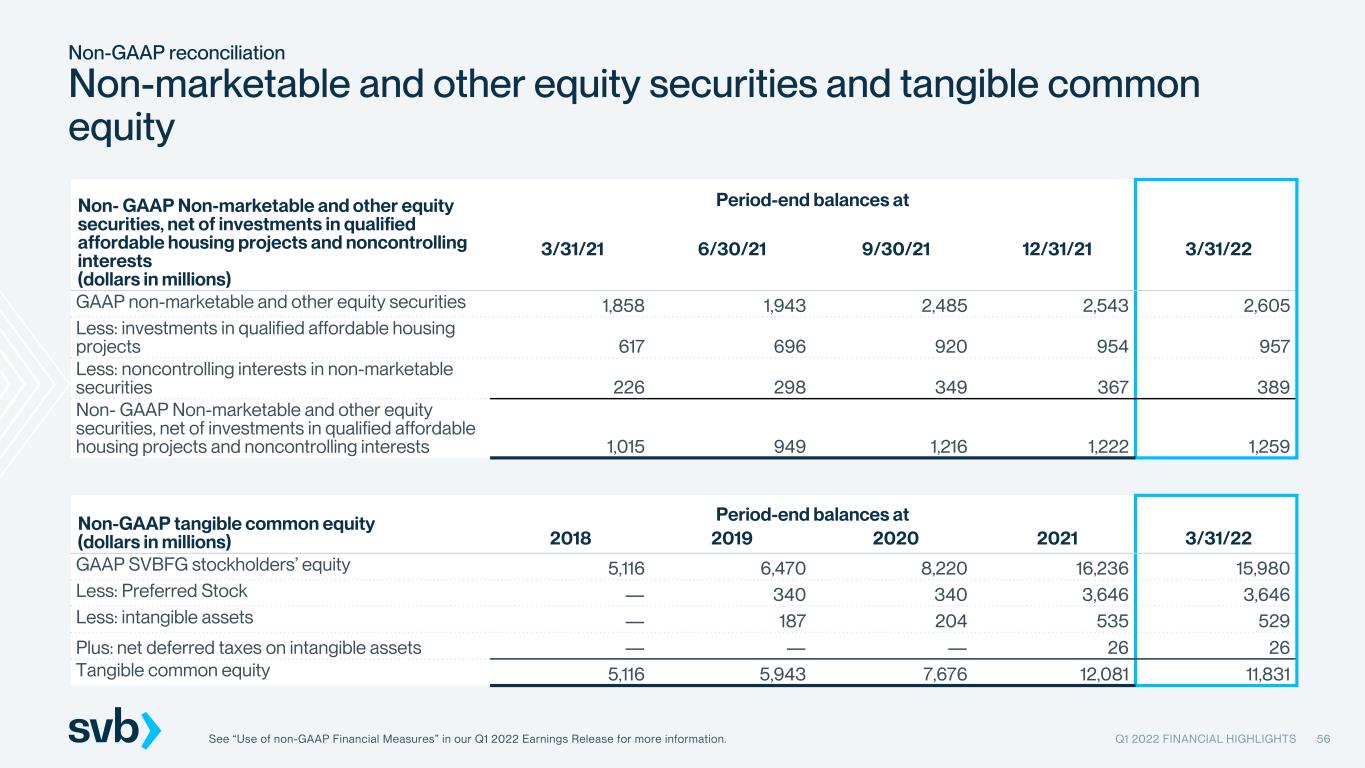
Non-GAAP reconciliation Non-marketable and other equity securities and tangible common equity Q1 2022 FINANCIAL HIGHLIGHTS 56 Non- GAAP Non-marketable and other equity securities, net of investments in qualified affordable housing projects and noncontrolling interests (dollars in millions) Period-end balances at 3/31/21 6/30/21 9/30/21 12/31/21 3/31/22 GAAP non-marketable and other equity securities 1,858 1,943 2,485 2,543 2,605 Less: investments in qualified affordable housing projects 617 696 920 954 957 Less: noncontrolling interests in non-marketable securities 226 298 349 367 389 Non- GAAP Non-marketable and other equity securities, net of investments in qualified affordable housing projects and noncontrolling interests 1,015 949 1,216 1,222 1,259 See “Use of non-GAAP Financial Measures” in our Q1 2022 Earnings Release for more information. Non-GAAP tangible common equity (dollars in millions) Period-end balances at 2018 2019 2020 2021 3/31/22 GAAP SVBFG stockholders’ equity 5,116 6,470 8,220 16,236 15,980 Less: Preferred Stock — 340 340 3,646 3,646 Less: intangible assets — 187 204 535 529 Plus: net deferred taxes on intangible assets — — — 26 26 Tangible common equity 5,116 5,943 7,676 12,081 11,831
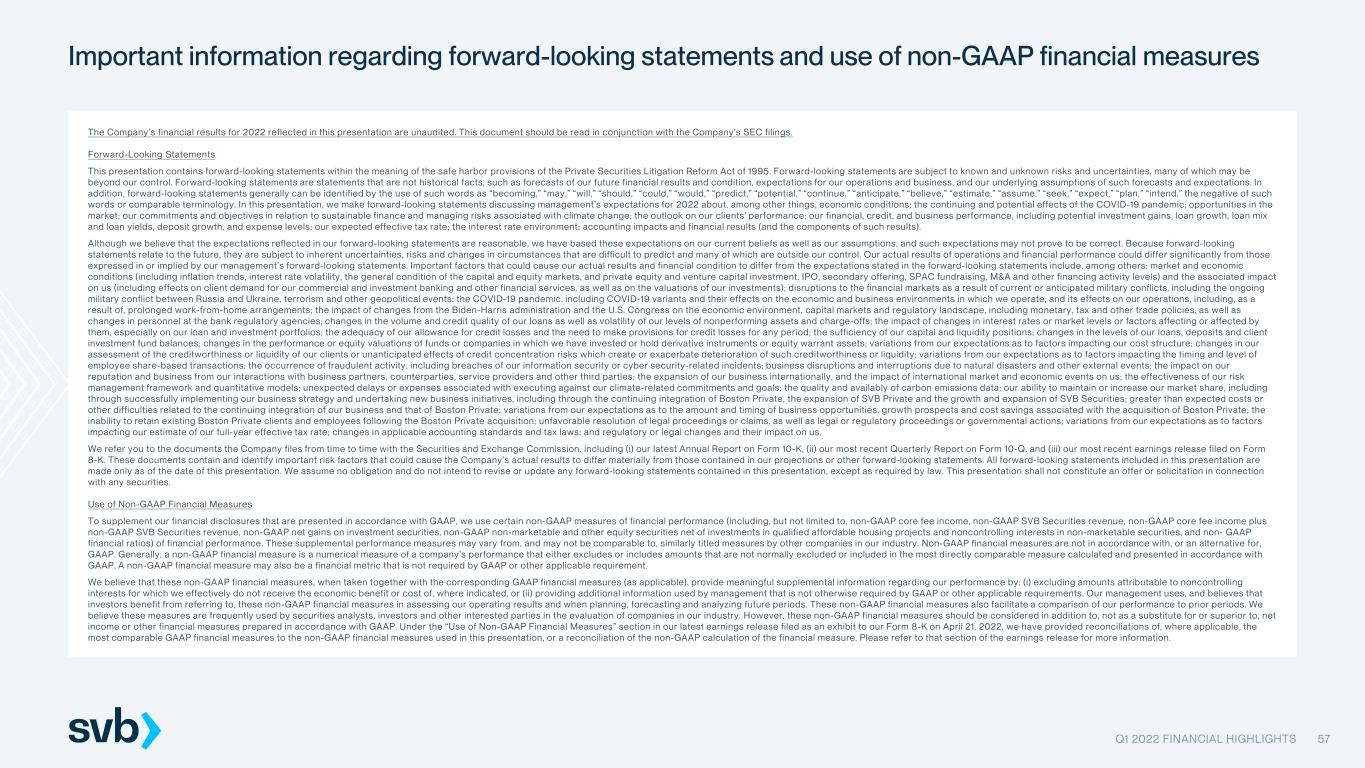
Important information regarding forward-looking statements and use of non-GAAP financial measures The Company’s financial results for 2022 reflected in this presentation are unaudited. This document should be read in conjunction with the Company’s SEC filings. Forward-Looking Statements This presentation contains forward-looking statements within the meaning of the safe harbor provisions of the Private Securities Litigation Reform Act of 1995. Forward-looking statements are subject to known and unknown risks and uncertainties, many of which may be beyond our control. Forward-looking statements are statements that are not historical facts, such as forecasts of our future financial results and condition, expectations for our operations and business, and our underlying assumptions of such forecasts and expectations. In addition, forward-looking statements generally can be identified by the use of such words as “becoming,” “may,” “will,” “should,” “could,” “would,” “predict,” “potential,” “continue,” “anticipate,” “believe,” “estimate,” “assume,” “seek,” “expect,” “plan,” “intend,” the negative of such words or comparable terminology. In this presentation, we make forward-looking statements discussing management’s expectations for 2022 about, among other things, economic conditions; the continuing and potential effects of the COVID-19 pandemic; opportunities in the market; our commitments and objectives in relation to sustainable finance and managing risks associated with climate change; the outlook on our clients' performance; our financial, credit, and business performance, including potential investment gains, loan growth, loan mix and loan yields, deposit growth, and expense levels; our expected effective tax rate; the interest rate environment; accounting impacts and financial results (and the components of such results). Although we believe that the expectations reflected in our forward-looking statements are reasonable, we have based these expectations on our current beliefs as well as our assumptions, and such expectations may not prove to be correct. Because forward-looking statements relate to the future, they are subject to inherent uncertainties, risks and changes in circumstances that are difficult to predict and many of which are outside our control. Our actual results of operations and financial performance could differ significantly from those expressed in or implied by our management’s forward-looking statements. Important factors that could cause our actual results and financial condition to differ from the expectations stated in the forward-looking statements include, among others: market and economic conditions (including inflation trends, interest rate volatility, the general condition of the capital and equity markets, and private equity and venture capital investment, IPO, secondary offering, SPAC fundraising, M&A and other financing activity levels) and the associated impact on us (including effects on client demand for our commercial and investment banking and other financial services, as well as on the valuations of our investments); disruptions to the financial markets as a result of current or anticipated military conflicts, including the ongoing military conflict between Russia and Ukraine, terrorism and other geopolitical events; the COVID-19 pandemic, including COVID-19 variants and their effects on the economic and business environments in which we operate, and its effects on our operations, including, as a result of, prolonged work-from-home arrangements; the impact of changes from the Biden-Harris administration and the U.S. Congress on the economic environment, capital markets and regulatory landscape, including monetary, tax and other trade policies, as well as changes in personnel at the bank regulatory agencies; changes in the volume and credit quality of our loans as well as volatility of our levels of nonperforming assets and charge-offs; the impact of changes in interest rates or market levels or factors affecting or affected by them, especially on our loan and investment portfolios; the adequacy of our allowance for credit losses and the need to make provisions for credit losses for any period; the sufficiency of our capital and liquidity positions; changes in the levels of our loans, deposits and client investment fund balances; changes in the performance or equity valuations of funds or companies in which we have invested or hold derivative instruments or equity warrant assets; variations from our expectations as to factors impacting our cost structure; changes in our assessment of the creditworthiness or liquidity of our clients or unanticipated effects of credit concentration risks which create or exacerbate deterioration of such creditworthiness or liquidity; variations from our expectations as to factors impacting the timing and level of employee share-based transactions; the occurrence of fraudulent activity, including breaches of our information security or cyber security-related incidents; business disruptions and interruptions due to natural disasters and other external events; the impact on our reputation and business from our interactions with business partners, counterparties, service providers and other third parties; the expansion of our business internationally, and the impact of international market and economic events on us; the effectiveness of our risk management framework and quantitative models; unexpected delays or expenses associated with executing against our climate-related commitments and goals; the quality and availably of carbon emissions data; our ability to maintain or increase our market share, including through successfully implementing our business strategy and undertaking new business initiatives, including through the continuing integration of Boston Private, the expansion of SVB Private and the growth and expansion of SVB Securities; greater than expected costs or other difficulties related to the continuing integration of our business and that of Boston Private; variations from our expectations as to the amount and timing of business opportunities, growth prospects and cost savings associated with the acquisition of Boston Private; the inability to retain existing Boston Private clients and employees following the Boston Private acquisition; unfavorable resolution of legal proceedings or claims, as well as legal or regulatory proceedings or governmental actions; variations from our expectations as to factors impacting our estimate of our full-year effective tax rate; changes in applicable accounting standards and tax laws; and regulatory or legal changes and their impact on us. We refer you to the documents the Company files from time to time with the Securities and Exchange Commission, including (i) our latest Annual Report on Form 10-K, (ii) our most recent Quarterly Report on Form 10-Q, and (iii) our most recent earnings release filed on Form 8-K. These documents contain and identify important risk factors that could cause the Company’s actual results to differ materially from those contained in our projections or other forward-looking statements. All forward-looking statements included in this presentation are made only as of the date of this presentation. We assume no obligation and do not intend to revise or update any forward-looking statements contained in this presentation, except as required by law. This presentation shall not constitute an offer or solicitation in connection with any securities. Use of Non-GAAP Financial Measures To supplement our financial disclosures that are presented in accordance with GAAP, we use certain non-GAAP measures of financial performance (including, but not limited to, non-GAAP core fee income, non-GAAP SVB Securities revenue, non-GAAP core fee income plus non-GAAP SVB Securities revenue, non-GAAP net gains on investment securities, non-GAAP non-marketable and other equity securities net of investments in qualified affordable housing projects and noncontrolling interests in non-marketable securities, and non- GAAP financial ratios) of financial performance. These supplemental performance measures may vary from, and may not be comparable to, similarly titled measures by other companies in our industry. Non-GAAP financial measures are not in accordance with, or an alternative for, GAAP. Generally, a non-GAAP financial measure is a numerical measure of a company’s performance that either excludes or includes amounts that are not normally excluded or included in the most directly comparable measure calculated and presented in accordance with GAAP. A non-GAAP financial measure may also be a financial metric that is not required by GAAP or other applicable requirement. We believe that these non-GAAP financial measures, when taken together with the corresponding GAAP financial measures (as applicable), provide meaningful supplemental information regarding our performance by: (i) excluding amounts attributable to noncontrolling interests for which we effectively do not receive the economic benefit or cost of, where indicated, or (ii) providing additional information used by management that is not otherwise required by GAAP or other applicable requirements. Our management uses, and believes that investors benefit from referring to, these non-GAAP financial measures in assessing our operating results and when planning, forecasting and analyzing future periods. These non-GAAP financial measures also facilitate a comparison of our performance to prior periods. We believe these measures are frequently used by securities analysts, investors and other interested parties in the evaluation of companies in our industry. However, these non-GAAP financial measures should be considered in addition to, not as a substitute for or superior to, net income or other financial measures prepared in accordance with GAAP. Under the “Use of Non-GAAP Financial Measures” section in our latest earnings release filed as an exhibit to our Form 8-K on April 21, 2022, we have provided reconciliations of, where applicable, the most comparable GAAP financial measures to the non-GAAP financial measures used in this presentation, or a reconciliation of the non-GAAP calculation of the financial measure. Please refer to that section of the earnings release for more information. Q1 2022 FINANCIAL HIGHLIGHTS 57
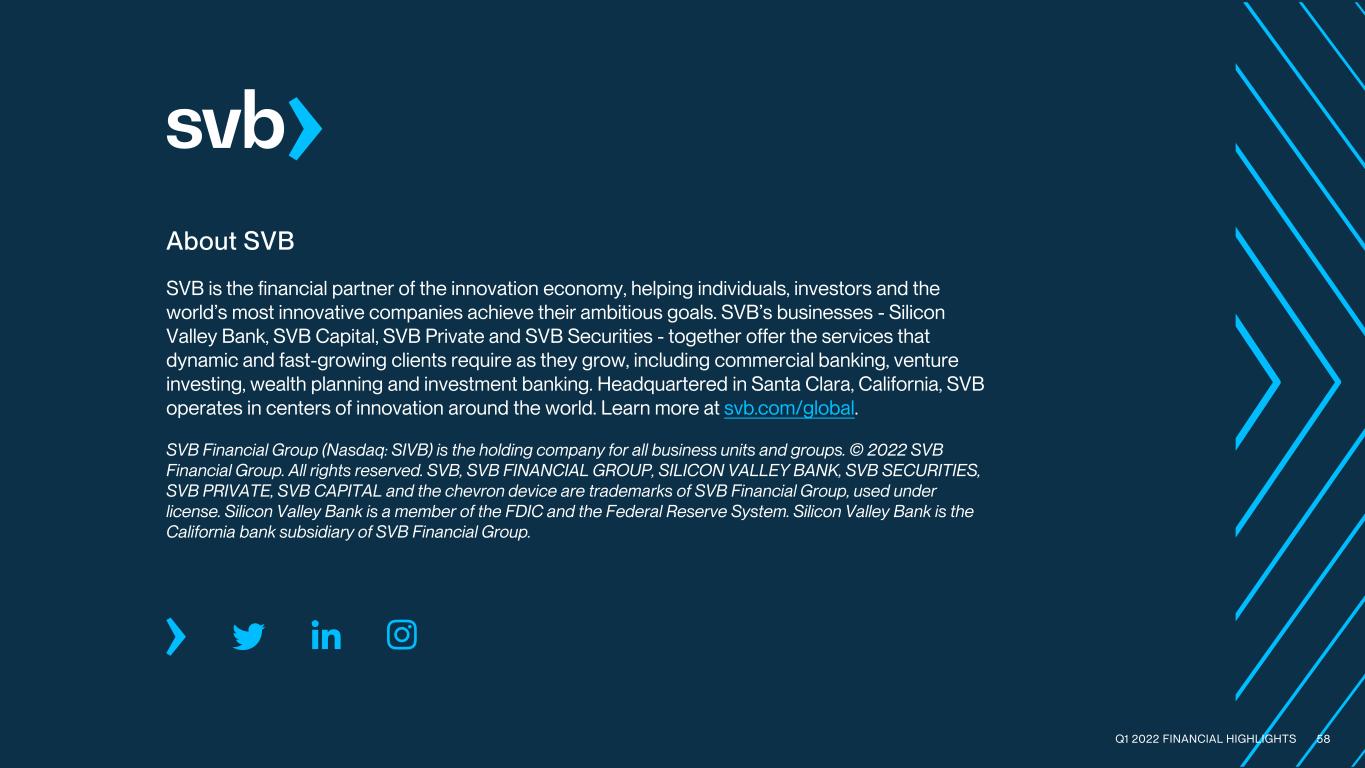
About SVB SVB is the financial partner of the innovation economy, helping individuals, investors and the world’s most innovative companies achieve their ambitious goals. SVB’s businesses - Silicon Valley Bank, SVB Capital, SVB Private and SVB Securities - together offer the services that dynamic and fast-growing clients require as they grow, including commercial banking, venture investing, wealth planning and investment banking. Headquartered in Santa Clara, California, SVB operates in centers of innovation around the world. Learn more at svb.com/global. SVB Financial Group (Nasdaq: SIVB) is the holding company for all business units and groups. © 2022 SVB Financial Group. All rights reserved. SVB, SVB FINANCIAL GROUP, SILICON VALLEY BANK, SVB SECURITIES, SVB PRIVATE, SVB CAPITAL and the chevron device are trademarks of SVB Financial Group, used under license. Silicon Valley Bank is a member of the FDIC and the Federal Reserve System. Silicon Valley Bank is the California bank subsidiary of SVB Financial Group. Q1 2022 FINANCIAL HIGHLIGHTS 58
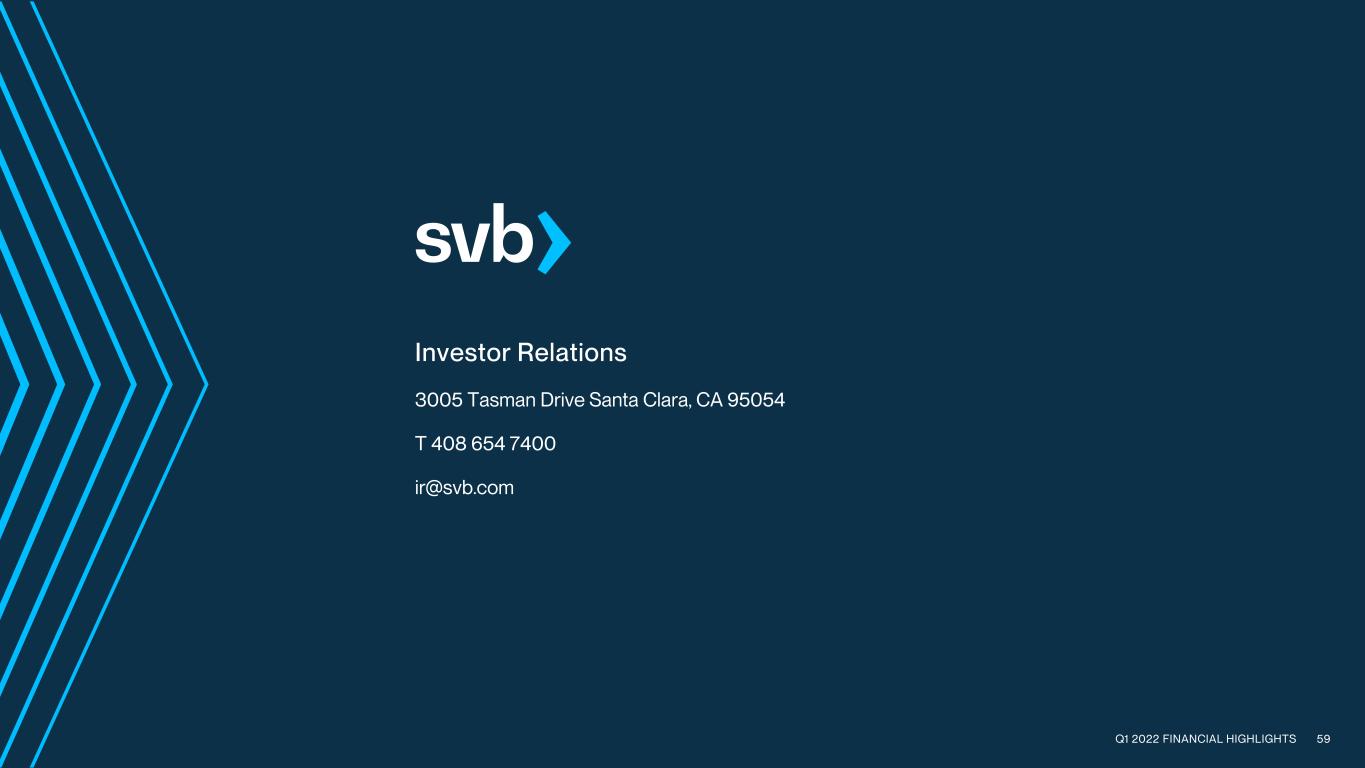
Investor Relations 3005 Tasman Drive Santa Clara, CA 95054 T 408 654 7400 ir@svb.com Q1 2022 FINANCIAL HIGHLIGHTS 59






























































